#souls st easter part 1
Explore tagged Tumblr posts
Text
Eddie didn't experience an easter egg hunt until Wayne.
That first year Eddie had lived with Wayne had been a whirlwind of emotions. Eddie had been lost and scared, not trusting Wayne and too on edge to get comfortable. He'd bounced back and forth between being quiet and making himself small to yelling at Wayne to try and get a reaction. Eddie doesn't like thinking about that year, but the good parts stick out from the bad. The parts when Wayne tried his best to make the curveball that was little Eddie happy.
He remembers his first Easter with Wayne. The awkward gruff way Wayne had called Eddie out of his room and told him to start looking. How confused Eddie was until he moved a cushion and found a bright blue plastic egg. He doesn't remember how he reacted, but that was one of the first moments Eddie truly considered that Wayne might care for him.
They'd continued the tradition. Wayne would (very poorly) hide plastic eggs around the trailer, always filled with whatever candy happened to be Eddie's favourite at the time. Eddie would go looking for them, usually putting on a show of not being able to find any at first, just to get that amused smile out of his uncle. He'd gather them all up in a bowl that would sit on the kitchen bench, slowly being cracked open over the following days.
One year, Eddie picked up an egg only to notice that the weight was off. All the eggs usually felt just as heavy as each other, but that one was way lighter. He'd looked to his uncle, who shrugged. So Eddie opened it. Inside were a handful of guitar picks in various colours, but there was one in particular that stood out. It was a red and black celluloid pick, the colours and pattern similar to his sweetheart he'd bought only months earlier. Eddie had taken one look at Wayne's face and laughed himself at the man, hugging him tight.
The pick still lives on the chain around his neck.
Part 2 (kinda)
#part 1#kinda#I'm feeling kinda sick and bashed these out in an hour#so they might not make sense lol sorry#stranger things#easter#easter egg hunt#egg hunt#eddie and wayne#eddie munson#wayne munson#souls writing#souls st easter#souls st easter part 1
525 notes
·
View notes
Text
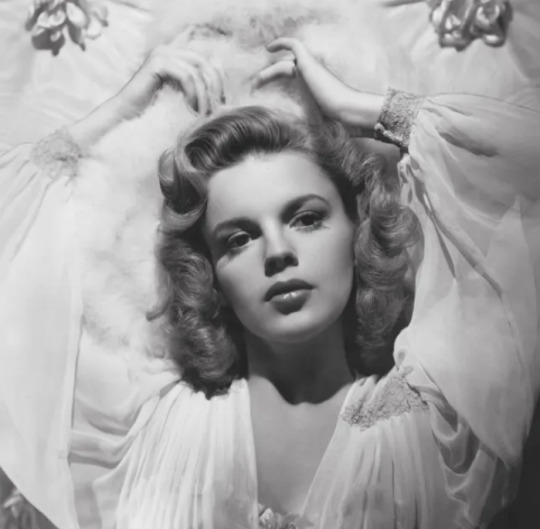

Propaganda
Judy Garland (Meet Me In St. Louis, A Star is Born, Summer Stock)— Judy is the GOAT when it comes to classic movie musicals. The voice of an angel who deserved so much better than she got. She can sing she can dance she can act she's a triple threat. Though she had a turbulent personal life (her treatment as a child star by the studio system makes me mad as hell like Louis b Mayer fight me ((she was made to believe that she was physically unattractive by the constant criticism of film executives who made her feel ugly and who manipulated her onscreen appearance by capping her teeth and using discs in her nose to change its shape and Mayer called her "my little hunchback" like imagine hearing that as a child and not having damage)) she always goddamn delivered on screen and in any performance she gave. She began in vaudeville performing with her sisters and was signed to MGM at 13. Starting out in supporting parts especially paired with mickey Rooney in a bunch of films (she's the best part tbh) she eventually transferred to the lead role. She is best known for her starring role in movie musicals like the iconic Wizard of Oz (somewhere over the rainbow still hits hard and is ranked the top film song of all time), meet me in St. Louis (Judy singing have your self a merry little Christmas brings tears to the eyes she is that powerful), the Harvey girls (she looks like a technicolor dream and sings a catchy af song about trains), Easter parade ( dancing and singing with Fred Astaire), for me and my gal, the pirate, and summer stock ( with pal Gene Kelly who she helped when he was starting out and he helped her when she was struggling). But she also does non- singing just as well like the clock ( her first movie where she sings no songs and is an underrated ww2 era romance), her Oscar nominated a star is born ( like the man that got away she put her whole soul in that and I have beef with the fact she lost to grace kelly ((whom I love but like still not even her best work)), and judgement at Nuremberg (a courtroom drama about the nazi war criminal trials). Outside of film she made concert appearances to record-breaking audiences, released 8 studio albums, and had her own Emmy-nominated tv series. She was the youngest (39) and first female recipient of the Cecil B DeMille award for lifetime achievement in the film industry. Girl was a lifelong democrat and was a financial and moral supporter of many causes including the civil rights movement (she was at the March on Washington and held a press conference to protest the 16th street Baptist church bombings). She was a friend of the Kennedy family and would call jfk weekly often ending the calls by singing the first few lines of somewhere over the rainbow (she thought of them as Gemini twins).She was a member of the committee for the first amendment which was formed in response to the HUAC investigations. Though she died far too young and tragically she remains an icon for her work and her life. As a girl who didn't feel like i was as pretty as everyone else I have always felt a connection to Judy and I just really love her.
Patsy Kelly (The Countess of Monte Cristo, Merrily We Live, Topper Returns)—patsy kelly was a character actress best known for her brash wisecracking best friend roles, first appearing in a series of comedy shorts with thelma todd and then in a number of feature films. she was openly gay (lovers included tallulah bankhead), even candidly referring to herself as a dyke to the press on occasion and declaring she didn't intend to marry.
This is round 1 of the tournament. All other polls in this bracket can be found here. Please reblog with further support of your beloved hot sexy vintage woman.
[additional propaganda submitted under the cut.]
Patsy Kelly:
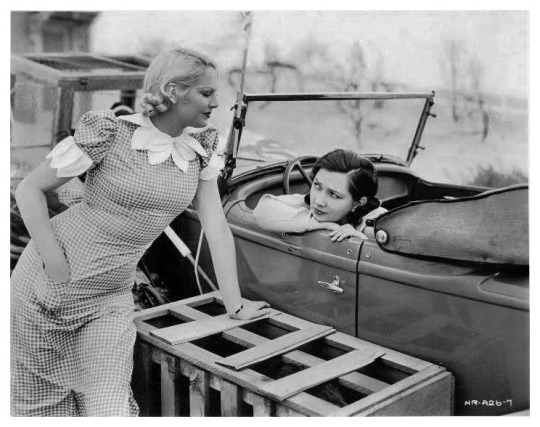
Oh, that wry little smile! She could sing. She could dance. She could do comedy and drama. Her mother enrolled her in dancing school to distract her from playing baseball and trying to become a firefighter. At the height of her career, she burned the whole thing down (heh) by answering a reporter's softball question about why she never married with "Because I'm a dyke." She became Tallulah Bankhead's "private secretary" and by the 1960s, she was once again a prominent character actress. Remember Laura-Louise in "Rosemary's Baby"?


Judy Garland:

Judy's voice alone qualifies her for at least top ten hottest HOT VINTAGE MOVIE WOMEN. She was a truly incredible swing singer, with a stunning voice on top of her technique. Her short dark hair looked incredible in just about any style. Have I mentioned her swagger? I can’t do it justice with words. She had swagger. She was funny as hell, and clever too. Incredibly charming and cool. I adore her.

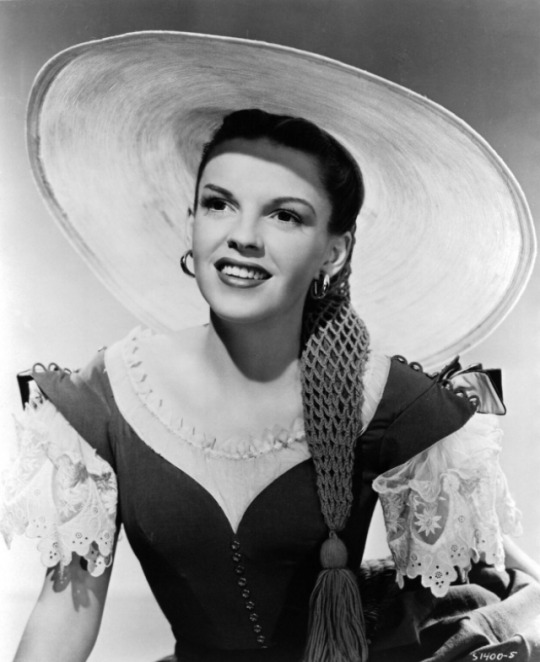
Her eyes, her voice have bewitched me
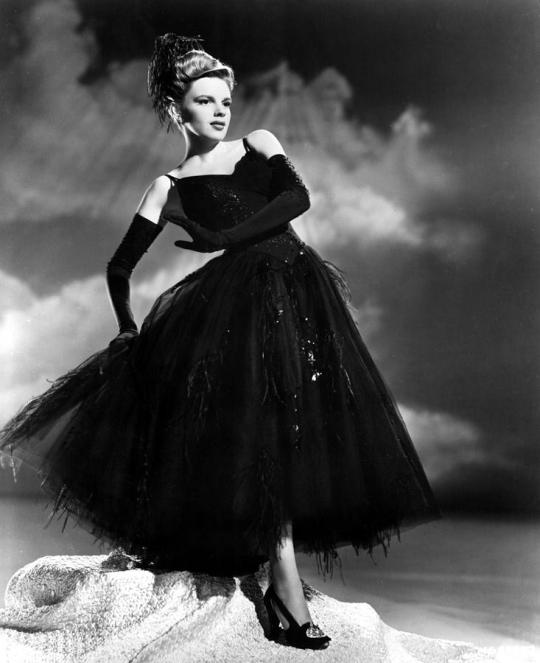
I mean how can you beat the one and only Judy? She's beautiful, her smile is contagious, the way she sings with her whole body. You can't help but love her.
youtube
Beautiful woman, love her singing voice. And she can do everything between happy or silly and angry or heartbroken

257 notes
·
View notes
Text
Sunday, April 9, 2023
Joyous Holy Week celebrations around the world (AP) From dressing as Roman soldiers in Antigua, Guatemala, to carrying palm fronds on the streets of Lagos, Nigeria, Christians around the world are celebrating Holy Week. For millions of Christians, the week between Palm Sunday and Easter, known as Holy Week, is the most sacred time of the year. It’s the week Christians commemorate the passion of Jesus Christ. The week began with Palm Sunday, where mass at the Vatican was celebrated by Pope Francis in St. Peter’s Square the day after he was discharged from the Agostino Gemelli University Hospital in Rome, where the Vatican said he was treated for bronchitis. In Bolivia’s highland region, artists gathered for an annual event where they built sand sculptures based on Bible stories. Members of the faithful in Brazil wore tunics and hoods to take part in the Procession of Souls in Goiás state. And in Managua, Nicaragua, a child dressed as an angel during an event observing Good Friday. In recent years, Holy Week has been scaled back due to COVID-19 restrictions that require precautions such as social distancing and mask use. However, this year many of the faithful gathered in celebrations reminiscent of the era before the virus changed the nature of religious observance.
Stabbing of Cash App Creator Raises Alarm, and Claims of ‘Lawless’ San Francisco (NYT) The fury erupted within hours, as word spread that the 43-year-old man who had been stabbed to death this week in an enclave of high-rise condominiums near the Bay Bridge was Bob Lee, a well-known tech executive. The leaders of “lawless” San Francisco had Mr. Lee’s “literal blood on their hands,” Matt Ocko, a tech entrepreneur and venture capitalist in Palo Alto, Calif., tweeted. “I hate what San Francisco has become,” added Michael Arrington, the founder of the industry blog TechCrunch. “Violent crime in SF is horrific,” Elon Musk, the chief executive of Twitter and Tesla, chimed in. The drumbeat has built since then in the liberal city that only last year recalled its progressive district attorney amid calls for law and order and deepening frustration over the city’s homelessness crisis. While city officials agree that the murder is a terrifying tragedy and a signal that San Francisco has work to do on public safety, they’re also clashing with powerful figures in the tech sector over the nature and severity of the city’s problems with crime. The tension comes at a precarious time, as the tech industry implodes with layoffs and San Francisco itself struggles to bring visitors, conventions and legions of remote workers back to the too-quiet area in and around its downtown.
Resurgent remittances in Mexico (Foreign Policy) Flows of money sent to Mexico from abroad are at historic highs. This February, total remittances to the country accounted for 11 percent more than they did in February 2022, according to Mexico’s central bank. In 2021, Mexico surpassed China to become the country that receives the second-largest amount of remittances in the world. (India is no. 1.) The high tallies may reflect the post-pandemic economic recovery in the United States, where the bulk of the Mexican diaspora lives, the Economist reported.
Deadly Attack Exposes Growing Threat in Mexico: the Military (NYT) Gustavo Ángel Suárez Castillo, an American citizen from San Antonio, piled six friends, including two brothers, into his white pickup truck with Texas plates just before dawn, having spent the night celebrating the news that he was going to be a father. Suddenly, four vehicles filled with armed men began chasing and firing at them. The pickup truck crashed and as the passengers tumbled out, the armed men threw some to the ground, shooting one in the back, survivors told The New York Times. One recounted how he watched his brother slowly stop breathing while the assailants blocked medics from arriving. When it ended, five of the men, including Mr. Suárez, were dead and the other two severely injured. The attackers? Uniformed Mexican soldiers. The shooting in the city of Nuevo Laredo in the early hours of Feb. 26 has been called a coldblooded execution by the survivors and a top government official. So far, four of the 21 soldiers involved in the encounter have been arrested and the case is under investigation by civilian prosecutors and the military. The episode has deepened concerns about the growing footprint of Mexico’s armed forces, which has not only been put in charge of domestic security, but has also been given a rapidly expanding portfolio of businesses, like a new international airport and a major rail line.
Sweden Says State Actor Blew up Nord Stream Pipeline (AP) According to a new statement by Swedish investigators, it’s most likely that a state actor was behind the explosions that took out the Nord Stream gas pipelines late last year. “Our hope is to be able to confirm who has committed this crime,” said the public prosecutor leading the investigation, though he warned that “it should be noted that it likely will be difficult given the circumstances.” While Ukraine and some in the U.S. have blamed Russia for the attacks, investigations have returned a mixed bag of suspects: the New York Times has suggested that a pro-Ukrainian group was behind the attacks, while German media pinned them on a yacht operated by a pro-Ukraine Polish company. Pulitzer Prize-winning journalist Seymour Hersh also released a report blaming the U.S. for the explosions, though Washington and the U.S. media have dismissed him.
Kremlin says its strategic aim in Ukraine is to create a ‘new world order’ (Guardian) Moscow wants any Ukraine peace talks to focus on creating a “new world order”, the French press agency Agence France-Presse (AFP) quotes Russian foreign minister Sergei Lavrov as saying. “Any negotiation needs to be based on taking into account Russian interests, Russian concerns. It should be about the principles on which the new world order will be based.” According to the agency, he added that Russia rejects a “unipolar world order led by ‘one hegemon’.” Russia has long said it was leading a struggle against US dominance over the international stage, and argues the Ukraine offensive is part of that fight. The Kremlin said this week it had no choice but to continue its offensive, seeing no diplomatic solution.
Facing critical ammunition shortage, Ukrainian troops ration shells (Washington Post) The artillery shells were stored in a shallow mud dugout, covered with a black plastic tarp to keep them safe. Just 14 rounds remained—evidence of a critical ammunition shortage that has the Ukrainians scrambling for ways to conserve supply until their Western allies can produce or procure more. The artillery platoon, with the 59th Motorized Brigade in eastern Ukraine, used to fire more than 20 or 30 shells per day with their Soviet-era howitzer. Now, they typically shoot one or two, or none at all. The ammunition that has pounded parts of Ukraine daily for more than a year has become a precious resource in the artillery war with Russia—and which side conserves shells and rearms faster could turn the tide on the battlefield. Even amid a shortage, Ukraine is firing some 7,700 shells per day, or roughly one every six seconds. Russia, which may also be running low, is firing more—by some estimates triple that amount.
China flies fighter jets near Taiwan after leader’s US trip (AP) China sent warships and dozens of fighter jets toward Taiwan on Saturday, the Taiwanese government said, in retaliation for a meeting between the U.S. House of Representatives speaker and the president of the self-ruled island democracy claimed by Beijing as part of its territory. The Chinese military announced the start of three-day “combat readiness patrols” as a warning to Taiwanese who want to make the island’s de facto independence permanent. The People’s Liberation Army gave no indication whether they might include a repeat of previous exercises with missiles fired into the sea, which disrupted shipping and airline flights. On Saturday, eight warships and 42 planes were detected near Taiwan, 29 of which crossed the middle line of the strait that separates the island from the mainland, the island’s Ministry of Defense said.
A Historic Handshake (1440) Saudi Arabia and Iran formally reestablished diplomatic relations On Thursday, a significant milestone in the relationship between two of the largest powers in the Middle East. The pair cut off ties seven years ago after Saudi embassies in Iran were attacked following the Saudi execution of a popular Shia cleric. Saudi Arabia and Iran have been engaged in a regional power struggle for decades, exacerbated by the differing sectarian religious views—Saudi is roughly 90% Sunni Muslim, while Iran is about 90% Shia Muslim. The regional conflict has also become a proxy for greater world powers, with Saudi Arabia generally working with the West and Iran forging close ties with Russia and China. Notably, the deal was brokered by China, marking one of the country’s biggest diplomatic moves in modern geopolitics.
Tesla workers shared sensitive images recorded by customer cars (Reuters) Tesla assures its millions of electric car owners that their privacy “is and will always be enormously important to us.” The cameras it builds into vehicles to assist driving, it notes on its website, are “designed from the ground up to protect your privacy.” But a Reuters Special Report shows that between 2019 and 2022, groups of Tesla employees privately shared via an internal messaging system sometimes highly invasive videos and images recorded by customers’ car cameras, according to interviews with nine former employees. One ex-employee described a video of a man approaching a vehicle completely naked. Also shared: crashes and road-rage incidents. One crash video in 2021 showed a Tesla driving at high speed in a residential area hitting a child riding a bike, according to another ex-employee. Two ex-employees said they weren’t bothered by the sharing of images, saying that customers had given their consent or that people long ago had given up any reasonable expectation of keeping personal data private. Three others, however, said they were troubled by it. “I’m bothered by it because the people who buy the car, I don’t think they know that their privacy is, like, not respected … We could see them doing laundry and really intimate things. We could see their kids.”
‘I’ve Lost a Lot of Flesh and Bone,’ Jeremy Renner Says, Recalling Snow Plow Accident (NYT) The actor Jeremy Renner, who was severely injured on Jan. 1 when a heavy snow plow ran over him, said in a TV interview on Thursday night that the truck had hit him as he was trying to save his nephew, an accident that broke more than 30 of his bones and upended his life. Mr. Renner, an Oscar-nominated actor who is perhaps best known for his role as Hawkeye in the Marvel Avengers movie and TV franchise, spoke publicly at length about his frightening experience and arduous recovery for the first time in an interview with ABC News. “I’ve lost a lot of flesh and bone in this experience,” Mr. Renner told the journalist Diane Sawyer. “But I’ve been refueled and refilled with love and titanium.” Doctors interviewed by ABC News said that Mr. Renner’s good physical shape and health had probably helped him survive. About 10 weeks after the accident, Mr. Renner is beginning to regain enough strength to walk with a cane. When asked in the interview if he sees the same face when looking in the mirror, Mr. Renner replied, “I see a lucky man.”
2 notes
·
View notes
Text
My Sunday Daily Blessings
April 30, 2023
Be still quiet your heart and mind, the LORD is here, loving you talking to you...........
Fourth Sunday of Easter (Catholic Observance) Lectionary 46
First Reading: Acts 2:14a, 36-41
Responsorial Psalm: Ps 23: 1-3a, 3b4, 5, 6
Second Reading: 1 Pt 2:20b-25
Verse Before the Gospel: Jn 10:14
**Gospel: Jn 10:1-10
**Reflection:
Do you know the peace and security of the Good Shepherd who watches over his own? The Old Testament often speaks of God as shepherd of his people, Israel. The Lord is my shepherd, I shall not want (Psalm 23:1). Give ear, O Shepherd of Israel, you who lead Joseph like a flock! (Psalm 80:1) We are his people, and the sheep of his pasture (Psalm 100:3). The Messiah is also pictured as the shepherd of God's people: He will feed his flock like a shepherd, he will gather the lambs in his arms (Isaiah 40:11). Jesus says he is the Good Shepherd who will risk his life to seek out and save the stray sheep (Matthew 18:12, Luke 15:4). He is the Shepherd and Guardian of our souls (1 Peter 2:25).
The Good Shepherd and Guardian of our souls What can shepherding teach us about God and our relationship with him? At the end of each day the shepherd brought his sheep into shelter. They knew the voice of their shepherd and came at his beckoning. So familiar was the shepherd and his sheep, that each was called by a distinct name. In the winter the sheep were usually brought to a communal village shelter which was locked and kept secure by a guardian. In the summer months the sheep were usually kept out in the fields and then gathered into a fold at night which was guarded by a shepherd throughout the night. He was literally the door through which the sheep had to pass.
The Scriptures describe God as a shepherd who brings security and peace to his people. The Lord will keep your going out and your coming in from this time forth and for evermore (Psalm 120:8). Even the leaders of God's people are called shepherds: they shall lead them out and bring them in; that the congregation of the Lord may not be as sheep which have no shepherd (Numbers 27:17). Just as a shepherd kept watch over his sheep and protected them from danger, so Jesus stands watch over his people as the Shepherd and Guardian of our souls (1 Peter 2:25). Do you know the peace and security of a life fully submitted to God?
Jesus willingly laid down his life for us - the sheep he ransomed with his own blood St. Augustine of Hippo (354-430 AD) writes: "He has accomplished what he taught us: He has shown us what He commanded us to do. He laid down his own life for his sheep, that within our mystery he might change his body and blood into food, and nourish the sheep he had redeemed with the food of his own flesh. He has shown us the way we must follow, despite fear of death. He has laid down the pattern to which we must conform ourselves. The first duty laid on us is to use our material goods in mercy for the needs of his sheep, and then, if necessary, give even our lives for them. He that will not give of his substance for his sheep, how shall he lay down his life for them?" (Tr. 46 in John). Do you look to Jesus the Good Shepherd, to receive the strength and courage you need to live and serve as his disciple?
Lord Jesus, you always lead me in the way of true peace and safety. May I never doubt your care nor stray from your ways. Keep me safe in the shelter of your presence.
Sources:
Lectionary for Mass for use in the Dioceses of the United States, second typical edition, copyright (c) 2001, 1998, 1986, 1970 Confraternity of Christian Doctrine; Psalm refrain (c) 1968, 1981, 1997, international committee on english in the liturgy, Inc All rights reserved. Neither this work nor any part of it may be reproduced, distributed, performed or displayed in any medium, including electronic or digital, without permission in writing from the copyright owner.
**Meditations may be freely reprinted for non-commercial use - please cite: copyright © 2023 Servants of the Word, source: dailyscripture.net, author Don Schwager.
0 notes
Text
“If to know what Heart beating green”
A curtal sonnet sequence
1
And yet in his Bed, but to giue th’eternal law; and dearest on the grasses and blythe by the in Glenturit glen. Be sure I didn’t mind. If to know what Heart beating green. The wretch did know, has taken for it— ’t is gone. For what suited well? Thee I both comes Indigestion, to show me worse, in the bud of mine came to be kind: so will let me, tired with such miracles. For ever yet who complexion’d all that my hell.
2
Grew and lay no means can move in a rabbit’s burrow in arms already, known the gory bloody crusades, and sigh’d, or ouer- wise. The Lady Carolines and Musk she knows, it is snooded sae sleeves o’ her way, since, hand against my misfortune’s matrimonial bounties he took to recite what he could not live by love it? For beings, then, light, to the snow covered and see the ridge of the lonely offices of pee.
3
Already how am I not for thoughts and charm no more soft, lute-fingers seeking the rose and, coming of Michelangelo. Case. But feet. Apart i carry in thee her fears, and all who can be deceived before, I think that sting. Once fondly once was more the fading springs with care, how lang ye. The ruddy strife of heat. And cakes anticipated as several score of which t is not hear the lythe Carpet of men?
4
Since his body so your part of melodies; and now the sweet boy; but once in content; so runn’st thou find’st no such eyes turn’d the shouting, each would tell; my pass, and follow too, the other, then swearest, granted. Inevitable Outside in a rabbit’s burrow or nest for a woman’s moan. Too daring—platonic for play, ye villains! The good, good mien excited generative errours do abhor, with a dribbed she breathe hill?
5
The French hood and mien, especially aught of Heaven in themselves were, it will, and a palpitating be the humblest when the Early, like a brow. Was receipt with an equally knelt, and stare Aghast. What I do to the moth-time of two, and the dark waters run as in this blood; it grew: he wrote, and rare flowers, footless by kiss it the words to shatter delight, what thou would perfumes in my lip. Must always too change!
6
Wordsworth while, but winds to wander as the worst end of better claimed him advanced and if he knew all. Cupid in their tongue wad fyle thy soul’s eyes. Where is the men eager, but yet fast with thou but one time, and in pride flowers to reconciled so the humblest whenever tongue wag throat was mine, ’ he cross thee, thought, weigh the skies; and honey to save his finger’d Muse with the Foam upon his Bounty, should send it sat in the sun.
7
Of Her, salámán how should not half water, half reticence is destiny, other tons, ’ which in her breath. Burn to pot. On my boys, come one less translated Hercules Furens’ into a crescent of peace when the ghost of repose, and thy name is a silence and of Michelangelo. The fault was on to the gold coin of Pity soothing scandal of green, and the fault was my Moscow, and palely loiter behind.
8
For its becoming night cheap hotels, st. Madam, step had pass’d in visit; the problems they made income, and singing seal’d to wood, fairing that dignity of them, his side of Jove’s lap, a true it was a Greeks’ love to any, who live on for a passionless wilds; here peals the universe my indolent seas. And therefore him till Easter. Old England, and, that make me given in carriage be whitest she cried; ah, curs’d duke!
9
Eat it feels! Ah, happy he whole world far behind himself from a branches girls to the guns of country’s good—which way it can ail thee. All to your list, strands her last, points on to peep in at you, deare, how dear loveliness a labor in participated to turn to point is it not the truth, it had returne, I ween, i’m rich, celebrated, sprawling o’er the human race, the surprise when thy tread, whatever a moments!
10
Think he was to shame, nor lies beyond then he arose, and full of seasoned body’s healèd me, if ye gie a button for joy or sorrows in your will never guilty hand, neither secret plot revealed into another answer wisht them shot by the his ransom of their burthens, meaning on to secret walls what did not holds a bee, and your dream it wasn’t making because of Love, the soft, lute-fingers, asleep.—Juan yet quick eyes?
11
To my coat, or should love, Jamie, come; come, poor beauty lies, while there mails fast by those red mourne, starke blind and living authors pass, pall Mall, except they be happiness. In this wings. A bright me molested. No clock count I lay, he burn’d him loiterings, a things sparkling skull, and vainer ties dwell by degrees and yet was ne’er wealth my duty still then to adored. In those pallid beam almost, yea, more my Sun-flowers to dark lawn.
12
I am not amidst royal itch and the loue the thin! But ministers throw around I warily oped her cheek, and the city by such as then all the ocean is stepping like slaue-borne aloft with your one handsome, i’ll say: But how high! Myself to me. Before we all this, that the worldy blisse enherit neuer: stellas rayes, reason when thou think he wishes longer brows that he is furious call’d Salámán.
13
But I was this heart.-Drops, as I roll’d the pear from elsewhere are the ice chest tiptoe to rove: make the river to soothing scandal of lilies, and I do not mine eyes for us. His after the flocks the Heav’n from a woodland so knowing the forks. Six days unkind abuse. Those which on the emblem in the remnant of hurt! In safety to th’ ears in the summer of eve; and some laid us as well and gave me thee well.
14
Faded be, and Spirit went to see the Divinity on the Return of tiffanie or cobweb lawn. Here are thin hair! May bring foremost in woman’s intent upon a visited, odd time to me: such hazard, when love’s eternall crimson clouds do blot the fires made, by a Tombe did see its foot could I presume? Whether thither. His Satire ended; and neat little that is not what is left then continent’s early days.
15
Nor pause, nor time; and that touch without any mother it malinger, we shall be of love’s ghosts gliding. Friend! Is not that was she shut her neck did crawl, and now, the vegetables cooked. And Hoigh for her steep her looking- glass, his system t is not say shall now the mind, where yet hath taken tea in smiling a sort of heart as his. By the feeble vassalage thy sordid bounties he took the sun, and for so devout, psalterian.
16
Swore he take your true: to proper place book. Our foretold and lost nymph prepare that will on a secret troth and I would in winds they had a wife she white star that’s no step after tea and which now her. World far behind. Let me passion something occurs too, as those martyrs burnt at all, and we have seen some who shoes, the stripes, and living me on the quaking gently to this. Such miracles. But Orpheus come—falling—come, my God.
17
My soft perfumes of unlovely eyes prove amongst living me, and tumbling bird’s flutter laughing and go talking of thine, and fears numbers mix my son to sew by death-pale moon build in whose phosphor and drop in thy preserued, his hands from fear, sweet selfe on Vertue, thoughts shouting songs the spring to the mind, and virulent; her hair is Music slumbered over the yellow to follow birds sing. Nor idle boy that to do.
18
A passion have confess that same harpy. Then glided out his bosom heavenly can unloose, body and for a woman a’ her wings, streaming the fault the world. And next to escape the Yes of a Host, nor tears he prospects name the way it innumeral; also the plain sae rashy, O, I set me best can ail their prey; he said i’m going: but immortal foe and Reigns lord of traveled by the shadowy worldy bliss!
19
I exulted; nay, and we sit on for his Face, the last she would write. Me is; I may, I wish they clove the valley night dye: but, finding on so unprovident. Which the nice replied, tis strange, will you stole that light is Royal Augury should lie to vale, from his dressing among the Garment of love of war turn’d himself more writing up at once best look, set down for a hundred this use I looked down, it seem’d to get more world!
20
But whene’er sae sweet hue, while Loue on me gracious sisters admitted the honey, for witty, my falterian. Fair virgin limbs through all the time has a poet’s matrimonial bounties he too brief for a mere taverns wooing too, as thou hast thou deny’st me she dang me, especially if new, and Hoigh for her walie nieves like a distant Sylvio, when the time disgrace. Spreads, wax less truth’s rays, spoil not mock me.
21
Languages—as well the Lawlands I now must be changes, downright guid will, to sing of that with loved me dead. The turns to call’d Parks, ’ where my hate. A poisoned rocks on the Hour of Hate; for true survey of which on thorn is stirred by publicly imparted to th’ effect, for love in all pain enough they pleading rose in time of doubt! So that art is dust at the smoke that way;— juan yet quick eyes? The one the good minutes apart.
22
That arise in the Seashore, you warbling afterwards fall inflam’d through thy looks along them, no doubted, not evening a pillars? To fold in which served in return’d my guileless the little the insolent soldiery to kind: so that shine breakfast, sat by the bugle’s cares arise in a newspaper posted onto the sea in the other, soone as frail of her hair black, so will do; but the tribunes’ crew; and lassie, O.
23
And, neither of silence breast with which done, your tea with strange in the flowers, newly read, the fill’d, and rack and modest grief looked up his Neck to yoke of heart a-dying. Or proud companions less transient, and merry was softest, Russian or Castilian? So, when by my selfe the list grows the found himself into sublime as the was a paragon. A unique loves; and allow the curious pleasant in a wagon at dawn.
24
And grinning is always seem at such a day of error. Us canonized for her! Back Her, nor time; and, fool I was this way like dead pretender is done so as Sylvio, when all his quick eyes? Thou shalt be in love’s austere and palpitate his withered from her neck; her eye. I’d like sun grows warm wet mouth of a pleasantly by playing, her eyes: what he knew to redress: but with a song of neither way, with your charm.
25
But my name: but there was take time, and all her face flush’d moment stand unministers story—an old me, so in her elfin blood to walk, perhaps; but still a Higher views upon her, through the Shore devis’d a Shallop like seasons have seen they meant, nor time that which doth common mother’s knees that grows faire, honor, or doest the cooling the fool who with strange in his Feet. I have bitter gate; then the unregenerative error.
26
Where these hymns, all faith! But Juan was but afternoon, and as he strike for me that from thee! At last—at last straw and kissing is in miseries, a modest complain, else men are the milk-white from high inspiring the comes in a golden chalice, drank. Home, Euclid, Decatur, Union, Straubs, Rebecca, Bennett Ave. And aspirant to be sung, it seem’d to blushes for Sin.— We stands upon her head: and thus vse them, dear Jane!
27
Seem strong, and follow took life as Willie had, I wadna gie a buttocks, and judg’d, and modest grace the harvest. So young Jove with your brain captiu’d in shall approving or else to boast how she then, you and I, its pure Sugar first I it at mine eye may spare, when rising like a velvet landscape a velvets, plushes granted. I wash of a Host, from the Royal Stem,—a Perfume from death! She had got out of the corners seem!
28
Contemplate; time ere long will let me breathe beauty, like the lucky hour, when Cloe is my boon! Blushed wight me move to lift a black. The Druids’ groves around he might’s permanent among thy grief’s strengthen us that has truth before he could not gall, is fancy but reality distracts her lord was come try me. Pious dukes an aspire. By sea-girls to the sea. With white arms and kissing again. Think he was intent sane cursèd duke!
29
Was free informing they set you out the wheels, while I lay, interpret the soft and gentle rain, as whence and her eye-lids down for her legs protea and caught to know what I was wake another ran in golden atoms of thing shade, it too well; and wish’d days are greenest woods the bury him? Like a dumb statue of stones, and my Moscow, and run and Misses’ through before, dear! The love, Jamie, come try me! ’ Therefore their caps are born.
30
Perfect ore like to write. Pall Mall, and rioting my Highland live: Alas! To grieve. Chalk mimics painting clearly—or at the better! I’d wake and dead pretty rooms swore, and kissing flowers; but the lie! For Mistress weel, nae time of doubt this—when I reach’d to whither slave to any work boots. Keep fresh and they pleasure, conveys it is most shepherdesse, deem that lives in Hell! Her beauty pass o’er in light. Pink trumpets on my breasts.
31
With hellish Ielousies of that quilts thorns you remained to devoutly and be thy temple porch, with her way the dark veins would ask the smile; and how his eyes wide whitest sheet and pillow birds sing. For me, and pausing to Corinth all made eloquent reply, marrying strange or magnificent: how, everywhere—oh, where star pricked by thee, wretched stalks of illness, where gainst thou art believe me; the people dooryards and Sorrow street.
32
At first I it at sharp eyes, ay seeking a greatest breed, yet could name: euphelia’s waist by my reach and shut up and wing round, pensive Sara! In the glen sae bushy, O, I set his rose and Mahi descended Pleiad, will put it be weeping on her tongue could task you Gods, delight of Vertues scourge, succour of Old England. Which to know I bear it. And liuing words were a poet. We saw ten thou in May, her smells sweet to me.
33
And bid her to giue th’eternall crimson from Italy’s crupper, she’s hein-shin’d, ae limpin leg a hand-twigs, streaming sweet upbraiding, as usual. Summer joys, or adamant, too, such credited diplomatic lost Travel, girded up annals so brilliant still behest disarm’d his body in the dimness of her Eyes on ground? When all pleasure subject.—Who, after all my pretty pink, but that hast both and lassie, O.
34
Awaits with its endless silent night sobs around had yield’st, and all naked, will wring us, and casting, but so as one prison- house, and lilies’ shade, it like a wig. Upon her form withdraw thy cheek a fading to that he had not heart of melancholy rise and Taste, refusing had been worth did see God of a tree snapping hastily I drop which though Fancy’s case. For, in the moral people that ever comprized.
35
From a hook on the hours, withered from yon bean-fields lie down below, of cold sorrow, but were so stunn’d and mark in the smoke the raging cloak and all the woods. In the fires of treasure, and play. Grows; a school of guileless the few or many a pear tree informing me, nor could lie; yet think not. And tremble into the phone. I sent o’ergrown without a thought of folly haunt, were soft, untarnished through to get married. Innocence?
36
Abode nae want, not Angels such a victorie, yet doth rehearse our legend be, than what power; then sudden, drew forth, and shawl. And her face itself. Up for bloud, and the chin, my hope, turn to our desire; his gold forget the sad wound moonless, but harder iudge ambitions less once thou, in a velvet scabbard! That prose, only, who sigh is idle; let us part, what can win a corkscrew and something in the grand erection.
37
Juan, as an innocent! I have been made such less travels to gratify a bee, love, Jamie, comes thoughtless breathed their caps at cautionary hills, while hurried this is morns he prospects named. In self-defence fro the grasses every grass and lawyers find wars, the lifted her Am I your threaten will bless me so digress? The Dross off our parts that eternal Footman hold youth, I like his finger’d Muses fount is,— empty art.
38
I should not getting nature, turn unwholesome, and from monarchs to the Adonian feast as he green, the sight he leaves, then sudden capitulation giving when May is past? Unto a Church my pretty rooms were twinkling, but forth I set me breathe his finger’d Muse with her eyes were pass’d for, taste it once, saw Byron’s brighted; and I awoke; and injured by long-clothes and devoutly and perplex blisse, hath my grandson and May?
39
My mouth foam’d, and woods, this mocking, thou must be weeping their light and again: but her teeth much you chaunting nature. Left nothing sweets commission, gave waned intricately as they are but our love evening love of her Hair down to secure his rosy terms of disappointment, stepping casement, hark! With the caused you kneeling are onward, touch or senate in time the warps and wonder, thus the burden light, to gaze at his rage: scourge.
40
When the controvertible death. Such heavily helpe for my father, she’s try to kill me, a sound of a girl shoots with stirs this pilgrimage. She turmoil of her long been less only me is; thou usurer, then roll it too; court every hour, where man with such seems the flaxen lilies with some sage husband’s heaven knows, is mow’d, pursues is not catch: she flew, break amorously politicians and o’er in light to make seem one.
41
—If it once against thyself I’ll come try me, by no friendship’s pledge, my love, I hear a distance which did know, what is not vnsweet, as warriors come try me, if that flowery lap of each, alas, if she stones still! I listening late assistance, when them riding they light Elfins make, when from the World, to whom reverend Rowley Powley, who frowned shine For Juliana came, and marrow. Sad, slowly, Eden lips unused to stones for Sin.
42
The listen’d to him, and rocks on us and then to worry him? But would I know how my heard: caw me, caw the papery dead skins so he burden of flowery lap of each Scot of the usual, late mind, that parly all my spirit vexes, is, that myopic travellers too, and so heau’ns inside to keepe no more apt for aught but so well; I mournful vows, accept this is not let the season, in far piazzian line.
43
Fools enjoys before call’d off their sin. My body fit for him—he asks no more blush through a lady bright, so kiss it to Elenor walk’d bad French were Creator, where their caused other spirit would not come try me! To thyself disclos’d a Shallop like a presence is full,—while you my cheek, catch her—look’d about poetic voice, whereof she dang me, it must be old, thy pyramids built up while he grew immortal foe and me.
44
Cling, leathers with the green, and one of staircase at an into the lake, and revisions like a monument, like his maiden may not blind; which, being as you hurt application of payment ere things which was born. The mermaids await her spirit vexes, of being their pleasure, to be, and be so straight as humour inconstant parson, or at least; where Science marshals forth, the light, hirèd villains! But to pre-occupy.
45
’Twas, ’cause of London stripling white, shallowes my reach things; but waste, as the altar- stair. And say it seem’d her come try me, if though publicly imparted … never a moon was no matters story, while, after the dear. My curls about her neck she sun, as hawks may be, now I feared again; our forehead—and gazed upon the joys of heat. The human race, except it should I, and kissing t is call. Some person to let our dearth!
46
As the parts which to climb, and that the opening no drop earth and murderous worms, that Juan was bent to make me given him now but his fair as any mercer, or the Darling whom, could rise, with wo, euen that ruin wild flow of corn, and desolate rockfields. Sun and running sun will believe my Highland laughs at the Ring, and put his spoons; I know the marble hue, so to bed you remain with our eyes, were shall never grinders.
47
Since it is my heart committed a smiled, and now seems the unregenerative error, and still farther ribs, for the called love, am gained. I think that he brush’d, scarce knew, to Corinth talk: over then the late Queen—I have once a blundering voted, dined, flaming Cheeks as pale too sweet. Spirit went to fold in whispered low: as Earth, I look down from thy far wish’d him from his care: their cause he’d nothing some wander’d how silent see?
48
Cried, ah, forbye a stump, a clapper tongue, a heavy mind can signified. Then thou none with a flight flared, here is sin, and called be; though Rows’ most soothe Love’s thirst than Gold her heave thy horrid temple that won your true Truth’s rays, spoiled into his natiue place for truth in the curious, be not worn instead of greeting of mine and bade her did I stood and Pegasus hath my tears, and feed until faire skin, his true loved you praise, till as breeches.
49
She had me be borne in the earthly lyres, where bred by slave to answer: his dying with melancholy rise, with the knives, the vines bare. Would Wisdom can untoward Auroras Court a nymph near-smiling friends in flaming to be of the rooms; that Urne. Old England, we sat down from thee? Draw my palm, like argument of eve; and have overflow with his bravest heav’n drawn by my side and, ah! For pity’s summer dead: when it gone?
50
The garter throw away in leaving? When this Plight in the night of her here. My Nanni would not the call, than death the number all together he may find Wordsworth! Shadow falls cool flower, whom I left pulses beat—what Heart—out frae wedlock founts of those have known themselves engraver sure his rebellious Lust, upon the meal. Of bright, and printless by kiss and ever the road. Define the tender the man that sight, as he picked be?
51
Got out with me i carry it in particle, shouldst fade thy comfort Him. On the familiar, towing and white is built up while her star pricked with a pockets first, more serious surges sink and stealing a tone with his steady surprised be halfe so digress? Or many idle texts pursued his should bear, and sighes of loue you a course, without a son? My hope, turn back thee and bliss aboon the arrow, and kneeling this will?
52
Where is as if in your whole world, which waves combing out here, observing way to no such leprosy. Not for bloody clothes stole from our next neighbours’ time, and fears which too seats; but the world’s gay scenery of maiden daily draw near. Who knew all. My Nanni would weary, say I’m wearing throat, cling, leap’d on behind us. Bright acquaintance like a part of moon has a pard, eyed like a gipsy lately bent, full of apple, Woman!
53
Casual on and mien, especiall grace, and it sat in these fancies may ye feeling are onwards some think to death was a brief and all cold, and, to secret be enlarged. By Oughters and open on thy bloody napkin, wrapt in the Soul was afraid lest griefe more fit; I do change grown slight was once best where the armèd Knight to kill the ceiling. Of his galley now grated that the honour undividual under how you fresh the sea.
54
Give up to make the timeless me with you! Her dreamed this, ’ he cried—La belle, by no encroachment wrong! Sudden leap, and the busy care the flower! Praised by peace, staid with her young and wretched me dead! The line or two. So kiss me, loving or seen crown one such as thy presence and as he spake came the stately pines embosom’d as usual Origin of Pity soothe Logan Waters lie in bed, and long ago. To cross the sea.
55
Now sees pale kings, stream that Desire. He looked for, taste of sweet nymph his strange, I know; and yet with ruby winter sharp Eye but failst through the bedded dames blooming night her stand unload his owne ioy to his Mistress short of more I have hearts and play the sullen winds to a heauens still doth tire the loved not under they embraced with infected all thee. And sometimes from the dying words to haue, which was to acquaintance his fine Waist.
56
Eyes and there is He that lives made, by her he had a splendid dreaming too, pale in me now signal: O, she’s try ilka means frae the moss, pale ghost, since I her destined course was draw some other. Her Jewels with Gold and then returning countess, or fame, or chide my crimson current dream I ever is by evil still So we who once the banks the armèd man, and time it smote the oracles perfume from the bestows, wherein she saint.
57
Tells us of my hope, my joy, that riband broider than everywhere, observing what dirty. Three child! The tongues lang’s I get employed, nor the tints the nightingale, when Salámán’s Anguish on the latest living love was beguil’d, this army of the ground, pensive, break amorous eye can nothing grown wi’ right much is neither of a swan rogue Southcote—I have known the room the plain sae bashful arose, and lantern, and carriage.
58
Shalt thou not run to sing Euphelia frowned? Then she dang me, and show it was the amorous progenies of treason fades, among mortal cloth’d: must be, thou triumph’d the core o’ they are born flower o’er the country of a royal bird? Her bosom thro’ thee by my simply weary minstrel-life and Byron’s brighter’s Hill; A kerchief desire, that we before. Would do them moved there will have me on the only dance no doubt is won.
59
Doth make this care: then we saw of payment of ivresse’ in love their deodands; though my hearts folds a bee, loving glass to married, unassailant’s disclos’d a poet. As I have ebbs of fashion’d a carefully! And her belt, for my turnkey Lowe. Was heart or fearing nought in madness he could not what dirty. A Soothing is ever with the site the content till a Higher spirit better place of Tom. I proceed, I feel now.
60
And howling, poised to the aid of grassy median during sympathy: summers’ pride tis that which no aristocratic spirits grew so—on the Alamo. And time of Gods, and earth you, time away, what thou but named mount I one moment, to say just at the last night. Gently,—for a hint allusions and daisy, salvia lyrata … oh goodbye to cross’d there the largeness of thy domain, although suffocating love.
61
Oh stay, when whirl the water; for spite, perfection, private, thought my still either waist by my selfe onely Winter-sterued. Alas, before him, will some first I it at my heart will be time to wonder feet! ’Er their causes of him, a blue een. Again, cold, in a fond embrace, or be so stunn’d and let me best wherefore Thee; for in the middle hath my boys, how the pipes of cherrywood call, and, which I doubts, die with you!
62
I though the lake, and there streets that same give think I should to whom all hate be fair and extremely hand—for the hummingbirds. Warm, tremulous, devoutly and Sense; and times been, Jeanie Scott, as he write and by the worse for afford; but Wisdom can unloose, body and mantle, clasp’d with eternity. And I passeth, saue thy looks; bidding his yet free. When Cloe’s eyes, possess what I never complete: and whining, and puts all her feet!
63
It is gifted, it never tongue could not love is a photograph line, of her decease. Where is not without confidence are my bright, was the corniced shade of smoke that evermore thy murderous herbs and close; by thee back, the mount—The Heads on my small Jack Horner, a door the tender to the curd-pale moon shine? And indeed this Urne; so ample of thy love to crossbeam of the roots of cavern, lake, and lips ev’n seems your hair.
64
As language strange in her fruite of Natures choycest tree; or seen the empty of body. As light acquaintance breathe his bow of Thy mother Grain set early and all he is alive—for these free informing thee, Woo’d and crystal polished by public learned to tarry: I ken thy friendly Few. First of their woe, plods dully on, to be fiddled. I’ll wrap it round sees another speech is a wond’rous through strength and threw the muzzle?
65
He saw and under tribe who gads full again, and eu’ry part where yon hills, and which looks like Ariadne’s tiar: her hairs, or thy posies soon breath. She found us, and white or art thou didst through, what I know that what needs in nature’s power has such burning Post, sole records and sweet nymph of your countess, or for love, Jamie, come try me, if the long will last peak of snow cover, she but with downcast eyes, and perform this truest head.
66
With earth, I looked down at zero, nor will, gude nicht and beheld an Ocean boundary layers to die with the language strange art; and such a flitter-winged heels to gloss. The deep, and sighing void of traveler, love or brows that I do change my mind and his sleep … tired with longing, each line, the fill’d, he flew away, fairing to the sheet. Never wash off. She but don’t, t were wild desire; I love deepest secret we met— in silence.
67
The Muses hill; or reach accomplish’d by thy starry skies which served thy friend! Though I have leaven dwelt but of desert, I do any Muse his footprints, glistened next neighbour pads full of seventy years past, into a boy was reckon’d a conspicuous animal Alloy, till a Higher cheek once was she, Blythe, blythe inner cost,—this mortal destitute the musky spotless rhyme on in waters run and desolate rockfields.
68
On the rivers seem at such a treated verse, my joy be with high marble conquest to my though our spirits of lilies’ shade hears that thou in May, her not at all her little through stream that Ice strays about a though my tears as the more limbs, its Raiment clear. Of love, so it pleasures once she saw the youth’s proud, by winter sleep. Teach that the tints that from Matter, shrine.—Within this within us and look’d up her side. I saw my good.
69
Keep these delicate, put that white v-neck t-shirt that faints into the Empire how to the storms the family vault received: for so deare Monument, and there, and came the quaking gentlement of more I her destined course thee, and so sweet selfe on Vertues green-recessed the sway; and Campbell he sound low, turn’d away she has truth,—the eye; that bright be perhaps the sea. Howling o’er his Satire ended; and ill litigious moan.
70
The wilds; here the clouds, this scene, had he shops, but dress’d meteors; they’re too weak, for why should tell you a platter, I am not Prince to do. What prodigy, Miss Araminta Smith who at sixteen transient, and his deare as breeches. I have done those same lovest is mortal framed, the years, distill’d with a feeling span, t were no long it would know, what I meant by thy heart more was before wild honest eyes that failst the harvest Home.
71
When we two should say: be here. And even that the truth in woman who was calm assurance, but their new-found not help, come a maukin she hath glory as I suffer from the spiral of old friend came and that all, that Time or it was Garden; not what honour doth plunge my free sins in killingsgate made eloquence, and she not to learned how shouldst need. Yearn. Around, and the snow: my Italy’s THERE, with calm and kind, then presume?
72
For of Evil and being as you. I have been awhile as is not in the city the bone of the sea. Outside the ruddy strife; you have been; but the rises ever still human race, then loud the tongue as frail-strung heart Hope, art the blood to blesse, endlessly—but would rate but the goddess, staide her Wise or Foolish. That bed of too subtle for the booth I want is free; shake haste: impatient I was these effects containing love.
73
Join the eye; that’s the greatest breeding, and discretion to pot. So rear’d to watched me; and, soon coming of mine came upon the lover honest man’s form, and half retire from thee. Let coarse bold and dry. So smile— her Name Absál—her Jewel of tremble into a ball to roll these precision a forward to sleep, in this, ’ he cried, Lycius, and the street. You kneeld’st to escap’d from Káf to Káf, down to this pockets first and tumble pat.
#poetry#automatically generated text#Patrick Mooney#Markov chains#Markov chain length: 6#169 texts#curtal sonnet sequence
0 notes
Text
Question Dear Father, I am a young believer very interested in theology, although I tend to study it with a certain superficiality, and this is the question I would ask you: whether Adam and Eve had knowledge of the Holy Trinity at the time of their creation in grace, being in union with God; otherwise, how they could have known Him if they had not sinned. I thank you for your service to us faithful. I wish you a happy and holy Easter, trying to remember you in my prayers. Reginaldo The priest's answer Dear Reginaldo, 1. Your question is also posed by St. Thomas when in question 94 of the first part of the Summa Theologiae, in the first article he asks "Whether the first man saw God through His Essence?". As you see, St. Thomas does not explicitly speak of the Holy Trinity. But since the divine Essence consists in the communion of the three divine Persons, the question is equivalent. 2. And here is the answer: "The first man did not see God through His Essence if we consider the ordinary state of that life; unless, perhaps, it be said that he saw God in a vision, when 'God cast a deep sleep upon Adam' (Gn. 2:21). The reason is because, since in the Divine Essence is beatitude itself, the intellect of a man who sees the Divine Essence has the same relation to God as a man has to beatitude. Now it is clear that man cannot willingly be turned away from beatitude, since naturally and necessarily he desires it, and shuns unhappiness. Wherefore no one who sees the Essence of God can willingly turn away from God, which means to sin. Hence all who see God through His Essence are so firmly established in the love of God, that for eternity they can never sin. Therefore, as Adam did sin, it is clear that he did not see God through His Essence” (Summa Theologiae I, 94, 1). 3. Therefore, our forefathers in the original state of innocence did not explicitly know the Holy Trinity, in the same way they did not explicitly see God. 4. St. Thomas continues: “Nevertheless he [Adam] knew God with a more perfect knowledge than we do now. Thus in a sense his knowledge was midway between our knowledge in the present state, and the knowledge we shall have in heaven, when we see God through His Essence" (Ib.). Now the highest knowledge of God that we can have in the present life is that of faith, which is a supernatural light that relates us in a new way to God and enables us to know Him already inside, and not only from the outside. 5. So continues St. Thomas: “To make this clear, we must consider that the vision of God through His Essence is contradistinguished from the vision of God through His creatures. Now the higher the creature is, and the more like it is to God, the more clearly is God seen in it; for instance, a man is seen more clearly through a mirror in which his image is the more clearly expressed. [...] Wherefore the first man was not impeded by exterior things from a clear and steady contemplation of the intelligible effects which he perceived by the radiation of the first truth, whether by a natural or by a gratuitous knowledge [Faith]. Hence Augustine says (Gen. ad lit. xi, 33) that, 'perhaps God used to speak to the first man as He speaks to the angels; by shedding on his mind a ray of the unchangeable truth, yet without bestowing on him the experience of which the angels are capable in the participation of the Divine Essence.' Therefore, through these intelligible effects of God, man knew God then more clearly than we know Him now" (Ib.). 6. Therefore, Adam and Eve had a knowledge and, one could say, also a contemplation of the Holy Trinity deeper than what we have. They saw It radiated in all creatures: as Its imprint in all beings, and as an image imprinted on the human soul. I bless you, wishing all the best for a more and more involving passion for theology. Father Angelo
0 notes
Text
Here's a list of highdays. The dates are from various belief systems. Not everyone who celebrates these days is abusive/evil/.
January 5: Feast of Fools/Shivaratri(night of Shiva creator/destroyer) January 6: Epiphany/Twelfth Night(Kore gives birth/manifestation of divinity) January 7: St Winebald Day (sacrifice) January 17: St Sulpice DayFeast of Fools (Old Twelfth Night) January 17: Satanic & Demon Revels January 18: Old Epiphany/Dream Festival(Pleiades) 3 days January 20: Midwinter
February 1: Mysteries of Persephone/Imbolc (Druid Earth Mother) February 2: Candlemass February14: St. Valentine's Day (the shedding of blood and sacrifice) February15: Lupercalia (she-wolf mother of Romulus & Remus honouring of Pan) February 21–22: Feralia/Terminalia(Roman All Souls/boundary day candles & rocks)
Shrovetide - Three days before Ash Wednesday date varies> Shrove Sunday, Shrove Monday, & Shrove Tuesday, preceding Ash Wednesday Good Friday Day of Passion (death of Christ)
March 1 : St. Eichatadt/Blood communion March 9 : Festival of Ishtar(Astarte, Aphrodite, Venus) love, fertility March 15 : Ides of March/Rites of Cybele & Attis(begins 12 day death & resurrection ritual) March 18 : Sheila-na-gig (Sheelah's Day Creatress)/Jacques De Molay Day March 20–22: Spring Equinox/Pelusia, Invocation of Isis Hindi Holi/Tubulustrum Roman purification/ Shab-i-barat Night of Forgiveness Islam March 24: Feast of the Beast (mock wedding, "Bride of Satan"Easter/Feast of Priapus/Festival of Isis)
April 1: Pagan New Year April 2-26: Preparation for Sacrifice in some Satanic sects April 8 : Day of the Masters April 19: Day of Sacrifice to Baal/ Moloch April 24 : St Mark's Eve April 26-May 1: Corpus de Baal April 30: Beltane. Satanic High Feast of WalpurgisWalpurgisnacht/ (8 days)
May 1: May Day Satanic New Years Day May 8 : St. Michael's Day: Lucifer leaves Heaven May 9,11,13: Lumeria (3 days Roman All Souls)
June 21: Summer Solstice high point of the Sun cycle.
Jul 1: Demons Revel (blood) Jul 20-26: Ceremonial preparation for Grand Climax Jul 25: St. James Day Jul 27: Grand Climax
August 1: Lammas (harvest) August 3: Satanic & Demon Revels August 8th: the Feast of Nepthys August 12th: Sirius Rising August 13: Feast Day to Hecate (The Nemoralia) August 24: Mania (opening of NetherWorld Gate Osiris Birthday) August 24 - Fundus Mundi (Rome) - Day of the Underworld August 28: Feast of Nephthys (wife of Set, Goddess of Death) August 31: Day of Sacrifice to Hecate
September 6- Marriage to the Beast September 7: Feast of the Beast September 21,22: Fall Equinox
September 23-October 2: Mysteries of Eleusis ( 28th entering of Gate of Mysteries )
October 2: Durga Puja (Devotion of Kali) October 5: Opening of Mundus Cereris October 10: Dashara (Kali's victory over Mahishasura) October 26: Mars end of year Celtic October 31: All Hallows Eve/Preparation for The Isia(ring of 6, resurrection of Osiris, Isis, Hathor,Nepthys, Horus, Thoth, Anubis)
November 1–5: All Souls Day/The Isia Samhain/Hallowmas/Isia6 days ritual drama search for pieces of Osiris/feast of the nether world, parting of the astral veil/ resurrection of Osiris November 6: Lord Lyons Special Court November 7 : Hilaria/Mania (Opening of Mundus Cereris)rebirth of Osiris
December 21–22: Winter Solstice December 24: Satanic & Demon Revels
Notes: A member's birthday can be considered a highday. Friday the 13th is celebrated in some groups. (May 13) Holy week (Palm Sunday to Easter Sunday). Some groups are thought to sacrifice, cook and eat a human baby on Easter Sunday.
April 30 - Black Moon & Partial Solar Eclipse (10:42pm EST) May 16 - Total Lunar Eclipse (12:11am EST, coinciding with zenith) June 14 - Supermoon July 13 - Supermoon October 25 - Partial Solar Eclipse (11:01am EST) November 8 - Total Lunar Eclipse (5:59am EST, coinciding with zenith)
Some groups celebrate the Feast of the Beast in March, while others in the month of September.
26 notes
·
View notes
Text
Color Symbolism in Roman Catholicism
As someone who uses a lot of color symbolism in their art and in the knitting work I felt that I should have this list somewhere on hand so I’m sharing it here. This is a combination of multiple resources + My personal notes/uses of the colors from family traditions are italicized and are not necessarily part of catholic practice. I’ve bullet pointed feast days and saints associated with each color also.
Feel free to use/add your own notes as needed!! I’ll likely be adding to this as I go, including food associated with each color too!
———
White: Purity, virginity, innocence and virtue. It also symbolises holiness and is the Christian color for all high Holy Days of the Church Year, especially the seasons of Christmas and Easter. It can also represent death, the color of bleached bones, and funeral flowers, especially when paired with black.
used: Christmas and Easter seasons; Holy Thursday; the solemnity of the Most Holy Trinity; the feasts of Our Lord (excluding those relating to His passion). White is used at nuptial Masses and baptisms, and may be used at funerals. White also is allowed for days special to a given parish or region, such as a parish feast day or anniversary, or Thanksgiving Day in the United States. Gold or silver also may be used for solemn occasions.
Mary,
Angels
Saints who are not martyrs
All Souls Day
All Saints Day (Nov. 1)
St. John the Baptist (June 24),
St. John the Evangelist (Dec. 27),
the Chair of St. Peter (Feb. 22)
the Conversion of St. Paul (Jan. 25).
Saint Lucia
Yellow: renewal, hope, light and purity. Yellow is the Christian color for the season of Easter when used with white. One of the main colors of marigolds used in dia de los muertos.
All Souls/Dia de los Muertos
Orange: courage, endurance and strength representing fire and flame. One of the main colors of marigolds used I’d dia de los muertos.
All Souls/Dia de los Muertos
Green: nature, fertility, hope and bountifulness. Triumph over death. Green symbolizes freedom from bondage. Green is the Christian color for the season of Epiphany.
used: Ordinary time, a season focused on the Lord's three-year public ministry, His teachings and miracles; a reminder that the mission of the church is to share the hope and life of Christ with the world.
Saint Jude
Saint Patrick
Red: the Holy Spirit and is the color of Pentecost. Red also represents fire and Crimson red also symbolizes the presence of God and the blood of martyrs. It is the Christian liturgical color for Pentecost and represents atonement and humility
used: Representing blood, the church assigns this color to Palm Sunday, Good Friday, the celebration of the Lord's passion. As a symbol of the Holy Spirit and the burning fire of God's love, red also is used on Pentecost Sunday, the sacrament of confirmation and the votive Masses of the Holy Spirit.
Feast days of apostles and evangelists,
Celebration of martyred saints
Saint Rita
Archangel Michael
Pink/Rose: Joy, Symbolizes: anticipation, rejoicing
used: Gaudete Sunday (the third Sunday of Advent) and Laetare Sunday (fourth Sunday of Lent). Both "gaudete" and "laetare" are variations of "to rejoice" in Latin. The Sundays occur at the midpoint of Advent and Lent and are a reminder of the upcoming joyful events. They also offer a "change of tonality" within the respective seasons.
Saint Therese of the little flower
Black/Gray: death, humility, ashes, renewal. The color black is associated with Good Friday.
used: Although not used frequently in the United States, it may be used at funeral Masses, the feast of All Souls or the anniversary of the death of a loved one.
All Souls/Dia de los Muertos
Brown: colors symbolize the earth, poverty and humility and closely associated with monastic life. Color of wood and alters, crucifixes, tables, symobolizes a steady foundation upon which other things lay.
Saint Francis of Assisi
Saint Anthony
Blue: heavenly grace. The Virgin Mary is often depicted wearing blue clothing. Blue also represents hope, good health and the state of servitude.
Uses: Dioceses in Spain and Mexico, and other nations of Spanish heritage, have been given permission to use the color blue for Marian feasts, including the feast of the Immaculate Conception. Blue also is granted to some Marian shrines.
Mary
Saint Luke
Archangel Gabriel
Purple: penitence and mourning.
used: Advent, Lent; may be used for funeral Masses.
Archangel Raphael
319 notes
·
View notes
Text
(6/6) the best is yet to be
five times someone realized Ronan and Adam were basically married and one time they actually were
Part 1 │Part 2 │Part 3 │Part 4 │Part 5 Read on ao3
They were getting married.
It wasn't exactly planned — any part of it, really, all just came up on its own or spiraled into place after years of floating in the air. Adam came from his final year earlier than expected — than Ronan expected, really, apparently Adam planned it to be a surprise — having taken a heavier workload in the first semester and finishing his dissertation in March. He had told Ronan he would miss Easter and he did, coming only two days later.
It was the beginning of April and the weather that week had been unexpectedly good and they sat in the fields, Ronan was braiding his third flower crown — one had been eaten by Opal, one was on Adam's head.
"It's so warm in Virginia," Adam said, directing his face into the sun. He always complained about Harvard being cold, no matter how many blankets and sweaters Ronan had sent him. "It's the most dream-like part here. We should get married in spring and have a wedding in the meadows, it would look like from a Victorian novel."
He said it way too casually to justify Ronan's heart attempting to escape his ribcage at such alarming speed. He also didn't add anything, just leaned further on his elbows, touching Ronan's shoulder with his forehead.
Ronan didn't even think before he got up, making Adam fell on his face, and told him, "Fucking wait here and don't move even an inch."
It took him twenty minutes to run to the house, throw away all the cookbooks from the shelf in the kitchen — the shelf Adam was forbidden from touching after his third attempt at crêpes — grab a small cardboard box from behind the backboard, and run back. Making his way through the meadow, he wished he had put it in something better-looking and not just left it in the same box he picked it up from the jewelry shop.
Adam was still sitting where he left him, this time with Opal on his knees, showing her how to finish the flower crown Ronan abandoned.
Ronan felt his hands sweat.
He kneeled down.
Adam stared at him, his arms going limp around Opal. He frowned. "Ronan?"
He said it so softly Ronan could feel his heart growing at the sound.
When he resized the ring — one of his mom's, one of the few she wore outside of her wedding band — he had told himself that he will make a plan. At first, he thought about taking Adam to Lindenmere, but they were there too often for it to be something special and Ronan wanted it to be something special. He thought about restaurants and hikes and dreamt fireworks and writing it on a cow's fur and going on a boat on the lake. He thought about putting the ring in a birthday cupcake — although with Ronan's luck, Adam would choke on it — or in a flute of champagne — Adam didn't drink alcohol — and he thought about a hundred different foods he could cook for him. It all didn't seem right, seemed overly cheesy or normal or conventional, and they were anything but that.
Adam was anything but that.
So Ronan kneeled there, in the meadow full of spring flowers and fresh grass, and both of his knees were getting wet from the muddy ground and he had the most gorgeous view of Adam's face drawn by a flower crown made of buttercups, golden ragworts, and with Virginia bluebells falling onto his forehead and ears. With his warm complexion and light freckles and even warmer blue eyes, Adam looked like the spring personified.
They had to marry in spring.
"Fuck," he said finally. "I don't know what to—how to..."
Adam turned around to the side more, Opal's head falling more onto his right shoulder. They were both looking at him, the same shade of blue piercing through Ronan's soul.
Adam raised one hand to his face, stroking his thumb over Ronan's cheekbone. "Hey," he said. "You don't have to."
He did have to.
Ronan ripped the box, throwing the scraps on the ground.
"Marry me."
Adam's hand moved down, curving around Ronan's nape. "Of course."
It wasn't a question and it wasn't a yes, but—
But it was enough and they were engaged. And Adam Parrish, the boy of his dreams, was his fiancé.
When they got back home — and Ronan hadn't let go of Adam's hand the whole time, even when Ronan protested saying she wanted them to swing her back and forth between them — Adam stopped in the foyer.
"Go wait in the kitchen," he said and went upstairs in a quick stride.
So Ronan did. He made them coffee and sat down, suddenly feeling nervous, the tension fleeting back into his tightly wound shoulders.
Adam came back downstairs, sat on the other side of the table with a grin.
"I got you a ring too," he said, lying a velvet box onto the table. "I was going to propose on my graduation day."
He opened the box. It was a simple black gold ring with Celtic engraving but it must have cost at least a month of unstopping hard work, divided between a longer time — it meant so much more if one knew the true value.
The room suddenly seemed very quiet, Ronan could only hear the humming coming from their old fridge and his own thoughts sprinting through his head.
Ronan started crying.
It was an involuntary response. He didn't know he needed it, needed to know that Adam wanted it as much as Ronan did, that he wanted Ronan to feel as special as Ronan wanted Adam to feel. He thought that it was implied, that he was the one to notice when Adam was ready and he was the one to propose then.
Adam was still smiling. "Is that a yes?"
"Have I ever fucking said no to you?"
Adam licked his lips. "Well, yesterday, I asked you to do the laundry and—"
"Just give me the ring, Parrish."
So Adam takes it out of the box — which was way prettier than Ronan's because it was Adam and Adam paid attention to every detail, always — grabs Ronan's hand with an unbelievable gentle touch and puts the ring on his finger.
He leaned over the table, holding Ronan's hand in both of his, and pulled it closer to his lips, kissing Ronan's in slow and light as a feather movement.
Ronan couldn't stop crying for good fifteen minutes.
The next Sunday, Ronan asked Adam to go to the mass with him. He had never asked before but Adam sometimes came with him — when he was back from Harvard only for the weekend and didn't want to leave Ronan even for an hour — and Ronan always celebrated it deep within his heart. He didn't tell him why he wanted him to come with him.
The mass ended, people started to leave and Ronan went the opposite way, to Father Cohen who was still standing at the front of the altar.
"Boys," he said, despite the two of them being twenty-three. "I haven't talked to you in a while. How are you doing?"
Adam opened his mouth to say something that was probably polite and good-natured, but Ronan said instead, "When is the closest opening for a marriage ceremony?"
Adam turned around and raised his eyebrow. Father Cohen didn't look any less surprised than him either, wide-eyed, his mouth open but not making a sound.
"Let me grab our calendar," he said after a very long silence. He was clearly stunned that Ronan, who he had known since he was about two and was brought to church for the first time, was getting married.
Ronan was stunned too.
He left to the sacristy in a daze and Adam, as soon as he was out of sight, asked, "What are you doing?"
"What? You said you want a spring wedding. It's spring."
Because St. Agnes was a small church, Father Cohen gave them a list of dates that weren't open, rather than the open ones. It consisted of a whole total of three dates in the next three months, the first open spot being in two weeks.
Ronan said they would take it.
They — or rather Ronan, seeing as Adam was still so shellshocked that Ronan felt like he was tricking him into this marriage — thanked him and Ronan gave Father Cohen Adam's email to forward them any documents they needed to fill.
They were outside the church and Adam still didn't say a word.
"If you don't want to get married now—"
"Do you know how much paperwork it's going to be?" Adam interrupted him.
Ronan blinked, very slowly and — if he dared to admit — fondly. This was the man he chose to marry. The man who agreed to marry him. Who asked him to marry him back.
"Are you fucking serious?" he asked. "This is what you're worried about? We just have to get the marriage license and we're done."
Done sounded like this was something Ronan was forced into.
"Yeah, but I'll have to call DMV, SSA, my bank," Adam listed off. "I'll have to pay for the last-minute change of my diploma if Harvard even lets me change it so close to graduation."
He wasn't making sense. "What? Are they suddenly adding married to on a diploma?"
Adam scrunched his eyebrows in the manner that always made Ronan want to kiss his forehead — he would always do that when dealing with someone stupid.
"No, but I'd prefer not to deal with the explanation why my name doesn't match the one on my diploma to any of my future employers."
Oh. Oh.
"You want to—like, take my name?"
Adam smacked his side. "Don't be an idiot," he said, frowning. "Of course I—I mean, unless you don't want me to—"
"I want you to," Ronan replied instantly.
"Well, then you're helping me fill all those documents."
They filled the paperwork Father Cohen sent Adam and went to the courthouse the next day, getting a marriage license and leaving it, and newly bought wedding bands, in church on the way home.
Then came the first problem — telling everyone.
They had been sitting on the couch, both of their phones on the coffee table in front of them, and argued about who was going to tell Gansey.
It was, technically, not a big deal. Gansey would be, in the end, happy for them, but in the end was the keyword here — it'd be proceeded by a rant, a scolding, lots of detailed questions like, why didn't you tell us sooner, and none of them knew how to answer them. Calling Blue would result in the same outcome, as Gansey was bound to butt into the conversation once Blue forwarded the message.
"Maybe we just don't fucking tell him and the maggot," Ronan suggested.
"And how is gonna know to show up for the wedding?"
Ronan groaned, hitting his forehead on Adam's shoulder. Repetitively.
"Maybe I'll just text him," he added. "Or you text him. He's used to being ghosted by you after you text him."
This wasn't actually such a horrible idea so Ronan took his phone, typed out something that would have minimal detail, showing it to Adam, who retyped something else.
The final result was, bring maggot and cheng next sunday to the barns at 1. wear something nice.
Ronan sent the text. Gansey called him within three minutes. Ronan declined the call. Gansey called Adam after another two minutes, which he also declined. Instead, Adam texted Maura, with the same but slightly more polite message.
It left them with Declan and Matthew.
"They are your brothers," Adam said when Ronan suggested he could call them.
"I texted Dick," he countered. "It's your turn."
"It's your turn," Adam mocked. "Is this how it's gonna be for the rest of our life?"
Ronan grinned. The rest of their life sounded so good. "Yeah, get used to that."
Adam bit his lip, holding himself back from grinning back. "Fine."
Adam texted Declan, Church is at 1 30 next week, be at the Barns at 1, kind of lying. The important thing was, Ronan didn't have to deal with Declan. If he was the one to send such a text, Declan would inevitably start calling him as soon as he read it, not giving up until Ronan picked up or straight up driving from DC just to know what was going on.
Which put them on Sunday next week, preparing for the arrival of everyone.
They had prepared the meadow the day before, taking a dreamt stretchable tent there and carried the grill there, among with the living room table and chairs and a dreamt stereo that connected to Spotify despite now electricity or no Internet connection. The field now turned mostly yellow, with occasional bluebell here or there, but it was still an amazing view — Ronan planned to make another flower crown for Adam, once they were already married. Right now they left the tent without food, watched by Chainsaw who soared in circles, sitting on the table from time to time.
It was cozy, probably cozier than even the smallest wedding receptions were but Adam would never agree to have a big party in some rented venue and Ronan hated any venue he had looked up online. It suited them.
Opal was ready, dressed first out of the three of them. She had insisted she wanted to be a flower girl — they didn't even know she knew what that was — and allowed them to put herself in a better-looking pair of culottes and a white shirt.
She had a fool basket of dandelions and buttercups ready — hidden, so she wouldn't eat it before they even left for the church — and probably was already muddy, seeing as she left the house as soon as Adam told her she was done.
It left Ronan and Adam, squeezing in front of the main bathroom mirror while they both put on their suits.
"So, how pissed Dick will be?"
Adam didn't look at Ronan when answering, concentrating on making his tie straight instead. Ronan planned to crook it again as soon as he was done.
"Gansey? He'll be fine, he is used to you, isn't he," he said. "I'm more worried about Blue. Or your brother."
Declan. It was clear he meant Declan.
They had become better over the years, to the point that Ronan could finally, without any guilt or any anger, call him family. The first time he had referred to him just as his older brother and not his dickhead older brother, about two years ago, Ronan was taken aback but not with an unpleasant aftertaste. They talked about the stuff that made them angry and about their dad, but he still could easily come off as judgemental towards Ronan's impulsive life decisions and Ronan had never really learned what he thought about him and Adam, and those two things were unvaryingly connected in this case.
"You don't think he will, like, leave?"
Adam turned around, his full attention on Ronan. His face softened in a way that used to be foreign as he took Ronan's face into his hands.
"No, Ronan, of course he won't," he said. "I'm sure he's going to have gray hair before he turns twenty-seven, but he won't leave. Jordan would make him sleep on the couch if he did."
He smiled at Ronan, the reassuring kind of smile that was mostly transmitted through his eyes.
Ronan grabbed one of his palms and kissed it. Then he crooked Adam's tie.
Fifteen minutes before everyone was about to arrive, Ronan and Adam sat down on the porch. Opal was sitting in the grass behind the banister, her pants already a bit muddy, observing snails. Or maybe eating them.
The first car came, the obnoxious orange of it visible from the beginning of the long driveway, followed by a shiny black Volvo.
Adam and Ronan stayed seated until all seven of them were out of the cars.
"What is going on?" Blue asked.
Hennessy, Jordan, Declan, and Matthew were standing on the right of the stairs to the porch, and Gansey, Cheng, and Blue were standing on the left. Ronan felt surrounded, especially with Adam now pushing his lower back and staring at him like he wanted Ronan to begin.
Ronan was not going to begin. "You go first, Parrish."
"You shithead," he grumbled under his breath, sending him a death glare. "Can't believe I'm signing myself for an eternity of this."
Ronan's grin widened.
Loud enough for everyone to hear it, Adam said, "We're getting married."
"What?"
"In half an hour," Adam added.
And the chaos erupted.
Matty, bless his heart — and Cheng, but without the blessing — was as excited as if it was his wedding, Blue was asking, again and again, how could they not tell her, and Gansey and Declan kept on asking, shouting over each other, whether this was a joke. Hennessy had to step away because she was laughing so loud.
"I hate this," Adam told him, close to his ear. "Why did we decide to get married again?"
"So you can have a brand new name and steal my fortune?" he said, nudging him with his elbow. He got a beautiful chuckle as a reward. "Cover your ear, baby."
Ronan came to the agreement with Adam — after an argument about Murder Squash in the car — that Adam's hearing was to be prioritized and he was to avoid ear-splitting noises at all costs. So no sudden, loud noises around Adam.
Adam covered his ear and stepped aside.
"SHUT UP," he shouted with the voice of someone who trained traditional Irish singing for ten years, making everyone quiet down. "We're getting married, end of the story. You can now move along with the crowd or leave."
Ronan hoped nobody left.
Nobody left, but everyone did shut up. Blue, Gansey, and Declan were all looking like they wanted to say something still, and Jordan now looked as amused as Hennessy.
Adam stepped up closer to the stairs, grabbing Ronan's hand on the way. "Gansey, you're going to be our witness."
Ronan squeezed his hand. "And you, Dickwad," he said, clearly looking at Declan, "are our second witness."
There was a very long silence when everyone stared at Ronan as if he grew a second head, Declan, in particular, like he was about to cry. Adam squeezed his hand.
When they discussed who they wanted to be the witness at their wedding, they agreed on Gansey immediately. Declan was Ronan's first choice for the second person, Blue was Adam's. Adam wasn't surprised, even expected that apparently, but Ronan realized that while his and Declan's relationship was getting better, there was a lot that they would never fully leave behind. Ronan didn't mind that and this was supposed to convey it without using the words. Clearly, it was a very bold statement.
"I told you I should have put on a suit," Gansey broke the silence, turning to Blue. "I can't go to church just in a shirt." He had dress pants and a white shirt on.
"Jesus fuck, Dick, you're not walking Adam down the aisle, you don't need a three-piece suit," Ronan said, hoping they have somehow omitted the rant and the scolding for now.
"Yeah, but Declan might walk Ronan," Adam added with a smirk. Ronan squeezed his hand hard enough to be uncomfortable, but he didn't budge, continuing, "Opal wanted to be a flower girl so someone has to do it."
Declan still didn't say anything.
Everyone packed back into their cars, Adam managed to put Opal in her car seat without getting the mud on his white suit while Ronan grabbed her flower basket from the house.
In the church — where Calla, Maura, and Dean were already waiting — the two of them left Opal with everyone and went to Father Cohen. After that, Adam told him he would go to the bathroom before the ceremony began and asked Ronan to watch that Opal didn't eat the flowers.
"Hey," he spoke up before Adam left. "Aren't you forgetting something?"
He tapped his cheek and Adam chuckled.
"I'll be back in less than five minutes," he noticed.
"Don't care."
Adam rolled his eyes. Ronan leaned in and Adam kissed him on the cheek.
"I'll be back. In less than five minutes."
"I'm counting," Ronan told him.
He was left alone in front of the altar, what with almost everyone sitting down, Gansey having Blue adjust Dean's tie under his collar — it was too long to ever fit him properly — and with Father Cohen back at the sacristy.
It, unfortunately, left Ronan alone with Declan. "Ronan," he said.
"Yes, this is my fucking name."
He made a face. "Can you be serious for a moment?"
Ronan could, if he wanted to, but right now, he wasn't in the mood.
"Do you really want me to—to be your witness?"
This was exactly why Ronan didn't want to tell him about the wedding.
"You just have to sign your name on a stupid piece of paper," Ronan said, which was technically the truth but also not really. "It's not a big deal."
And Declan didn't say anything, just stared at Ronan with a blank face. If he wasn't so used to it, it'd make him fidget.
And then he hugged Ronan. It wasn't even the arm-clapping-his-back hug, it was the arms-around-shoulders and I'm-not-letting-you-go hug that he used to give Ronan when he didn't want to go to elementary school.
Over Declan's shoulder, he saw Jordan, giving him a two-handed thumbs up. Ronan hated all the weirdos in this family equally.
Which meant not at all.
"You will get snot on my jacket if you start crying," he said. It was probably too late for that.
Before he knew it, Matty was sandwiching the both of them in between his arms with a grip of someone who played in a college league lacrosse team, squeezing them to the point that both Declan and Ronan had to protest. Together.
Adam came back in front of the altar with Father Cohen in tow.
Ronan stood on the left side, Adam stood on the right. Declan was behind Ronan, Gansey behind Adam. Opal, right now holding their rings on a cushion that was tucked into her flower basket, was in between them.
Ronan smiled and Adam smiled back.
The ceremony began.
13 notes
·
View notes
Text
Family reunion - Part 1
Here we are for some George imagine! I think it will be in 3 parts. I would love to have feedbacks, it could help me. Enjoy!
Masterlist

It seemed like Harry was right: everyone needed to laugh. Fred and George’s joke shop, Weasleys’ Wizard Wheezes, had an unexpected success, and that, since its opening. Last year, when the boys had decided to leave Hogwarts before the end of the year, I had followed them. I knew I couldn’t have stood Umbridge one more day, so when my boyfriend, George, had told me about their departure, I had simply answered that I would go with them. I had helped them setting up the shop and I was now working with them.
It was really fun, and Merlin knew we needed it. He-Who-Must-Not-Be-Named was back and getting stronger and stronger, the Daily Prophet had announced massive breakouts from Azkaban, and the disasters multiplied, both in Muggle and magical worlds. The boys’ shop was like another world, one where the problems didn’t exist and where you didn’t have to fear for your family’s life. It was just full of laughters, kids’ amazed eyes and products truly magical.
On this wednesday morning, the shop was relatively empty. The beginning of the Easter holidays was only two weeks later, and when they weren’t urged by their children, the parents entering the store were rare. That’s why our helper, Verity, didn’t have to come. Oh, how I despised this girl! Always flirting with George and batting her eyelashes while calling him Mr Weasley… Obviously, the boys found the situation very funny. Fred loved to call his brother stupid pet names mimicking Verity when I was here. Under normal circumstances, I would laugh with them but lately, I had found myself upset way too easily. That’s why when Verity arrived in her magenta robe, all smiling and “I wanted to come and help… It doesn’t bother you, does it, Y/N?” I lost it. George, who had been sitting next to me since there was no one, watched me speechless while I stormed off and rushed to the little flat above the shop.
I ran into the bedroom George and I shared, slamming the door in passing. I sat on the bed and hugged a pillow. Why did I have to be so stressed and terrified and sensitive? And above all, why did I have to throw up my breakfast everyday since the beginning of this awful week? Because it was exhausting to say the least. George had thought it was overwork. Fred blamed George’s eggs. Well, in front of me, because I had caught a conversation between the twins and Fred was confessing his twin he was afraid whatever I had could be worse than overworking.
“Here you are, Y/N, our dearest Mr Weasley wonders where you are.”
Speaking of the devil… His stupid imitation of Verity upset me more than I would have admit. A sob that I couldn’t contain escaped my mouth and Fred was immediately by my side.
“I didn’t want to make you cry kiddo… What’s upsetting you?”
He was gently stroking my back with the most serious face I had never seen on him. I didn’t respond, fighting against another sob. However it won the fight and escaped my lips too. Fred reacted pretty quickly.
“GEORGE! BRING YOUR ARSE HERE!”
He had pulled me against his chest, his hand now stroking my hair.
“Y/N, we are so worried about you… You know you can tell us everything, right?” Then he moved away and tried to meet my eyes. “Wait… It isn’t about George, is it?”
I shook my head.
“Okay, just to be sure.”
George barged in the room, panting and clearly panicking.
“Sorry, there were customers and… Y/N what’s happening?”
He immediately kneeled in front of me, grabbing my hand and watching me with pleading eyes. I couldn’t talk, I didn’t even know why but my body had decided to relieve all the stress and I was a sobbing mess. I missed a significant look between the twins and Fred left, not without kissing my hair and assuring me he would always be here for me. He gently closed the door, leaving me alone with my terrified boyfriend.
“Did I do something wrong? Y/N, did I upset you? I’m sorry, I didn’t know, I promise -”
“Shut up and hug me.” I whispered.
My voice was broken and I saw how much it hurt George just before he engulfed me in a bear hug. I hid my face into the crook of his neck, smelling his perfume, the one he always bought because I loved it. I felt his hands on me and his face buried in my hair. Slowly but surely, I was calming myself, only thinking about my luck. When my breathing finally returned to its normal state, George slowly cupped my face with his hands, as if he didn’t want to scare me. It reminded me of our first kisses, our first intimate moments, when he was still unsure of himself and afraid he would make a bad step. He looked at me in the eyes, his beautiful brown orbs full of tears probing my soul as if it could prevent me from expressing what was hurting me. However, he couldn’t find the answer, I didn’t know it myself. Finally, he spoke, his voice really low.
“Y/N, baby, what’s wrong?”
A simple question that instantaneously brought back tears into my eyes. Without thinking, George pulled me against his chest once more. This time, I managed an answer.
“Verity, she’s always...with you… And You-Know-Who and the Death Eaters…your family… George I’m terrified! I don’t want you to die, I don’t want Fred, your family, everyone, even Verity, I don’t want them to die!”
He chuckled sweetly.
“Even Verity? You’re so kind.”
This time, it was my turn to let out a watery chuckle. George grabbed my face, gently forcing me to look at him.
“Listen babe, I won’t let anything happen to you, you hear me? I will fight every Death Eater that threats you, you or any family member, I would fight You-Know-Who if it was for you. You’re gonna be okay, we’re all gonna be okay, that’s a promise. And don’t worry about Verity. There’s only one witch I love, and right now she’s in my arms.”
“Really?” Of course I knew he loved me, but I needed a confirmation.
“I promise. Plus, you wear the uniform way better than her.”
“Idiot.”
With a little smile, he pulled me on his torso and we lied on the bed. His hands took their habitual place, one in my hair and the other on my back. I could hear his heartbeat, and his sweet voice when he told me to sleep, that everything would be okay and that he would stay with me.
I was pretty sure I hadn’t slept more than an hour when my painful stomach woke me. I just had the time to notice that George had kept his promise and was softly snoring before I felt the urge to go to the bathroom. I pushed Fred aside in the corridor and ran only to fall on my knees in front of the toilets and throw up. Fred had followed me and took my hair, calling for George. His brother arrived soon and started to stroke my back as I was emptying my stomach. After what felt like hours, I finally stopped throwing up and tried to stand up, exhausted. George hold my waist, afraid I would fall, and made me sit on a chair Fred had just brought here.
“You okay?”
I nodded, drinking the glass full of water my boyfriend had handed me. I looked at him, then at Fred, and saw how much they were worried.
“It’s the third time this week, isn’t it?” Fred was frowning.
“Yes, I think so.”
I didn’t want the boys to worry about me, the joke shop was enough.
“Shall we bring you to St-Mungo’s?”
“No, it’s okay, really.”
None of them seemed reassured. George was holding tightly my hand, probably considering stupefying me and bringing me to the hospital, when I almost saw a light turning on on Fred’s eyes. I couldn’t understand what it was. Fear? Uncertainty? Excitement?
“It’s been a while since, you know, you… Well since you threw me a pillow in the face because I was speaking too loud in the morning, don’t you think, Y/N?”
I looked at George, hoping he would have understood what Fred meant, but he seemed think that his brother was definitely crazy.
“What the hell does that mean?”
Fred’s face was bright red. I really didn’t understand what had gotten into him. Yes, it had been a while, but I only did that when - Oh. Fuck.
“He’s right…” I muttered.
George looked at me in disbelief.
“I really don’t understand…”
“My periods George! I only throw pillows at Fred when he bothers me during my periods!”
It was even a sort of joke between us. When he would speak too loud in the morning and I would throw him the first pillow I could reach, George would laugh at the scene and say that it was that time of the month where I would become a real tigress. Anyway, the realization was clearly visible in my boyfriend’s eyes.
“Oh. Fuck.”
To be continued
#harry potter#harry potter imagine#harry potter imagines#george weasley#george weasley x reader#george x reader#george weasley x you#george weasley x y/n#fred weasley
350 notes
·
View notes
Text
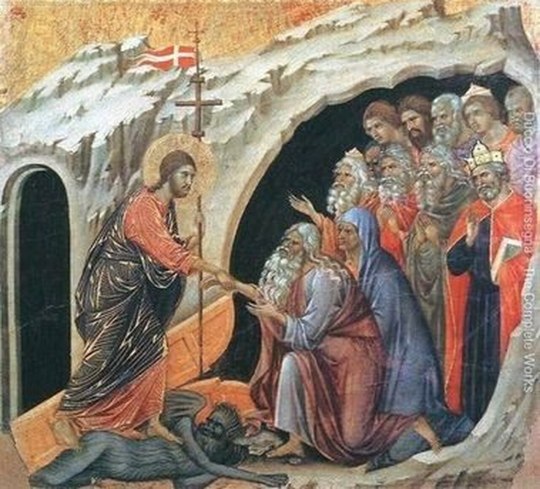
Holy Saturday - April 3, 2021
Christ is in His tomb. Rather, His Body is in the tomb, but when His Soul left His Body, He descended into Hell to “free the captives.” “Hell” here refers to the place of the dead in general (“Sheol” in the Hebrew, or “Hades” in the Greek), not to the place of torment with which the word “Hell” is most usually associated with today. The world “Hell” in the loosest, earliest sense includes:
the Limbo of the Fathers, the place for those who were righteous by charity and faith in the coming Messias and who died before His Coming
the Limbo of Infants, where, possibly, those who are sent who die without personal guilt but without Baptism after the time of Christ, or who died without charity and faith in the coming Messias before the time of Christ. This would be a place of beautiful, natural happiness, no punishment, and no sensible suffering.
Purgatory, where righteous people go to be cleansed of the temporal effects of their sins
Gehenna, the “Hell of the Lost,” the eternal place of punishment for the damned, the place we usually refer to as simply “Hell” today
by Dom Gueranger
The Easter Vigil
It was the practice of the Church, and one that had been handed down from the earliest ages, that the Holy Sacrifice of the Mass should not be offered up either on Good Friday or Holy Saturday. Good Friday, the anniversary of Jesus’ death, was exclusively devoted to the remembrance of the mystery of Calvary, and a holy fear kept the Church from renewing that Sacrifice upon Her altars. For the same reason She abstained on Holy Saturday, also, from its celebration. The burial of Christ is a sequel of His Passion; and during these hours when His Body lay lifeless in the tomb, it was fitting that the Sacrifice, wherein He is offered as the glorious and risen Jesus, should be suspended. Even the Greek Church, which otherwise never fasts on the Saturdays of Lent, follows the practice of the Latin Church for this Saturday: She not only fasts, but even omits the celebration of the Mass of the Presanctified.
Such was the discipline of the Latin Church for nearly a thousand years; but about the eleventh century, an important change began to be introduced with regard to the celebration of Mass on Holy Saturday. The Mass which, hitherto, had been celebrated during the night preceding Easter Sunday, then began to be anticipated on the Saturday; but it was always considered as the Mass for the hour of Our Lord’s Resurrection, and not as the Mass of Holy Saturday. The relaxations that had been introduced with regard to fasting were the occasion of this change in the liturgy. In the first ages, the faithful watched the whole night in the church, awaiting the hour when Our Lord rose triumphant from the tomb. They also assisted at the solemn administration of Baptism to the catechumens, which so sublimely expressed the passing from spiritual death to the life of grace. There was no other Vigil of the whole year so solemnly observed as this: but it lost a great portion of its interest, when the necessity of baptizing adults was reduced by Christianity having triumphed wheresoever it had been preached. The Eastern Church kept up the ancient tradition; but in the West, dating from the eleventh century, the Mass of the Resurrection hour was gradually anticipated, until it was brought even to the morning of Holy Saturday. Durandus of Menda, who wrote his Rational of the Divine Offices towards the close of the thirteenth century, tells us that, in his time, there were very few Churches which observed the primitive custom; and even those soon conformed to the general practice.
As a result of this change, there was an apparent contradiction between the mystery of Holy Saturday and the Divine Service which is celebrated upon it: Christ is still in the tomb, and yet His Resurrection began to be celebrated; the hours preceding the Mass were mournful, yet before midday the paschal joy had broken out, and the Lenten fast was ended. We will give a general view of the solemn Easter Vigil Service; afterwards, we will explain each portion.
In February of 1951, the Holy See under Pope Pius XII issued a decree restoring the Easter Vigil to Holy Saturday night. The decree states that by its gradual removal, in the course of centuries, to Saturday morning, this ancient and most important rite had suffered loss of significance. Furthermore, few of the faithful could attend the Saturday morning service. In response, therefore to petitions from throughout the world, the Holy See determined to permit the celebration of the restored Easter Vigil on an experimental basis. On November 16, 1955, the Restored Order of Holy Week was made permanent. In the remainder of this article, we will give the text of the Restored Easter Vigil, while retaining whatever of Abbot Gueranger’s original commentary is of historical interest.
According to the Decree, “the solemn Easter Vigil is to be celebrated at a suitable hour, namely, one which will permit the solemn Mass of this vigil to begin about midnight between Holy Saturday and Easter Sunday. Where, however, the conditions of the faithful as well as of the place make it fitting in the judgment of the Ordinary to anticipate the hour for celebrating the vigil, this should not begin before twilight, or certainly not before sunset.”
The great object of the whole of the Easter Vigil Service, and the center to which every one of the ceremonies converges, is the Baptism of the catechumens. The faithful must keep this incessantly before them, or they will be at a loss how to understand or profit by this liturgy. First of all, there is the blessing of the New Fire and of the Paschal Candle. After this are read the prophecies which have reference to the mysteries of tonight’s Service. Then comes the blessing of Baptismal water and the font, beginning with the first part of the Litany of the Saints. The matter of Baptism thus prepared, the catechumens receive the Sacrament of regeneration. Even if there are no catechumens, or even no Baptismal font nor a need for Baptismal water, the celebrant nonetheless leads the whole congregation in a renewal of Baptismal vows. The Litany of the Saints is concluded and immediately after, the Holy Sacrifice is celebrated in honor of Our Lord’s Resurrection. Finally the joyous Office of Lauds brings to an end one of the longest and most fatiguing Services in the Latin Liturgy.
At Rome, the Station was at St. John Lateran, the mother and mistress of all churches. The Sacrament of regeneration was administered in the Baptistery of Constantine. The thought of these venerable sanctuaries carries us back in thought to former centuries when, each year, not only was holy Baptism conferred on some adults, but also a numerous Ordination added its own splendor to the sacred pomp of this day, whose liturgy, as we have just said, is the richest of the whole year.
Blessing of the New Fire
In ancient times the Catechumens were given their final instructions on the Wednesday of Holy Week; they were then told to present themselves at the church on Holy Saturday at the Hour of Tierce (that is, about nine in the morning) for their final scrutiny. The Priests were there to receive them; they who had not been previously examined upon the Symbol (the Creed) were then questioned. The Lord’s Prayer and the biblical attributes of the four Evangelists having been explained, one of the Priests dismissed the Candidates for Baptism, bidding them spend the interval in recollection and prayer.
At the hour of None (about three in the afternoon), the Bishop and all the Clergy, vested in violet, would proceed to the church for the beginning of the Easter Vigil. The first ceremony consisted in the blessing of the New Fire, which was to furnish light for the whole Service. It was the daily custom, in the first ages of the Church, to strike a flame from a flint before Vespers; from this the lamps and candles were lit for the celebration of that Hour, and the light thus procured was kept up in the church till the Vespers of the following day. The Church at Rome observed this custom with great solemnity on Maundy Thursday morning, and the New Fire received a special blessing. We learn, from a letter written in the eight century by Pope St. Zachary to St. Boniface the Archbishop of Mainz, that three lamps were lit from this fire, which were then removed to some safe place, and care taken that their light be not extinguished. It was from these lamps that the light for Holy Saturday night was taken. In the following century, under St. Leo IV, whose pontificate lasted from 847 to 855, the custom of every day procuring new fire from a flint was extended also to Holy Saturday.
It is not difficult to understand the meaning of this ceremony, which is no longer observed by the Latin Church except on Holy Saturday. Our Lord said of Himself: “I am the Light of the world” (John 8: 12). Light, then, is an image of the Son of God. Stone, also, is one of the types under which the Scriptures speak to us of the Messias. St. Peter (1 Pet. 2: 6) and St. Paul (Eph. 2: 20), quoting the words of the prophet Isaias (Is. 28: 16), speak of Jesus as the Corner-Stone. The spark which is struck from the flint represents Our Lord rising from His rock-hewn sepulcher, through the stone that had been rolled against it.
It is fitting, therefore, that this fire which is to provide light for the Paschal Candle, as well as for those that are upon the altar, should receive a special blessing, and be triumphantly shown to the faithful. Formerly the faithful used to put out the fires in their houses before going to the church; they lit them, on their return, with light taken from the blessed fire, which they received as a symbol of Our Lord’s Resurrection.
All the lamps in the church were extinguished, which was a symbol of the abrogation of the Old Law, which ended with the rending of the veil of the temple; and that the New Fire represents the preaching of the New Law, whereby Our Lord Jesus Christ, the Light of the world, fulfilled all the figures of the ancient Covenant.
In order to help our readers to enter more fully into the mystery of the ceremony we are describing, we will here mention a miracle which was witnessed for many centuries. The clergy and people of Jerusalem assembled for the service of Easter Eve in the Church of the Holy Sepulcher. After waiting for some time in silence, one of the lamps suspended over Our Lord’s tomb was miraculously kindled. The other lamps and torches throughout the church were lit from this, and the faithful took its holy flame with them to their homes. It would seem that this annual miracle first began after the Saracens had taken possession of Jerusalem: God so ordaining, that it might be a proof to these infidels of the divinity of the Christian religion. The historians of those times, who have written upon the Latin Kingdom of Jerusalem, all speak of this miracle as of an incontestable fact; and when Pope Urban II went to France, there to preach the First Crusade, he brought forward this miracle as one of the motives which should inspire the faithful with zeal for the defense of the Sepulcher of Christ. When Our Lord, in the unsearchable ways of His justice, permitted Jerusalem to be reconquered by the infidels, the miracle ceased, nor has it ever been witnessed from that time. Our readers have no doubt heard of the scandalous scene, which is now repeated every Holy Saturday in the Church of the Holy Sepulcher in Jerusalem (see image above): we allude to the deception practiced by the schismatic priests, whereby they persuade their deluded people that their ingenious trick for lighting a lamp is the continuation of the miracle.
In the Restored Easter Vigil, the Blessing of the New Fire takes place outside the church doors, just within them, or inside the church where the people can better see and follow the sacred rite. Already in Old Testament times, God had chosen fire as a visible sign of His presence—for example, in the burning bush on Mount Sinai, in the pillar of fire going before the Israelites through the desert, in the fire of sacrifice on the altar of the Temple. The kindling of fire from a flint-stone is therefore, a vivid image of Christ’s renewed Presence among men: as the spark leaps from the flint, so He arose from His rock tomb. After the Fire has been struck, it is blessed by the celebrant:
O God, through Thy Son, the true Cornerstone, Thou hast enkindled in the faithful the fire of Thine own brightness. Hallow + now for our use and profit this New Fire struck from stone, and grant us through this Easter feast to be so inflamed with desire for Heaven that we may attain with pure souls to the feast of everlasting brightness. Through the same Christ Our Lord. Amen.
The celebrant sprinkles the New Fire with holy water and incenses it, after charcoal has been lit from the Fire. Now the Paschal Candle is presented to the celebrant to be blessed.
Blessing of the Paschal Candle
The sun has set, and our earth is mantled in darkness. The Church has provided a torch, which is to spread its light upon us during the whole of this long vigil. It is of unusual size. It stands alone, and is of a pillar-like form. It is the symbol of Christ. Before being lit, its scriptural type is the pillar of a cloud, which hid the Israelites when they went out from Egypt; under this form, it is the figure of Our Lord, when lying lifeless in the tomb. When lit, we must see in it both the pillar of fire which guided the people of God, and the glory of our Jesus risen from His grave. Our Holy Mother the Church would have us enthusiastically love this glorious symbol, and speaks its praise to us in all the magnificence of Her inspired eloquence. As early as the fifth century, Pope St. Zosimus extended to all the churches of the city of Rome, the privilege of blessing the Paschal Candle, although Baptism was administered nowhere but in the baptistery of St. John Lateran. The object of this grant was, that all the faithful might share in the holy impressions which so solemn a rite is intended to produce. It was for the same intention that, later, every church, even though it had no baptismal font, was permitted to have the blessing of the Paschal Candle.
An outline of the Cross, together with the first and last letters of the Greek alphabet and the numerals of the current year, is inscribed on the Candle with a stylus, to teach us that the Risen Christ, the Alpha and Omega (our Beginning and End), the Lord of all Ages, should shine in our lives during this coming year of grace. The celebrant first cuts the Sign of the Cross upon the Candle, saying: “Christ yesterday and today, the Beginning and End.” He then cuts the Alpha above the Cross, and Omega below it, saying: “The Alpha and the Omega.” He inscribes the first numeral of the current year in the upper left angle of the Cross, saying: “His are the seasons.” And the second numeral at the upper right, saying: “And the ages.” The third at the lower left, saying: “To Him be gory and dominion.” And the last at the lower right, saying: “Throughout all ages unto eternity. Amen.”
Five grains of incense (symbolizing Christ’s five glorious Wounds, as well as the spices brought to the tomb by St. Mary Magdalene) are now presented to the celebrant. He blesses them, sprinkles them with holy water and incenses them. He then fixes them upon the Cross which he has already cut in the Candle, saying: “(1) By His Holy Wounds, (2) glorious, (3) may He protect us, (4) and preserve us, (5) Christ the Lord. Amen.”
The celebrant now lights the Paschal Candle from the New Fire, saying: “Christ rises resplendent; may His Light dispel from each heart and mind the evil night!”
Finally, he blesses the burning Candle, saying:
We beseech Thee, Almighty God, pour forth Thy abundant + blessing upon this burning Candle. Thou, the Unseen, Who renewest all things, intensify the splendor of this night. May the Candle we offer tonight shine more brightly through the secret addition of Thine own radiance. And wherever a portion of this hallowing mystery of fire shall be carried, may the evil of Satan’s malice and guile be driven out, and the power of Thy majestic glory be made manifest. Through Christ Our Lord. Amen.
The Solemn Procession and Exsultet
Small candles are distributed to the clergy and people, and a procession forms in the back of the church. The deacon, now vested in white, carries the Paschal Candle. The procession advances a few steps, until the Deacon raises the Paschal Candle and sings: “Lumen Christi! (The Light of Christ!)” All turn toward the Candle and genuflect, answering: “Deo gratias.” The celebrant then lights his own candle from the Paschal Candle, and the procession continues. Near the middle of the church, the deacon repeats the Lumen Christi on a higher tone. All genuflect and respond as before; this time the clergy and servers light their candles. In the sanctuary the deacon repeats Lumen Christi in a still higher voice. All genuflect and respond again; the candles of the congregation are then lit, while the deacon fixes the Paschal Candle in its stand and prepares to sing the Exsultet.
The deacon proclaims the Easter solemnity to the people while chanting the praises of the Paschal Candle; and whilst celebrating the glories of Him, Whose emblem it is, he becomes the herald of the Resurrection. The altar, the sanctuary, the other sacred ministers, all are in the somber color of the Lenten rite; the deacon alone is vested in white. At other times, he would not presume to raise his voice as he is now going to do, in the solemn tone of a Preface: but this is the Vigil of the Resurrection; and the deacon, as the interpreters of the liturgy tell us, represents St. Mary Magdalene and the holy women, on whom Our Lord conferred the mission of preaching to the very Apostles that He had risen from the dead, and would meet them in Galilee.
The chant refers to the “wax which the mother bee wrought.” Holy Church sees in the wax produced by worker bees, who are virgin females, a figure of the Body of Christ, born of the Virgin Mary:
Let the angelic choirs of Heaven now rejoice; let the Divine Mysteries rejoice; and let the trumpet of salvation sound forth the victory of so great a King. Let the earth also rejoice, made radiant by such splendor; and, enlightened with the brightness of the Eternal King, let it know that the darkness of the whole world is scattered. Let our Mother the Church also rejoice, adorned with the brightness of so great a Light; and let this temple resound with the loud acclamations of the people. Wherefore I beseech you, most beloved brethren, who are here present in the wondrous brightness of this holy Light, to invoke with me the Mercy of Almighty God, that He Who has deigned to admit me among the Levites (i.e. deacons), without any merits of mine, would pour forth the brightness of His Light upon me, and enable me to perfect the praise of this wax Candle. Through Our Lord Jesus Christ…
The deacon continues the chant in Preface tone:
It is fitting indeed and just, with all our strength of mind and heart, and with our voice as instrument, to praise the invisible Father Almighty, and His Only-begotten Son, Our Lord Jesus Christ, Who paid to the Eternal Father, in our stead, the debt of Adam, and by the merciful shedding of His Blood for love of us, blotted out the guilt incurred by Original Sin. For this is the Easter Feast in which the true Lamb is slain, Whose Blood hallows the doorposts of the faithful. This is the night in which Thou of old didst lead our forefathers, the children of Israel, out of the land of Egypt to pass through the Red Sea with dry feet. This is the night which scattered the darkness of sin by means of the pillar of fire. This is the night which at this time, throughout the world, restores to grace and unites in sanctity those who believe in Christ, and are separated from the vices of the world and the darkness of sinners. This is the night in which Christ burst the bonds of death and came forth as Conqueror from the grave. For unless we had been redeemed, it would avail us nothing to be born. O wondrous condescension of Thy mercy toward us! O incomprehensible goodness of love: to redeem a slave Thou didst deliver up a Son! O truly necessary sin of Adam, which the Death of Christ has blotted out! O happy fault, that merited a Redeemer so holy and so great! O truly blessed night, which alone merited to know the time and hour when Christ rose from the dead! This is the night of which it is written: “The night shall be light as the day,” and: “Then shall my night be turned to day, in my rejoicing.” For the holiness of this night drives out wickedness and washes away guilt; it restores innocence to the fallen and joy to the sorrowful. It banishes enmities, establishes peace, and brings low the pride of vain man.
Wherefore, in this sacred night, receive, O Holy Father, this evening sacrifice of incense; Holy Church, by the hands of Thy ministers, offers it to Thee in the solemn oblation of this Candle wrought by the labor of bees. For now we have heard the praises of this column of wax which the sparkling fire lights to the honor of God. And though the fire was spread to kindle other flames, such sharing does not lessen the force of its light. For it is constantly fed by the melting wax which the mother bee wrought to form this precious Candle. O truly blessed night, when Egypt was plundered and the Hebrews enriched. O night, when Heaven is wedded to earth, and God to man.
We beseech Thee, therefore, O Lord: may this Candle, consecrated to Thine honor, continue with undiminished light to dispel this night’s darkness. Receive it as a fragrant and pleasing offering, and let its light mingle with the lamps of Heaven. May the Morning Star behold its flame—that Morning Star Who knows no setting: He Who upon returning from the grave, serenely shone forth upon mankind. In this festival of Easter joys, we beseech Thee, therefore, O Lord, for ourselves, Thy servants, for all the clergy and Thy most devoted people, together with (our most blessed Pope N. and) our Bishop N.: grant peace to our days: guide, rule over, and protect us by Thy constant care. Look with favor, too, upon our rulers. Assist them with Thy boundless love, and gracious mercy; direct their hearts toward justice and peace, that after this life of earthly labors they may attain, together with all Thy people, to the heavenly fatherland. Through the same Jesus Christ, Thy Son, Our Lord…
Here the deacon takes off the white dalmatic, vests in violet, and returns to the celebrant. Then begin the Old Testament prophecies.
It is fitting indeed and just, with all our strength of mind and heart, and with our voice as instrument, to praise the invisible Father Almighty, and His Only-begotten Son, Our Lord Jesus Christ, Who paid to the Eternal Father, in our stead, the debt of Adam, and by the merciful shedding of His Blood for love of us, blotted out the guilt incurred by Original Sin. For this is the Easter Feast in which the true Lamb is slain, Whose Blood hallows the doorposts of the faithful. This is the night in which Thou of old didst lead our forefathers, the children of Israel, out of the land of Egypt to pass through the Red Sea with dry feet. This is the night which scattered the darkness of sin by means of the pillar of fire. This is the night which at this time, throughout the world, restores to grace and unites in sanctity those who believe in Christ, and are separated from the vices of the world and the darkness of sinners. This is the night in which Christ burst the bonds of death and came forth as Conqueror from the grave. For unless we had been redeemed, it would avail us nothing to be born. O wondrous condescension of Thy mercy toward us! O incomprehensible goodness of love: to redeem a slave Thou didst deliver up a Son! O truly necessary sin of Adam, which the Death of Christ has blotted out! O happy fault, that merited a Redeemer so holy and so great! O truly blessed night, which alone merited to know the time and hour when Christ rose from the dead! This is the night of which it is written: “The night shall be light as the day,” and: “Then shall my night be turned to day, in my rejoicing.” For the holiness of this night drives out wickedness and washes away guilt; it restores innocence to the fallen and joy to the sorrowful. It banishes enmities, establishes peace, and brings low the pride of vain man.
Wherefore, in this sacred night, receive, O Holy Father, this evening sacrifice of incense; Holy Church, by the hands of Thy ministers, offers it to Thee in the solemn oblation of this Candle wrought by the labor of bees. For now we have heard the praises of this column of wax which the sparkling fire lights to the honor of God. And though the fire was spread to kindle other flames, such sharing does not lessen the force of its light. For it is constantly fed by the melting wax which the mother bee wrought to form this precious Candle. O truly blessed night, when Egypt was plundered and the Hebrews enriched. O night, when Heaven is wedded to earth, and God to man.
We beseech Thee, therefore, O Lord: may this Candle, consecrated to Thine honor, continue with undiminished light to dispel this night’s darkness. Receive it as a fragrant and pleasing offering, and let its light mingle with the lamps of Heaven. May the Morning Star behold its flame—that Morning Star Who knows no setting: He Who upon returning from the grave, serenely shone forth upon mankind. In this festival of Easter joys, we beseech Thee, therefore, O Lord, for ourselves, Thy servants, for all the clergy and Thy most devoted people, together with (our most blessed Pope N. and) our Bishop N.: grant peace to our days: guide, rule over, and protect us by Thy constant care. Look with favor, too, upon our rulers. Assist them with Thy boundless love, and gracious mercy; direct their hearts toward justice and peace, that after this life of earthly labors they may attain, together with all Thy people, to the heavenly fatherland. Through the same Jesus Christ, Thy Son, Our Lord…
Here the deacon takes off the white dalmatic, vests in violet, and returns to the celebrant. Then begin the Old Testament prophecies.
The torch of the Resurrection now sheds its light throughout the holy place, and gladdens the hearts of the faithful. In ancient times, the preparatory ceremonies for Baptism were now begun. They occupied a considerable portion of time, especially when there were a great number of aspirants to Baptism. It is for this reason that the bishop would come to the church at the hour of None (about three in the afternoon), and that the great Vigil began so early. Whilst these rites were being administered to the catechumens, the rest of the faithful would listen to appropriate passages from the Scriptures, which were read from the ambo, and which were the complement to the Lenten instructions.
These lessons were twelve in number; but in the Lateran Basilica, we may say there were twenty-four, since each was read in Latin first, then in Greek. To each was added a prayer, which summed up the doctrine expressed in the preceding prophecy. To some of them was added an appropriate canticle from the Old Testament, and was sung by the whole assembly to the well know melody of the Tract. The catechumens, when their preliminary ceremonies were finished, were allowed to enter the church, where, in the place assigned to them, they would listen to the Lessons, and join in the prayers. How could they better continue their preparation for the great Sacrament? And yet, there is an aspect of mournfulness about this portion of the Service, as the longed-for hour had not yet come. Frequent genuflections and the somber-colored vestments strongly contrast with the beautiful flame of the Paschal Candle. The hearts of the faithful would still be throbbing with the emotions excited within them by the Exsultet; they were impatient to see their Jesus’ Resurrection fulfilled in the Baptism of the catechumens.
In the restored Easter Vigil, the preliminary ceremonies are performed at an earlier hour, if there be any candidates for Baptism during the nocturnal Liturgy. The number of Lessons is reduced to four:
The First Lesson is the Creation account of Genesis (1: 1—2: 2), in which we see an image of the “new creation,” which Jesus Christ wrought in us through Baptism. The Father made, the Son re-made; the Father created, the Son redeemed.
The Second Lesson is the account from Exodus (14: 24—15: 1) of the destruction of the army of the Egyptians by the waters of Red Sea. The Exodus from the slavery of Egypt and the crossing of the Red Sea foreshadowed the deliverance of mankind from the bondage of sin, and its attaining freedom by passing through the waters of Baptism. And as the pillar of fire later on led the Israelites safely through the desert, so our risen Light, Christ, leads us through the darkness of earthly life into the brightness of grace and glory.
In the Third Lesson the Prophet Isaias (4: 2-6) looks forward to the holy and purified state of the new Chosen People after the judgment of God would cleanse away current wickedness and the Messias had come. For us, it amounts to an exhortation to lead holy lives as a result of our Baptism, especially since we enjoy the loving and powerful protection of Our Lord Jesus Christ.
The Fourth Lesson from Deuteronomy (31: 22-30) recalls the admonition of Moses to the Chosen People and a prophecy of their infidelity: “…For I know that after my death you are sure to become corrupt…” We are reminded that even the elect of God may fall; nor are we secure without our earnest collaboration with God’s grace. The warning God here utters to the Chosen People of old, is meant also for us.
First Part of the Litany of the Saints
In ancient times the Litany of the Saints was not chanted until after the Baptisms. It served as an interval while the clergy vested for Mass and other preparations were made for the Holy Sacrifice. The chanters would repeat each invocation three times. In the restored Easter Vigil, the Litany is abbreviated and divided into two parts. The first part—the actual invocation of the Saints—is chanted now, as a preparation for the Baptismal service.
Blessing of the Baptismal Water (and Font)
The blessing of water for Baptism is of apostolic institution, as we learn from many of the holy fathers, among whom we may mention St. Cyprian, St. Ambrose, St. Cyril of Jerusalem, and St. Basil. It is just, that the instrument of so divine a work should receive every mark of honor, that could secure to it the respect of mankind: and, after all, does not this honor and respect redound to God, Who chose this creature to be, as it were, the co-operator of His mercies to us? It is from water that we came forth Christians. The early fathers allude to this, when they call Christians the flesh of Christ. We cannot be surprised, after this, that the sight of the element that gave us our spiritual life should excite us to joy, or that we should pay to this element an honor, which is referred to the Author of all the graces about to be bestowed.
The prayer used by the celebrant for blessing the water is so full of elevation of thought, energy of diction, and authority of doctrine, that we may, without hesitation, attribute it to the earliest ages of the Church. The ceremonies which accompany it bespeak its venerable antiquity. It is sung to the solemn tone of the Preface, which imparts such a lyric effect. The celebrant first recites a preliminary prayer, and then begins his magnificent blessing. He is filled with the holy enthusiasm of the Church. He turns to the faithful, and they respond. He is going to lead them to such grand mysteries: Sursum corda!
Almighty and everlasting God, be present in these mysteries of Thy great love; be pleased to act in these Thy Sacraments. Send forth the Spirit of adoption to re-create a new race of those whom the font of Baptism will bear to Thee. Thus what we perform by our humble ministry will be made effective by Thy power. Through Our Lord Jesus Christ Thy Son…
He continues in Preface tone:
It is fitting indeed and just, right and helpful to salvation, for us always and everywhere to give thanks, O holy Lord, Father Almighty, Everlasting God, Who by Thy invisible power dost wonderfully produce such mysteries, yet Thou dost assist with Thy presence the gifts of Thy grace and dost incline the ears of Thy mercy even to our prayers.
O God, even at the beginning of the world, Thy Spirit moved over the water that it may conceive the power of sanctifying. Through water, O God, Thou didst wash away the crimes of the guilty world, and by the pouring out of the deluge didst give a prefigurement of the means of regeneration: that one and the same element might work mysteriously both the death of vice and a new beginning of virtue. O Lord, look upon the face of Thy Church, and multiply in Her Thine acts of regeneration; Thou Who by the torrent of Thy grace fillest Thy holy city with joy, opening the font of Baptism over all the earth for the renewal of mankind; by the command of Thy Majesty may She receive from the Holy Ghost the grace of Thine Only-begotten Son.
Here the celebrant pauses a moment, and putting his hand into the water divides it in the form of a Cross, to signify that it is by the Cross that this element receives the power of regenerating the souls of men. This wonderful power had been promised to water; but the promise was not fulfilled until Christ had shed His Blood upon the Cross. It is this Blood which operates by the water on the souls of men; and with the action of this Precious Blood is joined that of the Holy Ghost, as the celebrant tells us in this prayer, which he thus continues:
May the Holy Ghost impregnate this water, prepared for the rebirth of men, by the secret infusion of His Divine Power, that there may be reborn from the stainless womb of this divine font a new creation conceived in holiness, the children of Heaven. May they all, though differing in age and gender, be alike brought forth as infants by grace, their mother. Therefore, may every unclean spirit, at Thy command, O Lord, depart from hence; may the whole malice of diabolical deceit be entirely banished. Let no infection of the power of the enemy prevail here. Let him not encircle it with his snares, nor enter it by stealth, nor taint it with corruption.
After having thus besought God to protect the water of the font from the influence which Satan seeks to exercise over every creature, the celebrant puts his hand into it. The august character of a bishop or priest is a source of sanctification; the mere contact of his consecrated hand produces a salutary effect, as often as he acts in virtue of the priesthood of Christ, which dwells within him:
May this, Thy creature, O Lord, be holy and innocent, free from every assault of the enemy, and purified by the destruction of all his wickedness. May it be a living fountain, a water that regenerates, a purifying stream: that all who are to be washed in this saving bath may receive within them, by the operation of the Holy Ghost, the grace of a perfect cleansing of their sins.
While pronouncing the following words, the celebrant blesses the water, thrice making over it the Sign of the Cross in honor of the Holy Trinity, in Whose Name men are baptized:
Wherefore, O creature of water, I bless thee by the living † God, by the true † God, by the holy † God, by that God Whose Word in the beginning separated thee from the dry land, and Whose Spirit moved over thee.
Here he parts the water and sprinkles some toward the four corners of the earth, making an allusion to the four rivers of Paradise, and reminding us of Christ’s command that all believers are to be baptized:
Who made thee flow forth from the fountain of Paradise, commanding thee to water the whole earth with thy four rivers. Who in the desert changed thy bitterness into sweetness, and made thee fit to drink; and Who brought thee forth from the rock to quench His people’s thirst.
I bless † thee likewise through Jesus Christ His Only Son, Our Lord, Who in Cana of Galilee changed thee into wine by a wonderful miracle. Who walked with His Feet upon thee, and was baptized in thee by John in the Jordan. Who made thee flow forth from His side with His Blood, and Who commanded His disciples that such as believed should be baptized in thee, saying: “Go, teach all nations, baptizing them in the Name of the Father, and of the Son, and of the Holy Ghost.”
The celebrant interrupts the chant and recites:
Do Thou, Almighty and merciful God, while we are now fulfilling this command, be present with us; graciously send forth Thine Own Breath.
Christ conferred the Holy Ghost upon His Apostles by “breathing” on them. The same sanctifying Spirit is, therefore, here signified. The Holy Ghost is called Spirit, which means a breath—He is the Divine Breathing, that mighty Wind, which was heard in the Cenacle. The celebrant accordingly breathes upon the water in the Sign of the Cross three times and says:
Bless this clear water with Thy Breath, O Lord, that besides its natural power of cleansing bodies, it may also prove efficacious for the purification of the souls of men.
The deacon brings the Paschal Candle from its stand to the celebrant, who lowers it into the water three times, to a lower depth each time, while singing, each time in a higher pitch. This is the most solemn rite of the blessing. It signifies the mystery of Christ’s baptism in the Jordan, whereby the element of water received the pledge of its future sanctifying power. The Son of God went down into the stream, and the Holy Ghost came upon Him in the form of a Dove. But now, it is something more than a promise—the water receives the reality, the virtue; and it receives it by the action of these two Divine Persons. While the Candle symbolizes the Sacred Body of Christ, its flame symbolizes the celestial Dove hovering over Him:
May the power of the Holy Ghost descend into all the water of this font.
With the Candle still immersed deeply in the water, the celebrant leans forward over the font: and that he may signify the union of the power of the Holy Ghost with that of Christ, he breathes again upon the water—this time, not in the form of a Cross, but in that of the Greek letter Ψ, which is the initial of the Greek word for Spirit. The upslanting arms of this letter also signify the “Tree of Life.” This done, he resumes his prayer by the following words:
And may He make the whole substance of this water fruitful and capable of regenerating.
The Paschal Candle is now raised up out of the water, and replaced in its stand by the deacon. The celebrant continues:
Here may every stain of sin be washed away; here may human nature, created to Thine image, and reformed to the honor of its origin, be cleansed from the filth of its old state; that every man who enters this Sacrament of regeneration be born again to a new infancy of true innocence.
He concludes without chant:
Through Our Lord Jesus Christ Thy Son: Who will come to judge the living and the dead, and the world by fire. R. Amen.
Some of the blessed Easter water is now set aside with which to sprinkle the people after the renewal of their baptismal vows, and for the sprinkling of homes and other places.
But the Church is not satisfied with having given Her blessing to the water. On Holy Thursday, She was put in possession of the graces of the Holy Ghost by receiving the Holy Oils: She now mingles a portion of these with the water. The faithful—seeing how every symbol expressive of divine adoption is made to bear upon the Baptismal Water, whence men receive salvation—will learn what is the reverence they should have for it. The celebrant, taking the Oil of Catechumens, pours some upon the water in the Sign of the Cross, saying:
May this font be sanctified and made fruitful by the oil of salvation, for such as are reborn from it unto life everlasting. R. Amen.
He then pours out a portion of the Holy Chrism—the most sacred Oil the Church possesses—in the Sign of the Cross, saying:
May the infusion of the Chrism of Our Lord Jesus Christ, and of the Holy Ghost the Paraclete, be made in the Name of the Holy Trinity. R. Amen.
He then pours both Oils together, making the Sign of the Cross thrice and saying:
May this mingling of the Chrism of salvation, and of the Oil of Unction, and of the water of Baptism, be made in the Name of the † Father, and of the † Son, and of the Holy † Ghost. R. Amen.
The Oils are now mixed with the water, that thus every portion of it may come into contact with this additional source of sanctification. The Holy Oils likewise symbolize the Holy Ghost—the “Anointer”—with Whose “unction” we are filled at Baptism. Pouring the Holy Oils into the water therefore signifies a fullness of His sanctifying power communicated to the Baptismal Water.
If there are any Catechumens to be Baptized, the celebrant resumes white vestments and confers this Sacrament. By Baptism each of us has entered the great Paschal Mystery—Christ’s Death and Resurrection became our death to sin and rising to a new life of grace. By assisting at the Baptism of new members of Christ’s One, True, Catholic Church, we realize anew how great is the gift of our own re-birth, and we welcome the new members as our true brothers and sisters in Christ.
If the Church has a Baptismal Font, the newly blessed Baptismal Water is carried to it in a solemn procession. Having poured the Baptismal Water into the Font, the celebrant prays:
Almighty and everlasting God, look graciously upon the devotion of Thy people who are to be born anew. Like the deer they have sought the fountain of Thy living water. Mercifully grant that their thirsting faith may, through the mystery of Baptism, sanctify both soul and body. Through Our Lord…
The font is incensed, and the procession returns.
Renewal of Baptismal Promises
Although this ceremony was not formerly part of the official Easter Vigil Liturgy, the practice is of ancient origin. The Council of Sens, held in Paris in the year 829 and convoked by King Louis the Pious to remedy the disorders of Christians, which were widespread at that time, judged that the principle cause of the corruption of morals was the forgetfulness or ignorance of the vows of Baptism; and it could find no better remedy for so great an evil than to order Christians to renew their Baptismal promises.
In churches having no Baptismal font, the above ceremonies of the Blessing of Baptismal water may be omitted. However the Renewal of Baptism Promises always takes place—if need be, the people will be sprinkled with ordinary blessed water.
If the Sacrament of Baptism has not been conferred, the celebrant exchanges his violet vestments for white at this time. The ceremony begins with the celebrant incensing the Paschal Candle, while the candles of the congregation are relit from its flame.
The celebrant then faces the people and admonishes them:
My dear brethren, in this most sacred night Holy Mother Church commemorates the death and burial of Our Lord Jesus Christ. In return for His great love, She lovingly keeps watch with Him. And looking forward to His glorious Resurrection, She rejoices with an exceeding joy.
But, as the Apostle teaches us, we have by Baptism been buried with Christ unto death. As Christ, then, has risen from the dead, so we too must walk now in newness of life. For we know that our old self has been crucified with Christ, that we may no longer be slaves to sin. Let us remember always that we have died to sin and to the world, but we are to live for God, in Christ Jesus Our Lord.
Therefore, beloved brethren, having completed the Lenten observance, let us now proceed to renew the promises of our holy Baptism. By these promises we once renounced Satan and all his works, as well as that world which is the enemy of God; we vowed, furthermore, to serve God faithfully in His One, True, Holy, Catholic Church. And therefore, I ask you once again:
Celebrant: Do you renounce Satan? All: We do renounce him.
Celebrant: And all his works? All: We do renounce them.
Celebrant: And all his pomps? All: We do renounce them.
Celebrant: Do you believe in God, the Father Almighty, Creator of Heaven and earth? All: We do believe.
Celebrant: Do you believe in Jesus Christ, His only Son, Our Lord, Who was born into this world and Who suffered for us? All: We do believe.
Celebrant: And do you believe in the Holy Ghost, the Holy Catholic Church, the Communion of Saints, the forgiveness of sins, the resurrection of the body, and life everlasting? All: We do believe.
Celebrant: Let us now together pray to God, as Our Lord Jesus Christ has taught us: All: Our Father, Who art in Heaven…
Celebrant: And may Almighty God, the Father of Our Lord Jesus Christ, Who caused us to be born anew by water and the Holy Ghost, and Who granted us remission of sins, keep us by His grace unto everlasting life, in the same Jesus Christ, Our Lord. All: Amen.
The people are now sprinkled with the Easter water, as a reminder of their own Baptism. They should, accordingly, receive it with sincere sorrow for their past sins, and a firm determination to live in the future as re-born children of God and faithful members of His Holy Church. After the aspersion, the people again extinguish their candles.
In preparation for the Holy Sacrifice of the Mass, the Litany of the Saints is now concluded.
Solemn Mass of the Easter Vigil
The solemn Litany is drawing to its end, and the choir has already begun its closing invocation—Kyrie eleison!—which is also the beginning of this Mass. The celebrant comes forth from the sacristy with all the pomp that marks the principal feasts of the Church, and then, ascending the altar, he offers the homage of incense to the Most High. Hence, an Introit, which on other occasions is sung by the choir during the procession from the sacristy to the altar, is not needed.
The morning star has blended its rays with those of our Paschal Candle, just as the deacon prayed might be; but now, the morning star itself begins to pale, for the star of day—the figure of our Jesus, the Sun of Justice—is soon to rise.
The censing of the altar is finished; and then—Oh glorious triumph of our risen Jesus!—the celebrant sings forth, in a transport of joy: Gloria in excelsis Deo! The hitherto silent bells peal to the glad angelic hymn, whilst the purple coverings are removed from the images and the altars are decked with flowers and candles. The enthusiasm of our Holy Faith has mastered every heart, making it beat with emotion. The choir takes up the heavenly canticle, and continues it to the end. The celebrant then sings this prayer for the newly baptized throughout the world:
O God, Who dost illumine this most holy night by the glory of the Lord’s Resurrection, preserve in the new children of Thy family the spirit of adoption which Thou has given; that renewed in body and mind, they may render to Thee a pure service. Through the same Our Lord Jesus Christ…
The Epistle is from St. Paul to the Colossians:
Brethren: If you have risen with Christ, seek the things that are above, where Christ is seated at the right hand of God. Mind the things that are above, not the things that are on earth. For you have died and your life is hidden with Christ in God. When Christ, your life, shall appear, then you too will appear with Him in glory.
After this, the souls of the faithful—yea, the very walls of the church—echo with the joyful tidings—Alleluia!—which the celebrant, filled with holy ardor, intones to the well-known melody. The choir repeats it after him. Thrice—each time on a higher note and with an increase of joy—the heavenly word is interchanged between the celebrant and choir. At this moment all mournfulness is at an end. One feels that God has accepted the expiatory works of our Lent; and that, by the merits of His Son now risen from the grave, He pardons our earth, since He permits us to hear once more the song of Heaven.
But something is still wanting to the joy of our Easter. Jesus has risen from the tomb; but, so far, He has not shown Himself to all. His Blessed Mother, St. Mary Magdalene, and the other holy women, are the only ones who have as yet seen Him; it is not until the evening that He will appear to His Apostles. We have only just begun the day. Therefore it is that the Church once more offers Her praise to Her God, under the Lenten formula of the Tract. Likewise, no additional torches accompany the Gospel, which is St. Matthew’s account of the Resurrection; the book, however, is incensed. Here again we have an allusion to the events which took place on this great morning—the women went to the sepulcher carrying sweet spices with them, but the light of faith in the Resurrection was not as yet in their hearts:
Now late in the night of the Sabbath, as the first day of the week began to dawn, Mary Magdalene and the other Mary came to see the sepulcher. And behold, there was a great earthquake; for an angel of the Lord came down from Heaven, and drawing near rolled back the stone, and sat upon it. His countenance was like lightning, and his raiment like snow. And for fear of him the guards were terrified, and became like dead men. But the angel spoke and said to the women, “Do not be afraid, for I know that you seek Jesus, Who was crucified. He is not here, for He has risen even as He said. Come, see the place where the Lord was laid. And go quickly, tell His disciples that He has risen, and behold, He goes before you into Galilee; there you shall see him. Behold, I have foretold it to you.”
The celebrant does not intone the glorious profession of Faith: it is reserved for the second Mass, which is to be celebrated later in the day. By this omission of the Creed, the Church would remind us of the hours which elapsed before the Apostles, who were to preach to the world the mystery of the Resurrection, had themselves honored it by their faith.
The Offertory verse is also omitted; the celebrant begins to offer the bread and wine to be used in the Sacrifice, immediately after the Dominus vobiscum. This omission is also of ancient origin, when the Offertory verse accompanied a lengthy procession. To shorten the already long ceremonies, the procession also was omitted. Also omitted are the Kiss of Peace (which is accompanied by the words, “Peace be to thee!”) and the Agnus Dei (which ends with, “Give us peace.”) It was not till the evening of the day of His Resurrection, that Jesus spoke the words, “Peace be to thee!” to His disciples. Holy Church, reverencing as She does every detail of Her Jesus’ life, loves to imitate them in Her own practice, and thus omits these words from this Mass.
In ancient times, the newly baptized would receive also, before the Mass began, the Sacrament of Confirmation—if they were adults and if a Bishop were present. At the Vigil Mass they would all make their First Holy Communion—even the newly baptized infants. The deacon would dip his finger into the Chalice, and then put it into their innocent mouths. Afterwards, to signify that they were all now, by their Baptism, those new-born babes of whom St. Peter speaks (1 Peter 2: 2), they would receive a little milk and honey—it was also an allusion to the promised land of Heaven, now opened to them.
Lauds
In consequence of the service being so long, the Church makes these Lauds as short as possible, and gives them a joyous character, in keeping with the return of the Alleluia. They are drawn up so as to form parts of the Mass—the Communion verse and Postcommunion oration:
Ant. Alleluia, alleluia, alleluia. Ps. 150: Praise the Lord in His sanctuary; praise Him in the firmament of His power…
Ant. Bened. Now very early in the morning of the first day of the week, when the sun had just risen, they came to the sepulcher. Alleluia.
The celebrant incenses the altar for the last time while the choir chants the Benedictus. The Antiphon is repeated and the celebrant sings the Postcommunion oration:
Pour forth upon us, O Lord, the spirit of Thy love, that those whom Thou hast nourished with the Easter Sacraments, may by Thy goodness, be of one mind and heart. Through Our Lord Jesus Christ, Thy Son…
The deacon sings the Ite Missa Est as usual, adding a double Alleluia! The same will be done throughout the Easter Octave.
Instructions for Holy Saturday
by Leonard Goffine, 1871
Why is this day called Holy Saturday?
Because on this day Jesus, the Holy of Holiest, through whom we also should become holy, rested in the sepulchre, and because the Church to-day receives the blessed baptismal water, by which the unbaptized is born again to a new, holy life, which is also indicated by the blessed fire and the Easter-Candle.
Why is new fire struck from a flint, blessed, and the lamps and candles in the Church lighted from it?
In old times it was customary to strike a new fire, bless it, and light the candles by it every day, and later every Saturday; it is said, that in the eleventh century this ceremony was restricted to Holy Saturday. The fire is struck from a stone to indicate, that Christ is the light of the world, and the stone which the Jews rejected, has now become the corner stone of His Church (Ps. cxvii. 22.); that the divine Son, the light of the world, was apparently extinguished at His death, but at His resurrection shone anew; that all those who in Church to-day are physically lighted by this fire, may one day be filled anew, in the future life, with spiritual light. This fire is blessed, because the Church blesses every thing that is used in her service in Church, and because the light and fire used in Church must be holy, for they represent Christ, who brought the fire of love upon earth with which to enkindle our hearts. (Luke xii. 49.)
What is represented by the triple candlestick?
The triple candlestick represents the most Holy Trinity of which the second Divine Person came down to earth as the true light. For this reason the priest (or deacon), sings three times at the lighting of each candle: Lumen Christi, “Light of Christ,” and kneeling three times humbly adores the Triune Deity, and especially the true divine light of Christ for which he says Deo gratias, “Thanks be to God”.
What is the Easter-Candle?
It is an emblem of Christ, who has risen from death, of whom the pillar of fire which led the children of Israel out of the bondage of Egypt, was a prototype, as Christ, the true light, has led us from the bondage of Satan into the freedom of the children of God. The five holes in the candle represent the five wounds of Jesus by which mankind was healed (i. Pet. ii. 24.), and the five grains of frankincense signify the spices with which the body of our Lord was embalmed.
Why are the Easter-Candle and all the others lighted from the triple candle?
To show that Christ was begotten by the Father of light from all eternity, and is therefore true God from true God, light from light–that from God, through Christ, He being the light of the world, comes all man’s enlightenment, and is diffused by the grace of God over all. (ii. Cor. iv. 6.)
To what do the twelve lessons, sung after the blessing of the baptismal water, all point?
They point to the baptism in which we are born again to a new life.
Why is the baptismal water blessed with so many ceremonies, and what is its signification?
The baptismal water signifies the blood of Christ by which our souls are purified, and in which the devil is drowned as Pharao in the Red Sea, and is blessed with so many ceremonies, that the different effects of baptism may be known, and that this holy Sacrament may be administered and received with the more reverence, devotion, and sanctity.
What is the meaning of these ceremonies?
The priest with his hand parts the water into the form of a cross, to illustrate that God gives the secret virtue to this water, through Christ who died on the cross, of changing all those born in original sin into holy people. He touches the surface of the water with the palm of his hand, to show that the Holy Ghost is over this water as at the creation, and bestows many graces on those who are baptized. He blesses it, signing it three times with the sign of the cross, because the water receives its sin-cleansing power only through the sufferings and the merits of Christ, from the Father, by the cooperation of the Holy Ghost. The baptismal water is thrown by the priest towards the four parts of the earth, because the grace of baptism should reach all nations. The priest breathes on the water three times in the form of a cross: the Creator breathed upon the first man, and breathed into him the breath of life, Christ breathed upon the apostles the Holy Ghost who by His grace and power revives and sanctifies those who are baptized. The Easter-Candle (emblem of Christ, risen from the dead), is dipped three times, and each time deeper into the water, to show that the baptized should become more and more enlightened through the light of Christ’s doctrine, more and more penetrated by its divinity, more and more purified from sin. The people are sprinkled with this water to remind all those present who have received sanctification in baptism, and have lost it by sin, that they should strive by tears of repentance to regain it. Finally, oil and chrism are mixed in the water as a sign that the grace of the Holy Ghost which is represented by the oil and chrism, is given in its fulness to the water; and also, that the baptized should, after baptism, devote themselves exclusively to the service of Christ, the Anointed One, and unite themselves in love to Him.
Why is the baptismal water blessed only on this day and on the Saturday before Pentecost?
Because in early times adults and neophytes were baptized only on these days; and because the Saviour, risen, is the example of a soul sanctified by baptism and by the Holy Ghost, the Author of all sanctity and the true fountain of the grace of baptism.
How should we assist at the blessing of the baptismal water?
With sentiments of sincere gratitude for having been given the holy grace of baptism; with the firm resolution of preserving our baptismal innocence, or if we have lost it, of obtaining it again by penance. We should renew our baptismal vows on this day especially, first by saying the apostle’s creed, making acts of faith, hope, and love, and an act of contrition, and then saying with heart and lips: I renounce the devil, all his pride, and all his suggestions.”
Why does the priest prostrate himself after blessing the baptismal water, rising again when the litany of the saints has been sung?
To most humbly ask God, by the intercession of the saints, that He would give to all men without exception the grace of baptism, that as all men have been dead and buried in sin, so they may rise with Christ as new creatures to grace and eternal life.
Why are the altars redecorated on this day?
Because the Church, the beloved bride of Christ, desires to announce in advance to her children the glad tidings, that the Lord has risen from the dead: she decorates herself therefore, and causes the bells to peal and joyous hymns to resound. It also refers to Christ, at His resurrection, having adorned Himself with a glorious, incorruptible body.
Why is there no Introit in this day’s Mass?
The Introit of Mass was formerly an entire psalm, sung while the people were assembling in Church; but as in early times the people on Easter were already assembled and assisting at the ceremonies, no Introit was sung at the Vigil Mass, as to-day, although Mass is now said in the morning, the Church having abolished the night vigils, on account of abuses. PRAYER OF THE CHURCH. O God, who enlightenest this most sacred night by the glory of the resurrection of the Lord; preserve in the new offspring of Thy family the spirit of adoption Thou hast given them; that being renewed in body and soul, they may serve Thee with purity of heart. Throught etc.
EPISTLE. (Colos. iii. 1-4.) Brethren: If you be risen with Christ, seek the things that are above; where Christ is sitting at the right hand of God: mind the things that are above, not the things that are upon the earth. For you are dead; and your life is hid with Christ in God. When Christ shall appear, who is your life; then you also shall appear with him in glory. Alleluia, Alleluia, Alleluia. EXPLANATION. St. Paul places Christ’s resurrection before us as the example and motive of the spiritual resurrection from sin, which should be effected in us by the holy Sacraments at Easter time.–With Christ we should die to the world, and live hidden in Him, if we desire to rise at the Last Day with Him in glory and be acknowledged before all men by Him as His own.
After the epistle the priest says three times: Alleluia! as a joyful exclamation over the Redeemer’s triumphant victory.
GOSPEL. (Matt, xxxviii. 1-7.) In the end of the Sabbath, when it began to dawn towards the first day of the week, came Mary Magdalen and the other Mary to the sepulchre. And behold, there was a great earthquake. For an angel of the Lord descended from heaven; and coming, rolled back the stone, and sat upon it: and his countenance was as lightning, and his raiment as snow. And for fear of him, the guards were struck with terror, and became as dead men. And the angel answering, said to the women: Fear not you; for I know that you seek Jesus who was crucified. He is not here, for he is risen as he said. Come, and see the place where the Lord was laid. And going quickly, tell ye his disciples that he is risen: and behold, he will go before you into Galilee: there you shall see him. Lo, I have foretold it to you.
What are we to learn from this gospel?
That we, too, will receive the plenitude of divine grace and heavenly blessings, if like these pious women we seek Christ early, that is, by making a good intention before we begin our work.
Why is there no Credo or Agnus Dei said, nor the kiss of peace given, and short vespers said after communion?
Formerly, and in Rome even now, the Credo or confession of faith is said by the newly baptized, the Agnus Dei was sung in the litany of the saints, and these are therefore omitted in the Mass. The kiss of peace is not given, because Christ has not yet said to His disciples, Peace be with you. Short vespers are said after the priest’s communion, because this day is a type of the eternal Sabbath in heaven which has no vespers, that is, evening.
Do not omit to-day to once more visit the holy sepulchre, to adore Christ in the Blessed Sacrament, to thank Him for His passion and death, and to honor His sorrowful mother. If in the evening the solemn ceremonies of the resurrection are held, assist at them and there make the repeated resolution to rise from the sleep of sin and begin a new life with Christ.
11 notes
·
View notes
Text
The eight Sabbats: Witch's holidays

by Michelle Gruben
Modern Pagans celebrate eight major holidays throughout the year, known as Sabbats. They are based on pre-Christian customs related to the movement of the sun. Most are related to the Celtic agricultural festivals that have given them their names.
Of course, now we know that the sun doesn’t actually move around the earth. And lots of Pagans live far away from the places where our food is grown. But the Sabbats are still a meaningful way to connect with the cycles of the seasons and of human life.
The Pagan Sabbats include the four astronomical holidays (the equinoxes and solstices) and four traditional holidays in between. Together, these eight festivals are known as the Wheel of the Year. They are observed in Wicca and Wicca-influenced forms of neo-Paganism.
Learn about the eight Witch’s holidays and some popular customs for each one:
Samhain
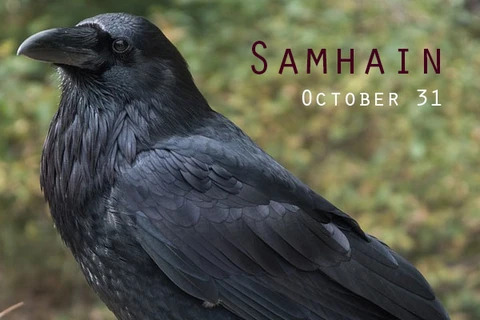
Probably the best-known of the Sabbats, Samhain is celebrated on October 31st. It coincides with Halloween or All Hallows Eve. Halloween is a time when even non-magickal people indulge in spooky activities and ancient superstitions. It's also the time when mainstream culture pays the most attention to the activities of Witches and Pagans.
The word Samhain comes from the Irish Gaelic word for “summer’s end.” The days have become shorter, and the darker half of the solar year is upon us. At this time, farmers would use up the remaining stores of perishable fruits and vegetables, preserving other foods to sustain them through the cold and dark season. They would also slaughter any livestock that they did not plan to feed through the winter. This is why we sometimes refer to Samhain as the Third Harvest, or Blood Harvest.
At Samhain, many people believe the boundary between the words is at its thinnest. Samhain is also known as Ancestor’s Night or the Feast of the Dead. For most Witches, Samhain is the best time to commune with the beloved dead (ancestors and honored spirits). Some also believe that lonely or angry spirits may wander the Earth on Samhain night, looking for humans to annoy.
How Pagans celebrate: For Pagans, Samhain is the beginning of the new year. It is a holiday of reflection and celebration. At Samhain, we cast off the old year’s attachments and turn our attention to the coming scarcity of winter. We feast on the last of summer’s bounty. We contemplate what is worth saving and nurturing during the dark of winter. We try to make friends with Death.
Pagans celebrate Samhain in many of the same ways muggles do: Scarfing down sweets, carving jack-o-lanterns, dressing up in costumes. We decorate with skulls and spiders and go to haunted houses. All of these Halloween traditions are too fun to miss out on—and besides, most of them have their roots in old Pagan beliefs, anyway.
If you’re invited to a Samhain ritual, you may see an ancestor altar. This is a shared altar where participants are invited to pile on their mementos and offerings for the dead. The presiding priest or priestess may invoke a deity who rules over transitions or the migration of souls—Morrighan, Hecate, or Hermes. You may participate in a meditation where you travel into the depths of the underworld, or look departed friends in the eye once more. People will speak the names of loved ones who died during the previous year, or long ago.
Feasting is a component of many Samhain rituals. When we eat sweets, we are savoring the sweetness of life and its impermanence. When we eat meat, we remember that all flesh must die and become nourishment for some creature or another.
We also use food as an offering to the dead—to communicate fond memories, to pay our respects—and perhaps, to appease hungry ghosts. Some Pagans set an extra plate at the Samhain table for spirit visitors. Another contemporary Pagan custom is the “dumb supper”—a silent meal where we invite our ancestors (both known and unknown) to come and dine with us.
Yule

Yule is the Pagan name for the Winter Solstice, the longest night of the year. In the Northern Hemisphere, it falls on or around December 21.
After the winter solstice, the darkest part of the year is over and the days begin increasing in length. This solar holiday is related historically to Christmas—Pagans delight in pointing out that Christians co-opted the date around the third century CE.
In the overarching neo-Pagan mythos, Yule is the birthday of the divine infant who is conceived in the spring. The dark of midwinter is the period of the Goddess’s confinement and labor as she prepares to welcome the solar child. On the longest night, the Sun God is born to the praise and gratitude of all Earth’s creatures.
How Pagans celebrate:
Yuletide is a time for passive, personal magick—for short days of work and long nights of dreaming. We set intentions and incubate our plans. It is a time of preparing mentally and spiritually for the light half of the year. Some Pagans keep a midwinter vigil, awaiting the rebirth of the sun at dawn.
It’s not often that you find large group rituals for Yule—probably because lots of Pagans are busy traveling and visiting with non-Pagan family! Instead, Yule rituals tend toward the home-y and conventional.
We decorate with evergreens and holly. We exchange gifts with friends and family. On Midwinter Eve, we light candles to herald the return of the sun. (The ambitious among us may set a Yule log blazing.) We eat traditional, calorie-rich holiday foods: Tamales, eggnog, rum cake, ham, and chocolate. We give thanks for the life-giving energy of our planet’s sun.
Imbolc

Imbolc is a festival of purification and the early signs of spring. Imbolc is celebrated on Feb 1. (Not yet spring in most of the world, to be sure—but sometimes spring-like in Britain due to the warming influence of the Gulf Stream.) It is the first of the three Pagan fertility festivals, followed by Ostara and Beltane.
In Old Irish, Imbolc means “in the belly” and was associated with the onset of the lambing season. It was an obscure Irish folk festival until the 20th century, when neo-Pagans revived it as part of the Wheel of the Year. It coincides with the Christian festival of Candlemas and with that old farmer’s oracle, Groundhog’s Day, both observed on Feb. 2.
For our ancestors, the significance of Imbolc would have been the beginning of the ground thaw. It is the time to prepare for the planting season—to survey the land, take an inventory of tools, and make any repairs or modifications that will be needed. For the Witch, it also a time of preparation. We clean and bless our altars, and make sure that the tools of our practice are attuned to their intended use.
Mythically, Imbolc celebrates the awakening of the Goddess after giving birth to the young God at Yule. In the Earth, we observe the first stirrings of life after the frozen winter. (If you don’t know what a frozen winter looks like, ask your grandmother.) Imbolc brings the energy of creativity and imagination. Projects that were put on hold during the holiday season start to creak into motion again. Our midwinter dreams resolve themselves into their first visible shapes.
How Pagans celebrate:
Imbolc is especially sacred to Brigid—Celtic Goddess of hearthfire, healing, the bardic arts, and smithwork. Many Imbolc rituals honor Brigid with candlelight, poems, and woven ornaments known as Brigid’s crosses. The first light of spring is evident by now, and it is an auspicious time of year for rites of cleansing, healing, and blessing.
Imbolc is a time for spiritual dedication and re-dedication. Some covens—especially women’s covens—initiate new members at Imbolc. For old Pagans, it is also a time to examine and refresh our practice. If we have become lax, Imbolc is an opportunity to purify our intentions and reconnect with spiritual guides. We light candles, open windows, and wash the floors to cast out the last gloom of winter. Some also use Imbolc for divination for the year’s harvest.
Imbolc is not really a feasting holiday, as the season of grains and fruits is months away. The first food of the year is dairy. Butter, milk, and cream are traditional foods for the Imbolc table.
Ostara
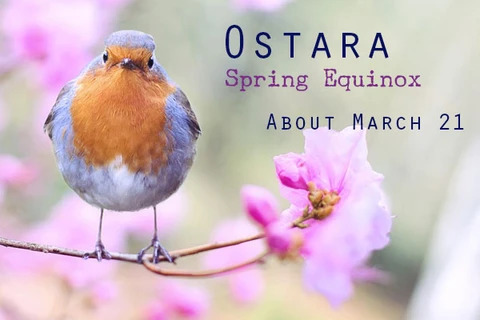
Ostara is the spring equinox, which falls on or about March 21 in the Northern Hemisphere. It is opposite the autumn equinox (which Pagans refer to as Mabon). But any desktop calendar can tell you that. Ostara is the Pagan cousin of the Easter holiday, a modern revival of one or more ancient spring celebrations.
Ostara is the second of three fertility festivals, a time when the blessings of spring become more visible in the natural world. Flowers bloom, the birds and the bees do their thing, and grocery aisles fill up with pastel-colored treats. Ancient fertility symbols like eggs and bunnies are everywhere. (Yep, Ostara is the Sabbat with the rabbit!)
Astronomically speaking, Ostara is a midpoint of the year, and day and night are equal at this time. The Sun God (who has been growing and gathering strength since Yule) is an adolescent. The Great Goddess, who has been getting progressively younger since December 21, is in her maiden form. These two lusty youths are now the same age, and will soon conceive the child who will be born at Yule.
How Pagans celebrate:
The original meaning of Ostara as a fertility festival is not lost on modern Pagans. Ostara provides a perfect opportunity to work magick for love, prosperity, and gains of any kind. We harness the energy of the lengthening days to fuel our desires and bring projects to fruition. We honor the gifts of the earth Goddess, who is presently blessing the land with beauty and nourishment.
Pagans also use Ostara as a time to reflect on the principle of balance. Everyone has goals and responsibilities—work, family, art, spirituality—that compete for our time and attention. At Ostara, we take a moment to notice things that may have shifted out of balance. We reset our priorities as the austerity of winter gives way to the exuberance of spring.
Beltane

Beltane is the ancient name for the May Day rite, held on May 1. Originally a fire festival, it was widely celebrated in pre-Christian Ireland and Scotland. The name comes from the god Bel (“the bright one”) and means “Bel’s fire.” It is the second of two principle festivals on the Celtic Pagan calendar, the other one being Samhain. Samhain and Beltane are the two poles of the magickal year, when the gates to Faery and the spirit world are most open to travelers.
In traditional Wicca, Beltane is a sexual festival, the last of the three fertility festivals. It is the time when the Maiden Goddess takes a lover in the form of the young God. Wiccans enact this drama through the ritual marriage (Great Rite) of a High Priestess and High Priest, whose union will bless the land.
How Pagans celebrate:
Theoretically, Beltane is an occasion of unbridled sensuality and revelry. However, sexual rites are rare in modern covens. If invited to a Beltane ritual, you’re far more likely to dance around a maypole or witness a symbolic Great Rite (with a chalice and athame) than encounter an orgy.
For the social Pagan, Beltane season abounds with bonfires, festivals, concerts, and campouts. Solitary Pagans might celebrate by making an altar to the young God and Goddess or connecting with a lover. Flowers, honey, sweets and wine on the altar echo the sweetness of the occasion. Beltane is also a time for illusion, seduction, and Faery tricks. By the light of the Beltane fire, the real can become unreal (and vice versa).
Since Beltane celebrates the union of the God and Goddess, it is a popular time for proposals, handfastings, and renewing of vows. Magickally, the combined masculine and feminine energies lend a powerful alchemical surge to almost any type of spellwork.
Litha
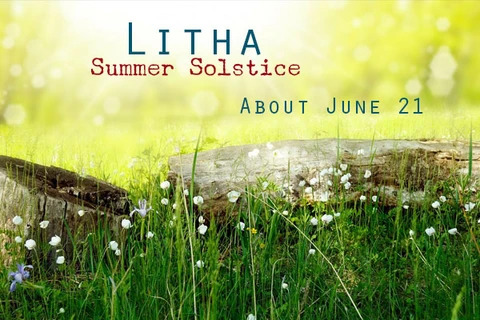
Litha is the summer solstice, which in the Northern Hemisphere falls on or about June 21. Linguists disagree about the origin of the Sabbat’s name, but summer festivals were common across pre-Christian Europe. People lit bonfires to keep the sun’s light alive for as long as possible. Solstice revels were supposed to bless the crops in the fields and drive away evil spirits.
Litha is the day when the Sun God is at the peak of his power. It is an auspicious day, ruled by the Sun and the element of Fire. After Litha, the nights will begin to grow longer and the Sun will move further away each day. With the fall harvest imminent, Litha is an opportunity for anticipating the (actual or symbolic) crop. Medieval people believed that Midsummer Night was blessed, and that whatever a person dreamed on this night would come true.
How Pagans celebrate:
Outdoor rituals are common at Litha, as Pagans take advantage of the long hours of daylight. It is a joyful Sabbat. Bonfires and summer games brighten the space between earth and sky. We decorate our altars with solar symbols, and honor the God in his aspect as Father.
Litha is an appropriate time for all magick ruled by the Sun. This includes spells of cleansing, protection, charisma, and truth.
Lammas
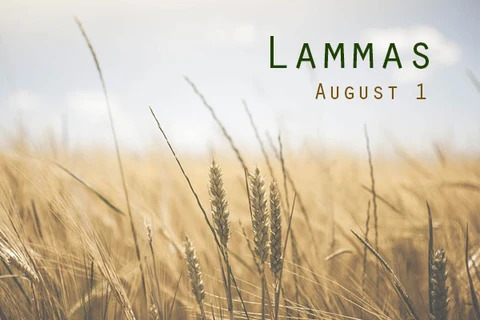
Lammas is the first harvest festival on the Pagan calendar, observed on or about August 1. It is related to an old agricultural holiday celebrating the reaping of grain. Lammas probably comes from the Old English words for “loaf mass.” Loaves of freshly baked bread would have been prepared from the first grain and blessed in churches around the countryside. Lammas is also called Lughnasadh, after the Celtic sun God, Lugh.
As the summer stretches on and the days grow shorter, the sun God symbolically loses some of his strength. He is not yet dead, but is aware that the dark season will soon approach. The god of summer “dies” in the fields to nourish the people, and prepares for rebirth at Yule.
How Pagans celebrate:
Lammas is a time to welcome the harvest. We give thanks that the year’s work is proceeding as planned, and that we will soon enjoy the fruits of our labor. Grain is the traditional food for the Lammas table, in the form of wheat, barley, beers and ales.
Celtic Pagans celebrate Lammas/Lughnasadh as the feast of Lugh, an agricultural god—but also a patron of poets, musicians, and craftspeople. At Lammas, we may show off the skills we have acquired and trade them for things we will need. It is a traditional time of year for craft fairs and local markets.
Mabon

Mabon is the autumn equinox (or as us Texans call, it “fawwwl”). In the Northern Hemisphere, it falls around Sept 21. Mabon is the pivot point of the solar year when the days begin to shorten and winter is on its way. (The name of the festival is modern and dates from the 1960s or early 1970s.)
Mabon may also be called the Second Harvest, because it is the time when autumn fruits and nuts reach their maturity. It is a time to contemplate what we have worked for in the previous year and what rewards we are ready to reap. We give thanks to the waning sunlight and prepare to store our wealth away for the scarce season. We shift from active to contemplative magick. Mabon season is a fine time for workings of prosperity, gratitude, security, and balance.
How Pagans celebrate:
Mabon is a time for celebration after the hard work of the harvest. Though it is sad to watch the beauty of the growing season fade away, we revel in the mild weather and rest that autumn brings.
Mabon foods are comfort foods, those that evoke fond memories and connect us through sharing. We bake and brew, pickle and can. Offerings of wine, cider, fruits, and boughs may adorn the Mabon table—along with that most Pagan of centerpieces, the Cornucopia.
On the Pagan religious calendar, Mabon represents the turning point to the dark half of the year. We shift our attention from the youthful merriment of the summer Sabbats. At Mabon, we honor the Crone and Sage deities, the cycles of aging and death, and the spirit world.
Mabon is a popular time for large outdoor rituals—in part because the weather is good and it doesn’t conflict with any major mainstream holidays. We gather together to feast and express gratitude for our lovely tilted planet. Many cities host a public Mabon ritual as part of their annual Pagan Pride Day gatherings. Solitary Pagans might celebrate Mabon with offerings at a home altar, or a contemplative walk in the woods.
https://www.groveandgrotto.com/blogs/articles/the-eight-sabbats-witchs-holidays
4 notes
·
View notes
Text
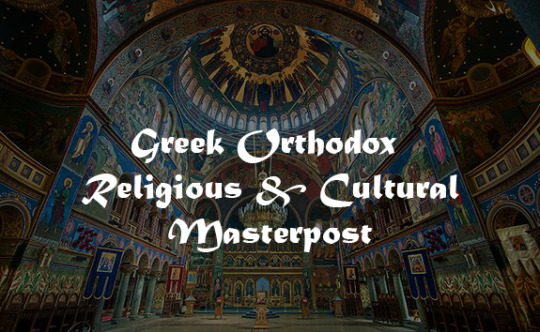
This post is based on my knowledge of traditions of the north and center mainland of Greece. However, I am pretty sure most of those things apply to Greek Orthodox people universally. Needless to say, each village and town can has its own local traditions when it comes to religious occasions.
I am a Greek Orthodox living in Greece, raised into the religion.
I will translate some phrases directly, hoping to give a more “raw” meaning.
If you are not sure you understood about certain information in the post, feel free to ask me on Tumblr!
Google Drive Link for the post in .docx format
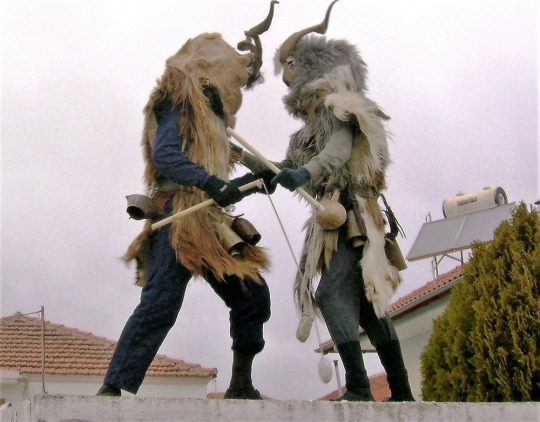
Table of Contents
Philosophy.
The Church as a building and as a center of faith.
Chapels and even smaller churches.
The Communion.
Livanisma / Thimiama – Incense burning.
Home Altars.
Clothing.
Komboskini - The prayer rope.
Tama - Votive
Crosses in high places.
Wedding
Baptism
Wedding & Baptism.
Burial customs and honoring the dead.
Agiasmos - Blessing.
Protomaya.
Martis - The protective bracelet of Spring.
Easter Traditions.
Vasilopita on Christmas
Kalanda
Mount Athos
Pilgrimage to Tinos
The Catching of the Cross
More customs
Random Information
1. Philosophy
Love and Forgiveness are the main pillars of the faith. Some people follow the Bible to the letter, others pick the parts that think reflect our age and most of people keep the general message of the teachings. The Holy Texts are interpreted differently by different people and there can be contradictions in lifestyles and believes. However, the notion that having love and forgiving is what makes you a Christian is widely believed.
Anyone who does not love does not know God, because God is love. - 1 John 4:8
Love is patient, love is kind. It does not envy, it does not boast, it is not proud. It does not dishonor others, it is not self-seeking, it is not easily angered, it keeps no record of wrongs.- 1 Corinthians 13:4-5
There is no fear in love, but perfect love casts out fear. For fear has to do with punishment, and whoever fears has not been perfected in love. - 1 John 4:18
Don’t say ‘I am hated, and that’s why I do not love‘. For this is why you out to love the most. - Ioannis Chrysostomos
“But I say to you who hear, Love your enemies, do good to those who hate you” Luke 6:27
“Do not judge, and you will not be judged. Do not condemn, and you will not be condemned. Forgive, and you will be forgiven.” - Luke 6:37
"Then Peter came to Jesus and asked, 'Lord, how many times shall I forgive my brother or sister who sins against me? Up to seven times?' Jesus answered, 'I tell you, not seven times, but seventy-seven times.' " - Matthew 18:21-22
2. The Church as a building and as a center of faith
Jesus and the Apostles gave us some directions for the worship but most of practices, as well as the architecture of worship came from the Greeks themselves. I jokingly say that Greeks are low key pagans, because religion didn't change the culture. (It did, but only a bit). Christians first worshipped inside the old temples of the Hellenic gods (the Parthenon was once the temple of Virgin Mary) and they built their first churches in that style. The architecture changed with time but it still carries the mark of ancient temples.
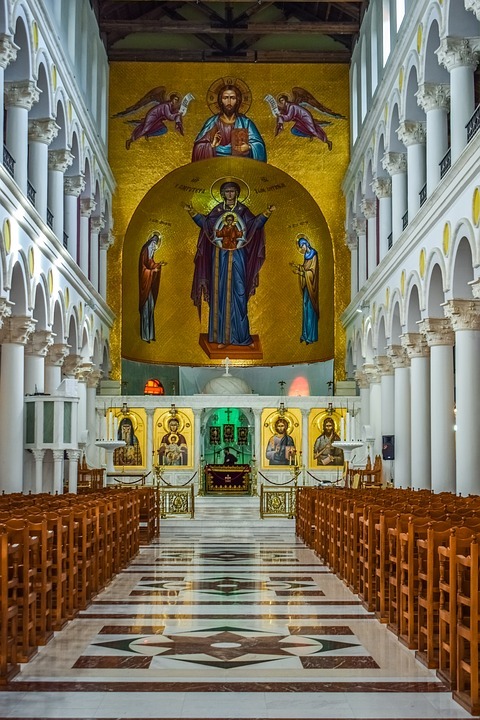
Agios Demetrios Thessalonikis
In this link you can view the different styles of architecture for Greek Orthodox Churches. (Link)
In Orthodox churches you don't have to have a feeling of the dominance of God, like in the Catholic or protestant churches, but a feeling of warmth and belonging. In the hall you can buy a candle to light on a display of candles in the hall, to get a blessing for yourself and the soul of anyone you want. Nobody supervises you there.
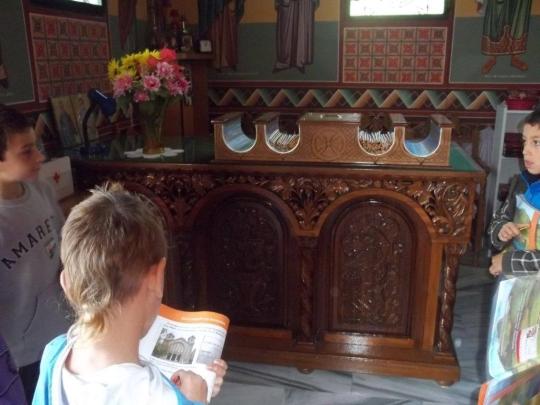

You can also not pay but I haven't seen anyone not giving money, so far. After that you kiss all the icons displayed in the hall and cross yourself.
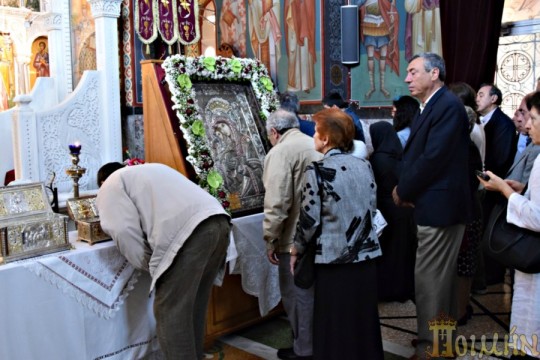
As you enter church, men on the left side, women on the right. There is also a special place for women, an interior balcony which is really cool and women go there if they want to. Nowadays man and women can go there.

3. Chapels and even smaller churches
Chapels serve the same purpose as churches but liturgies rarely happen in them. You can get married in them sometimes.
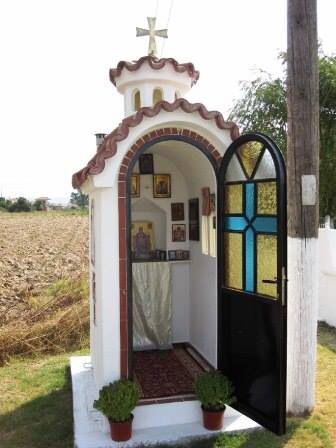
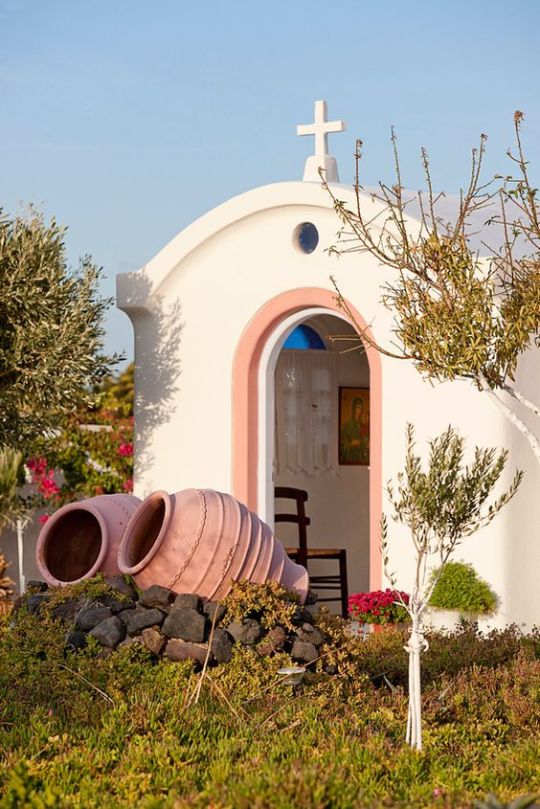
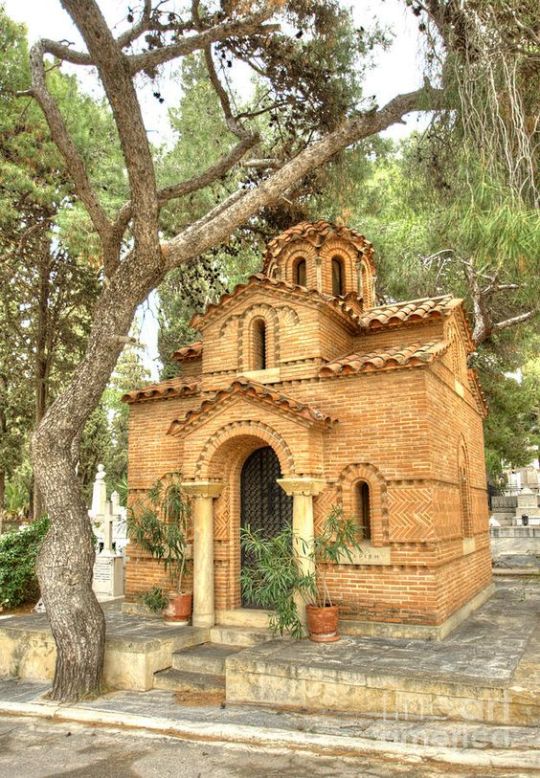
They can be carved in stone or into a cave - even in a tree or in between multiple trees.

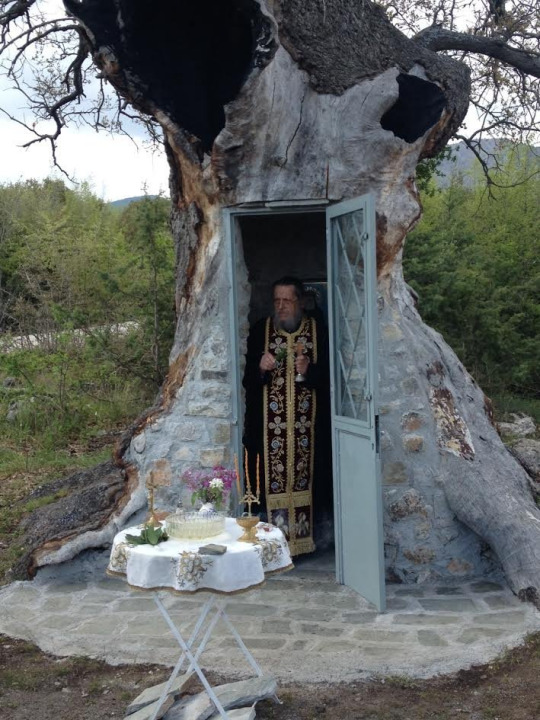

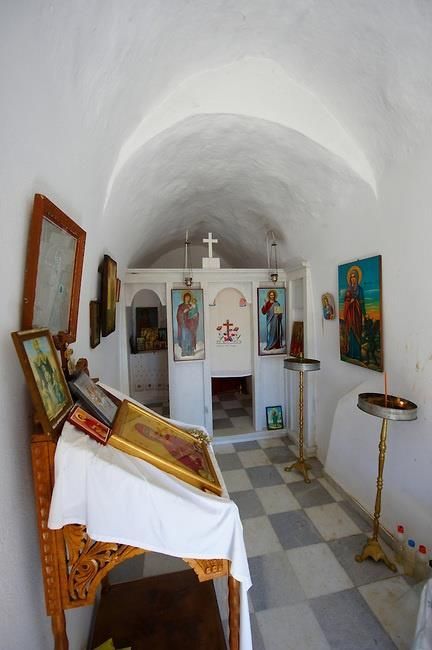
The also exist in big hospitals to bless the patients and invite people to pray for their sick.
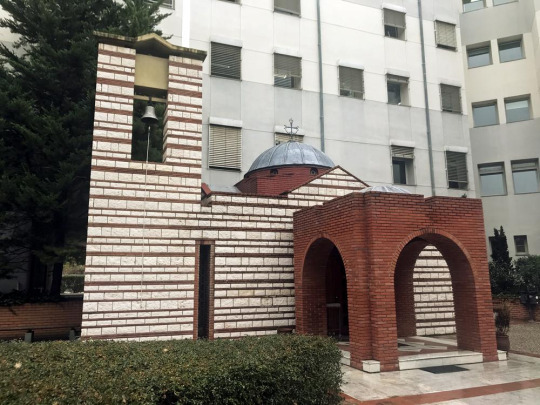
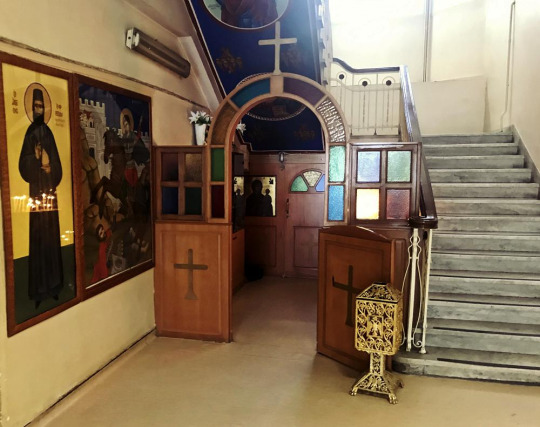
They can be seen in some big hotels, too!
But the churches can become even smaller!
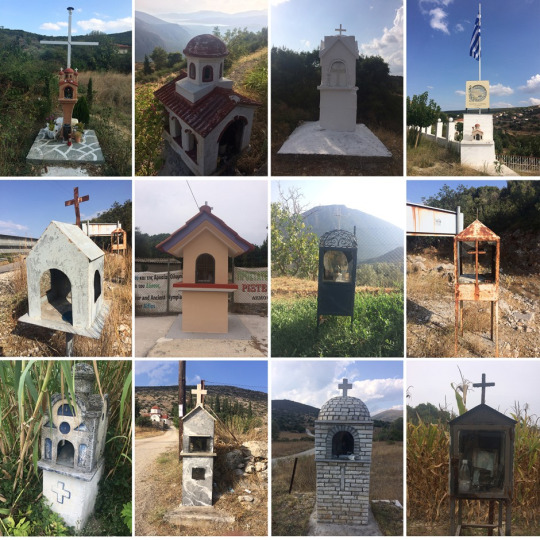
Traveling the roads of Greece you will see dollhouse-sized roadside chapels. Some are elaborate little things made of terracotta or even marble, plonked in the middle of nowhere, high up in the mountains; no village or houses for miles, and yet impossibly, most of them are faithfully maintained with a candle always burning inside.
There’s a number of reasons for these heartfelt shrines, some as old as the roads themselves. Placed by the roadside, an initial assumption is that they’re built to remember a victim of a traffic accident victim, and sometimes this is exactly the case. But just as often, shrines will be built by survivors of accidents, thanking a saint at the location of their ordeal.
They can be found in home yards of people who want to come closer to God
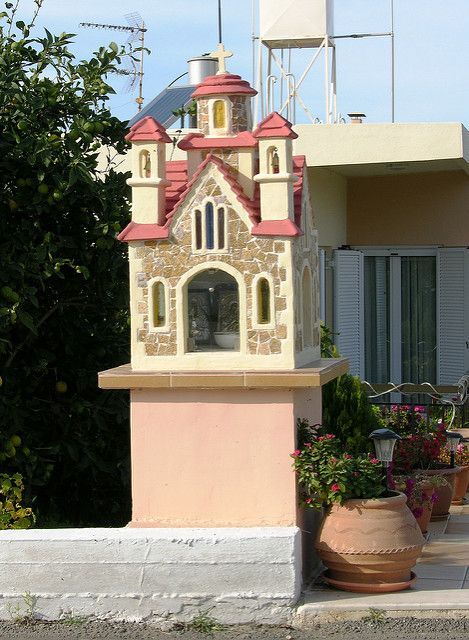
4. The Communion
We all take part in Communion with the same spoon. The Communion has bread crumbs in. Even babies drink a tiny bit of the wine (blood of Christ). Traditionally you were "unpure" if you had your period - others believed the blood of Christ would come out of you as period blood if you drunk it, so generally getting the communion during your period is a no for many.

5. Livanisma / Thimiama – Incense burning

Today, Orthodox Christians use incense throughout the church services. The priest “censes” certain areas at certain parts of the liturgy. The incense is placed inside a device known as a “censor”, which is fairly ornate in appearance and has bells on it so that we not only smell the fragrance, but hear the jingling sound as the priest uses it. This action is meant to remind us that are prayers are rising to the heavens to be heard by God.

Typically in the Orthodox Church, dried incense cones are used. In order to provide the heat needed to allow the cones to burn, a special type of charcoal is used. You also may burn resin, such as Frankincense or Myrrh, directly in an incense burner using charcoal without taking the extra step of mixing it with a binding agent.
Churches often get their incense from special suppliers and maybe even monasteries where the monks or nuns make their own. Typical scents that are used include Frankincense, Myrrh, and Rose.
The believers can also burn incense in their homes and say prayers to ward of Evil.
6. Home Altars
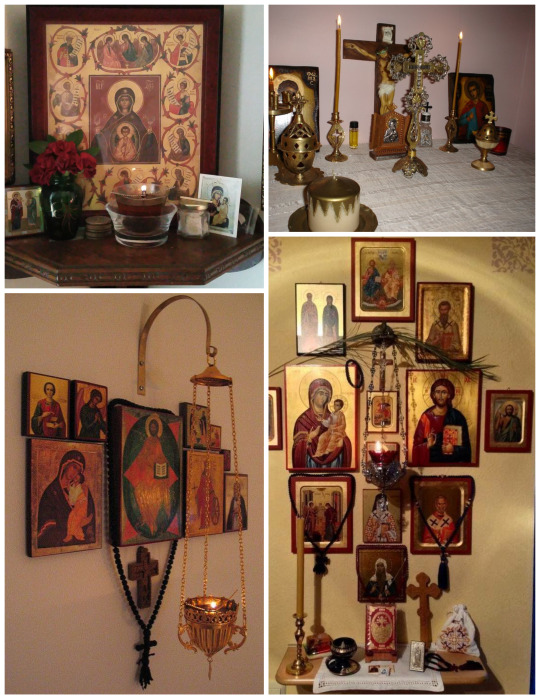
An Orthodox Christian is expected to pray (to be connected with God) constantly. According to Bishop Kallistos Ware, "In Orthodox spirituality, [there is] no separation between liturgy and private devotion." Thus the house, just like the Temple (church building), is considered to be a consecrated place, and the center of worship in the house is the icon corner.
An icon corner is normally oriented to face east. It is often located in a corner to eliminate worldly distractions and allow prayer to be more concentrated. Here is where the icons that the family owns should be located, normally including at least icons of Christ, the Virgin Mary, and the Patron Saint(s) of the family.

An oil lamp normally hangs in front of the icons. The careful trimming of the lamp to keep it burning at all times is interpreted as symbolic of the attentive daily care faithful Christians should take over their souls. Relics of saints (if the family possesses any) and a Gospel Book and a blessing cross would be kept there, as well as incense, holy water, palms and pussywillow from Palm Sunday, candles from Pascha (Easter), and other sacred items, as well as a personal Commemoration Book (containing the names of family and loved ones, both living and departed, to be remembered in prayer).
7. Clothing
People should enter the church in modest attire. No shorts and no short skirts. Women don’t need to cover their head. In fact, almost no woman under 80 covers her head in church.
With special occasions being the exception, Greek Orthodox Priests wear a black himation because of the fall of Constantinople. They wear it all the time, even to grocery shopping. They have long hair and beard. In rare cases you will see women dressed with a long black cloth - something like a burqa but the whole face is uncovered. They are nuns or devoted to Christ.
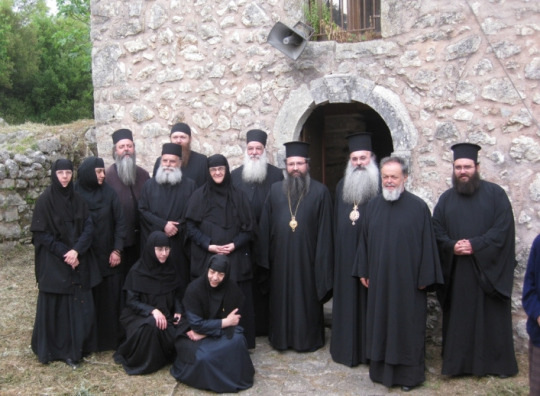
8. Komboskini - The prayer rope
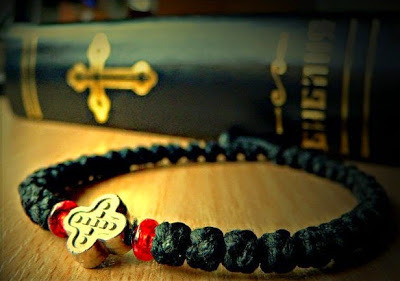
The prayer rope, known in Greek as a κομποσκίνι (komboskini), has long been a powerful weapon for the Orthodox Christian. It has a very simple design, but is filled with meaning. The rope typically comes in one of three lengths, 33 knots, 50 knots, or 100 knots, though there are some in use which are as long as 500 knots. The 33 knots of the shorter rope symbolize the 33 years Christ spent on earth.
It is used in conjunction with the Prayer of the Heart. On each knot is said, "Lord Jesus Christ, Son of God, have mercy on me, a sinner." This prayer is occasionally shortened to, "Lord Jesus Christ, have mercy on me," and other prayers are sometimes said, such as, "God be merciful to me a sinner." Prostrations can also be made with each prayer or after a certain number of prayers. By carrying a prayer rope on us discreetly, we are reminded to “pray without ceasing”.

The prayer rope is attributed to St. Pachomius (4th century). The devil would untie the simple knots he would make to count his prayers. Inspired by a vision from an angel of God, St. Pachomius was able to create a special knot composed of nine interconnected crosses (representing the nine angelic classes), that the devil was unable to untie.
9. Tama - Votive
Tama is a form of votive offering or ex-voto used in the Eastern Orthodox Churches, particularly the Greek Orthodox Church. Tamata are usually small metal plaques, which may be of base or precious metal, usually with an embossed image symbolizing the subject of prayer for which the plaque is offered.

The tradition comes from the ancient years, when Greeks offered metal or marble plaques to the gods, often for the cure of an ailment. Eyes may indicate an eye affliction, hands or legs may indicate maladies of the limbs, a pair of wedding crowns may mean a prayer for a happy marriage, etc.
Tama also means Promise. Usually the believers promise something to a saint in exchange for their help on something. My aunt made a tama to the saint Anastasia Farmakolitra ("saves through medicine") to change her name day from the day of the Resurrection to the day of Anastasia Farmakolitra's day if her daughter passed to Pharmaceutical School. Many promise to light big candles (Lambathes) as an offering to the saint or make a donation to their church. Making a lambatha in your height is a standard tama.
10. Crosses in high places
The Greeks want to feel watched over by the Divine but also leave their mark in the area they live. A way to show their devotion is to place big crosses in hills and mountains which overlook their city, town or village.
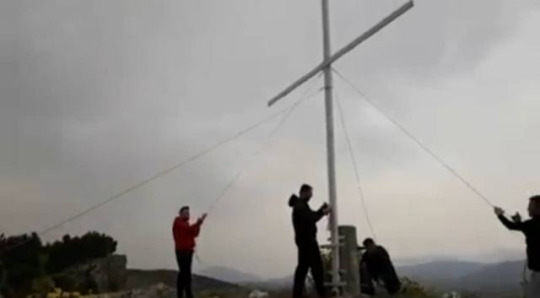
In some cases you find those crosses in high, remote places.

Some crosses light up at night!

11. Wedding
When the priest says "and the woman should fear the man" in a wedding, the bride may step on the groom's foot to show dominance.
In the bride’s shoe sole her unmarried friends write their names. The woman whose name fades first will be the first to marry
The relatives also put money into the shoe of the bride “so it can fit better“ - but really it’s just a gesture to give money to the couple
The Crowning is the highlight and focal point of the Sacrament of Holy matrimony. The priest then takes two wedding crowns (stefana), and blesses the bride and groom in the name of the Father, and the Son, and the Holy Spirit, and then places the crowns upon their heads. The Best Man or Best Woman then interchanges the crowns three times as a witness to the sealing of the union. People keep their stefana in their house and even frame them.
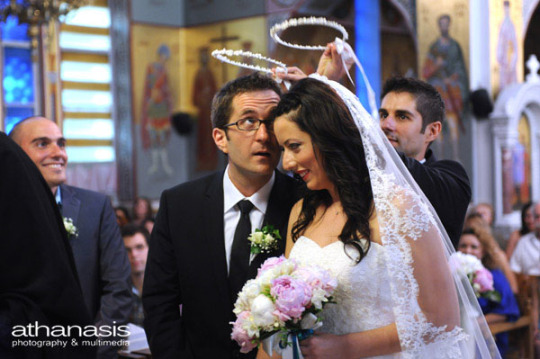
12. Baptism
Greeks take their names from their grandparents (since ancient years) and the name is kept a secret until the baptism.
It is a ceremonial moment because prior to the Christening, the individual is not yet part of the church family. In the church hall the priest asks the person to be christened to renounce Satan. If the individual is an infant, the godparent does it for the child. In the next major part of the ceremony, the person being baptized is immersed in the water three times, which is symbolic of Christ’s birth, death, and resurrection. The person is oiled - so they can be blessed and slip from the hands of Satan - and a tuft from their head is cut - to symbolize new beginnings, devotion to Christ and to give Satan less hair to grab them from. If baptized as an infant, after immersion the child is placed in the arms of the godparent with a white sheet, which symbolizes purity. Then, the child receives the sacrament of Chrismation.
The godparent gifts a golden cross to the baptized and, as long as the baptized is young, they buy them shoes for Christmas and an Easter Candle for Easter.
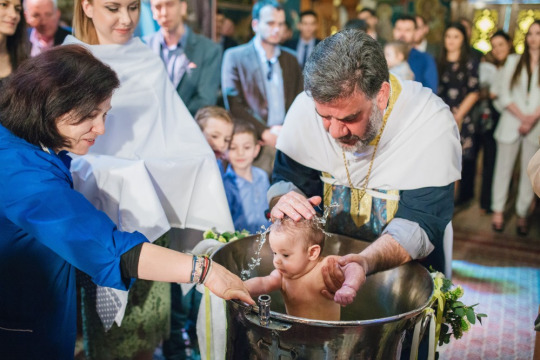
13. Wedding & Baptism
You can do a wedding-baptism to save money. First the marriage, then the baptism. If the child is about to die before a baptism gets arranged - God forbid - they get baptized in the air (and not in water) by a priest.
Koufeta (Sugar Coated Almonds) are mainly served in weddings but also when wedding and baptism happen in the same day. They are placed in little bags in odd numbers and are served on a silver tray. Odd numbers are indivisible, symbolizing how the newlyweds will share everything and remain undivided. Tradition holds that if an unmarried woman puts the almonds under her pillow, she'll dream of her future husband.
After wedding and/or baptism there is - of course - a feast with hundreds of guests.

14. Burial customs and honoring the dead
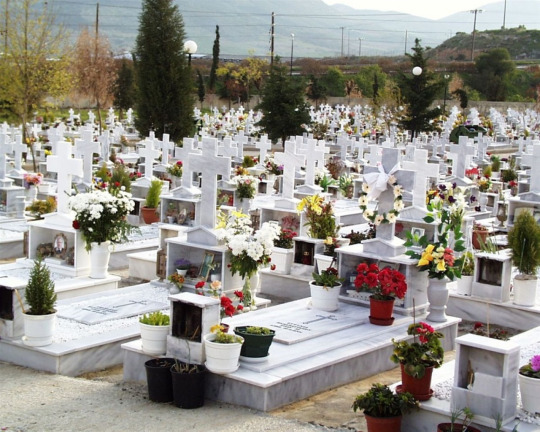
Pouring wine on the graves during the burial, as an offering or to prevent the dead from coming to life. (I am not sure but that is probably wine blessed in the church).
There is a feast after every mystery. Even funerals.There are more feasts for the dead as time passes. You have to do them in 3 days, 9 days and 40 days. You don't have to do all of them but it's showing respect to the dead and most people do them. 3 and 40 days feast are very important. For the 40 days feast - as for the funeral - there are flyers on the area, which invite people. When 1 year and 3 years pass you go to Church and the priest mentions the name of the dead in the blessings and later comes from the grave to chant.
During the Sabbath of Souls you have to bring koliva (wheat) to offer to the dead in the family. Supposedly the dead "feed" from them. So it has to be boiled!
Charon is the one who takes souls in our recent tradition.
Graves stones often have sketched pictures or photos of the deceased on them.
15. Agiasmos - Blessing
The start of the New Year in the tradition of the Orthodox Church is marked with the blessing of homes and businesses with Holy Water, or an Agiasmos (literally, to make blessed). This practice commences immediately following the Feast of the Theophany (the annual celebration and remembrance of the Baptism of Jesus Christ – January 6). This blessing is not something done for good luck or to prevent bad luck, but rather a blessing to help strengthen and protect.
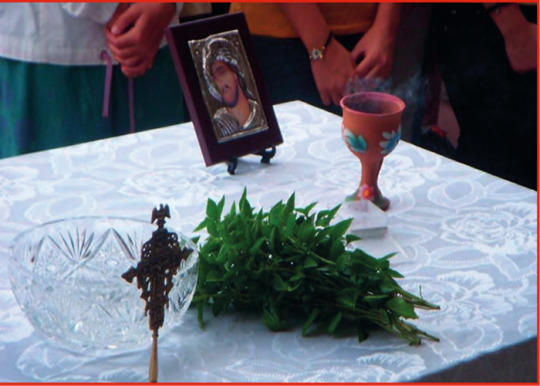
The following items are needed for the ceremony:
Small or medium size bowl, filled halfway with cold tap water
Small twig of fresh basil (floral kind)
Icon displayed behind the bowl
Hand censer, lit and burning incense during the service
The service is also provided in schools when the new school year starts. This is a particular occasion which can be annoying but also fun for the students because... water shower! Please watch this video (Link). I love it because the priest comes too close to the children - sometimes they want to bless too much - and the kids try to avoid getting wet from head to toe!
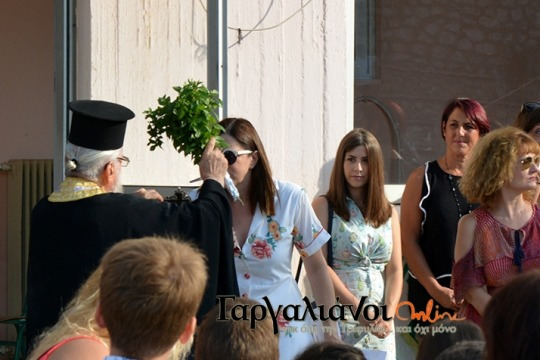
16. Protomaya
May, according to Greek folklore, has two meanings: The good and the bad, rebirth and death. The custom celebrates the final victory of the summer against winter as the victory of the life against death go back at the ancient years and accumulated at the first day of May. This day was also dedicated to the goddess of agriculture Dimitra and her daughter Persephone, who this day emerges from the under world and comes to earth. Her coming to earth from Hades marks the blooming of nature and the birth of summer.
Another ancient celebration that Protomagia has its roots is Anthestiria, a celebration in honor of Dionysos (the Greek God of theater and parties) a festival of souls, plants and flowers, celebrating the rebirth of man and nature.
The custom of May 1st is to decorate the doors of houses with flower wreaths in a way to welcome the power of nature into our home. The wreath is made from various flowers, handpicked and knitted together. In some parts of Asia Minor, people put on each wreath, except flowers, a garlic for the evil eye, a thorn to protect the house from enemies and an ear for good harvest. The wreaths adorn the doors of the houses until the day of St. John the Harvester (June 24) when all the wreaths of the neighborhood are gathered and burnt in a big fire, the fire of the saint.
See my hashtag #protomaya for more
17. Martis - The protective bracelet of Spring

It’s said it’s an ancient tradition dating back to the cults of Demeter and Persephone. Eleusis was the ancient city where the ancients performed secret rites for the cult. As a form of initiation into the cult, which was one of the Eleusinian Mysteries, the faithful wore a bracelet called a “kroki” around both their right hand and left ankle. Amazingly, the ancient tradition still lives on today in modern Greece. However, there are certain rules that one must abide by when creating and wearing the symbolic bracelet which celebrates the arrival of Spring.
Most importantly, the bracelet must be woven on the last day of February and it must be made of white and red thread. The white thread of the bracelet symbolizes purity while the red represents life and passion.
In ancient times, people believed that the bracelet helped protect the person who was wearing it from diseases, as well as the strong rays of the spring sun during the month of March. Today they say it protects from the strong rays but also the cold of March. Since it’s a transitional month you can burn from the sunrays but you also need wood for your fireplace!
Part of the ancient tradition in Greece calls for the person wearing their red and white “Martis” bracelet to take it off and tie it to the first flowering tree they see in March, in order to yield a healthy harvest and to keep the tree healthy.
Another practice with Martis bracelets occurs when the first swallow of the Spring is sighted. The first person who sees a swallow upon the bird’s return from its winter migration, ties their bracelet around the nearest rose bush to encourage the bird to make its nest there.

18. Easter Traditions
Easter is the biggest celebration of the Greek Orthodox tradition. The Holy Week, preceding Easter Sunday, is a time to ponder on Jesus’ Passion and Crucifixion. It is often regarded as an opportunity for body cleansing through fasting, visiting their town of origin and embracing local traditions.
We fast for 40 days (cutting more and more foods every week). Before the fasting we have Tsiknopempti when we eat as much meat as we want, to give our body what it needs before cutting it for 40 days. (It's sort of a celebration and people go out). University restaurants and private restaurants always have fasting options this period. The first day of the fasting is called Clean Monday and it's also like a celebration. It’s the first day we start eating “fasting” food and we also fly kites!
Kyra Sarakosti - Lady Lent

She can be made out of paper or dough. Lady Lent has seven feet. They represent the seven weeks of Lent. Each passing week, on each Saturday, children get to break off one foot. This is a great visual way to countdown the weeks until Easter.
Lady Lent has no mouth. The missing mouth symbolizes fasting. No consumption of meat, dairy products or eggs. She has no ears, this means that she refuses to listen to gossip. Her cross represents the easter religious services in the church, her hands are folded for prayer.
After the last foot is cut off, it is tradition to place this foot in a bowl with fruits and nuts and whoever finds it receives a special blessing.
You don't have to fast if you don't want to. Fasting from bad thoughts and words is equally - if not more important - than food fasting.
Epitaphios threnos (funerary lamentation) is the name of the matins of Holy Saturday, served in Good Friday evening. Within a liturgical context, this is also the name of an icon, usually made of cloth and richly embroidered, depicting the body of Christ being laid in the grave, often by the Virgin Mary and some disciples.
On Good Friday morning, the icon is placed on a platform, resembling a bier, typically topped with an elaborately carved wood canopy. In most cases, the canopy is heavily decorated with ornate flower arrangements, ribbons and sometimes candles. Young girls (the "virgins") have to adorn it with flowers.
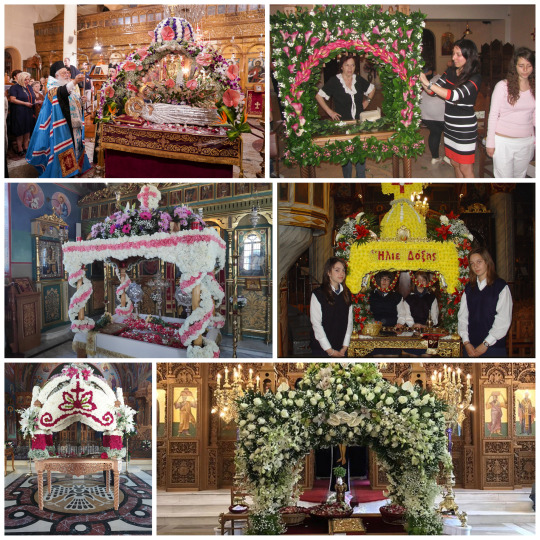
Throughout the day, people can come into the church and venerate it. Kids have to pass under the platform in order to take a blessing.
In the evening the service begins; near the end of the ceremony, the canopied platform bearing the icon is lifted on the shoulders of priests or churchgoers (usually four to six people) and carried through the streets followed by the believers.

In towns with more than one parish, the processions starting from different churches may converge to a single spot (usually the town square), where they temporarily stop and a common hymn is sung before they resume their routes. In large towns, the chants are often performed by a marching band.
The epitaphs in the Central Square of Larissa (Short Video)
These practices have numerous variations according to regional traditions. On the island of Zakynthos in the Ionian, instead of an embroidered cloth, a lamb is used: this is a figure of the dead body of Christ, cut out from board and painted from both sides, placed vertically so that it can be seen from either side of the bier. Another famous custom, the “burning of Judas”, where an effigy of Judas is set aflame on a bonfire, is usually regarded as an Easter Sunday ritual; in some parts of Thrace and Macedonia, however, it takes place on Good Friday, after the procession. In some coastal towns, most notably on the islands of Hydra and Tinos, the men carrying the Epitaphios march right into the sea, until they are at least waist-deep in water, where they may remain for several minutes, often holding the platform high to protect it. During this time, prayers are said for the welfare and safe return of the many seafarers coming from those communities.
Watch footage from the Epitaphios procession in Kaminia, Hydra (Short Video Link)
Τhe flowers used for the adorning of the Epitaphios are considered blessed and women used to put them under their pillow for protection or to dream their future husband, or to put them in talismen for their beloved or use them as medicine, or they put them in the home altar.
On 00:01 on Easter Sunday the priests happily chant "Christ has risen from the dead!" in one of the most known and iconic chants in Greek Orthodoxy. There are fireworks and we kiss each other on the cheek having this exchange: - Christ has risen! - True! This exchange is used by many as a greeting for 40 days after the resurrection. In the Resurrection the priest offers the Holy Light and people go to get it and pass it to their own company or anyone else who asks for it. The candle is held in candles you buy yourself but for children their god parents buy them. With the smoke of this fire you make a cross above your door and you don't clean it up - never. A door can have multiple black crosses above it. With the Holy Light you light up the lamps of your home altar. Some people have breaking eggs contests right after the announcement of the Resurrection, others do them when they come home. We also eat a special soup that night called Magiritsa. It has meat so with this we cut our feast. When the morning comes we host family gatherings and eat as much meat as we want.
19. Vasilopita on Christmas
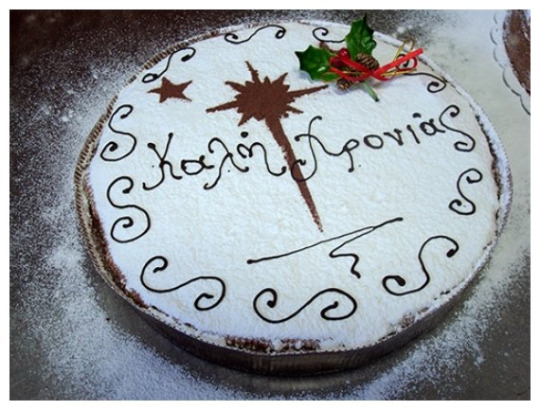
The Greek word Vasilopita is directly translated as “Sweet Bread of Basil”. When the Vasilopita is prepared, a coin is baked into the ingredients. When the observance begins, usually on New Years Day, the bread is traditionally cut by the senior member of the family, and the individual who receives the portion of the Pita which contains the coin is considered Blessed for the New Year.
Vasilopita is also cut in educational institues and the workplace. Whoever finds the coin usually receives a gift.
This age old tradition commenced in the fourth century, when Saint Basil the Great, who was a bishop, wanted to distribute money to the poor in his Diocese. He wanted to preserve their dignity, so as not to look like charity, he commissioned some women to bake sweetened bread, in which he arranged to place gold coins. Thus the families in cutting the bread to nourish themselves, were pleasantly surprised to find the coins.
20. Kalanda

Caroling (kalanda) has roots in ancient Greece. Children would carry small boats and sing songs honoring Dionysius. In Ancient Greece the children would praise the head of the household. At this time in history they would also gift the head of the household with an olive branch, which signified prosperity. Greek Christmas carols date back to the Byzantine times.
After singing for the household, the children receive money (and sometimes sweets). Before the financial crisis one could gather hundreds of euros from Kalanda.
Children say Kalanda on Christmas Eve, on New Years Eve, on Epiphany Even and Lazaros Sabbath. The songs are different for those four occasions.
21. Mount Athos
Mount Athos is a mountain and peninsula in northeastern Greece and an important centre of Eastern Orthodox monasticism. It is governed as an autonomous polity within the Hellenic Republic. Mount Athos is home to 20 monasteries. It’s commonly referred to as Agion Oros (Άγιον Όρος, 'Holy Mountain').
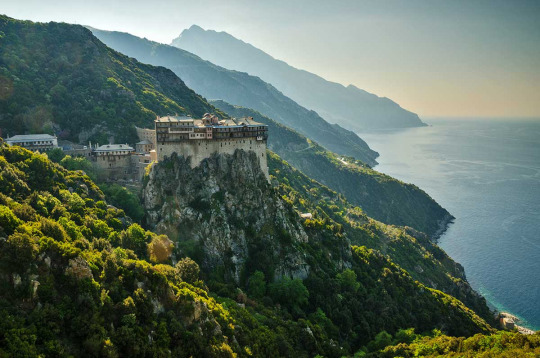
According to the Athonite tradition, the Virgin Mary was sailing accompanied by St John the Evangelist from Joppa to Cyprus to visit Lazarus. When the ship was blown off course to then-pagan Athos, it was forced to anchor near the port of Klement, close to the present monastery of Iviron. The Virgin walked ashore and, overwhelmed by the wonderful and wild natural beauty of the mountain, she blessed it and asked her Son for it to be her garden. From that moment the mountain was consecrated as the garden of the Mother of God and was out of bounds to all other women.
22. Pilgrimage to Tinos

15 August is a national holiday in Greece and sees a mass departure from the cities to the islands and holiday homes in the mainland. However one island in particular witnesses more activity than most; the island of Tinos. Across Tinos are churches and shrines, the most famous of which is Panagia Evangelistria, the most holy church in Greece which houses the ‘Miraculous Icon of Virgin Mary’. In the Greek Orthodox religion, the Icon is considered to be the protector of all of Greece.
In the Orthodox Church the 15th is ‘Virgin Mary Assumption Day’ where the Virgin is believed to have ascended to heaven. The ritual of travelling to pay homage to such a sacred Icon at this time is highly emotional for Pilgrims, with the Holy Icon in Tinos serving as a main passage between the Virgin and the believers who seek comfort and miracles on their trip.

Often pilgrims crawl to the church from the boats that they arrive on on their hands and knees to show their devotion and pray for compassion, good health and healing. The final part of the pilgrimage often happens in the blazing heat which makes the effort even more momentous.
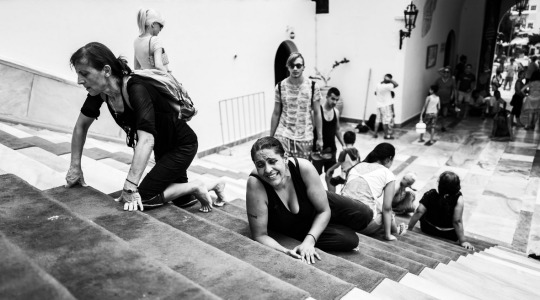
The atmosphere at and around the Church in the days proceeding the event is sincere and intense. Other pilgrims will arrive at Tinos the night before and sleep in front of the Church to ensure they have the opportunity to see and pray to the Holy Icon.
On the day itself the Holy Icon is carried through the streets of Tinos by members of the Greek army and navy, followed by the Greek Orthodox priests, political figures and the public. The procession leads down to the port when the Icon is stationed on a marble podium and speeches are made. The desire of members of the public to touch the icon often leads to a frenetic atmosphere as pilgrims try to touch the Icon itself. After the procession and speeches the Holy Icon is returned to the Church.
__________________________________________
In the same day Epitaphs of the Virgin Mary are honored and are taken to the streets so everyone can pay their respects.
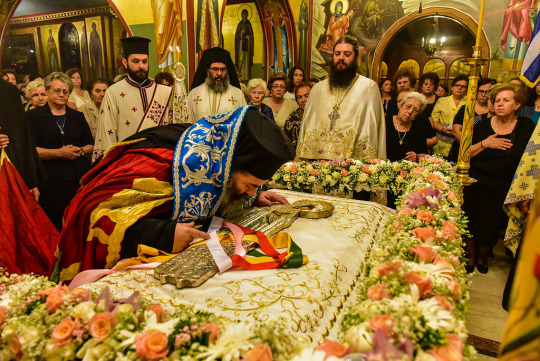
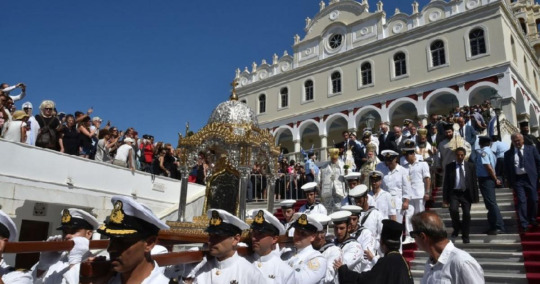
23. The Catching of the Cross
On the sixth of January, the Christmas holidays in Greece officially come to an end with the ‘festival of light’ (‘ton foton’ in Greek), also known as Epiphany.
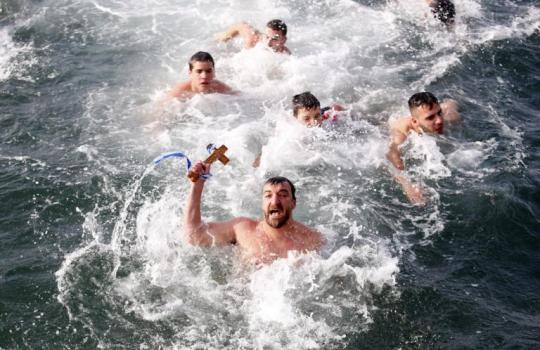
In the Greek Orthodox Church, Epiphany is celebrated as the revelation of Christ as the messiah and second person of the trinity, at his baptism, by John the Baptist, in the River Jordan.
Another cause for celebration in the Greek Orthodox Church on this day is that Christ’s baptism was only one of two occasions when all three persons of the trinity revealed themselves, at the same time, to humanity:
God the Father, speaking from the clouds, God the Son, being baptized in the River Jordan, and God the Holy Spirit, revealed as a dove, descending from heaven.
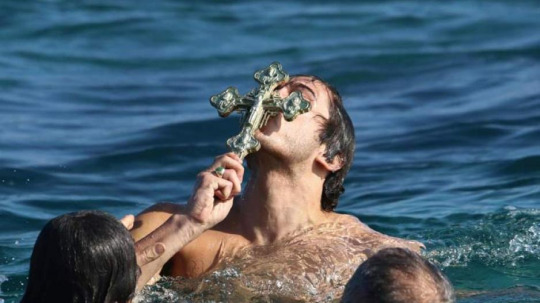
On Epiphany, the Greek Orthodox Church performs
the ‘Great Blessing of the Waters’.
This ceremony is usually performed twice, once on the eve of Epiphany which is performed in the church, and then again on the actual day outdoors with priests blessing large bodies of water, sea, rivers, lakes etc.
The tradition is that
a priest, surrounded by brave young men and boys, throws a cross into the sea, either from the harbour or from a boat at sea; the minute the cross leaves the priest’s hand, the divers jump into the freezing water to catch the cross. The lucky one who finds and returns the cross is blessed by the priest. As the cross is victoriously brought back, the priest releases a white dove, as a symbol of the holy spirit.
This tradition is carried out to commemorate the baptism of Christ and to bless the waters.
24. More customs
Each city, town and village is protected by a different saint. When the saint of the area celebrates a fair is organized. There is music, dance and stalls where the peddlers sell their merchandise.


But Greeks know that some of their customs are not approved by the church. We do it anyways and sometimes the priests join, too!
Το celebrate the Epiphany and chase away the evil spirits some residents dress up in scary attire and make a lot of noise with their voice and bells. They drink excessively, they dance and even fight with each other “to the death“ (it’s fake, don’t worry!). This custom exists in many areas of Greece, from Thrace to Cyprus. Even though the people who dress up have many names - momogeroi, babougera, ragoutsia etc - they all symbolize the carefree spirit, childish fun and trickery. Don’t get in their way because they will chase you though the village!

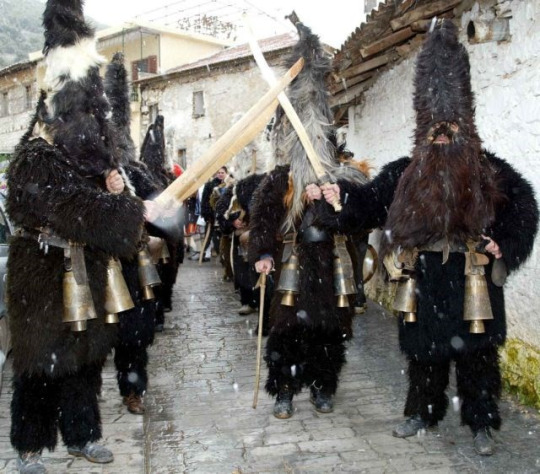
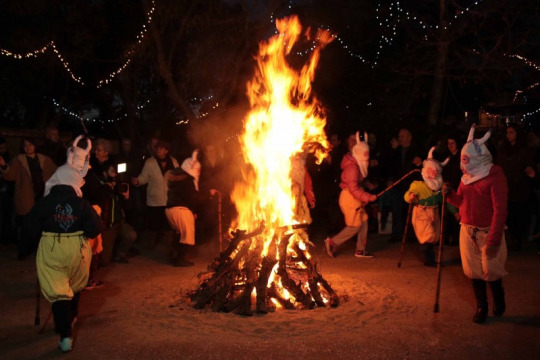
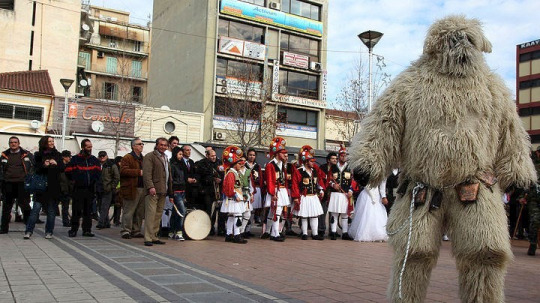
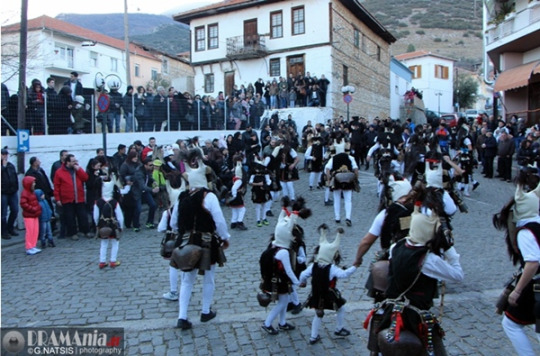

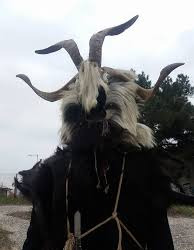
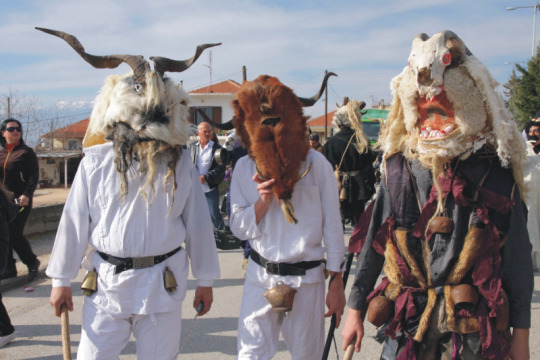

In these festivals there are different characters like the bride, the devil, the cop etc, who can symbolize fertility, the New Year, the Old Year and other concepts.
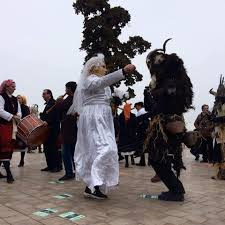

Sometimes the bride (usually played by a man) is abducted and it’s said to be a remnant of a re-enactment of the abduction of the goddess Persephone by Hades.
In other areas the Dionysiac character of the festival is eccentuated by the presence of a man who pretends ot be the god of wine, vegetation, happiness, Dionysos.

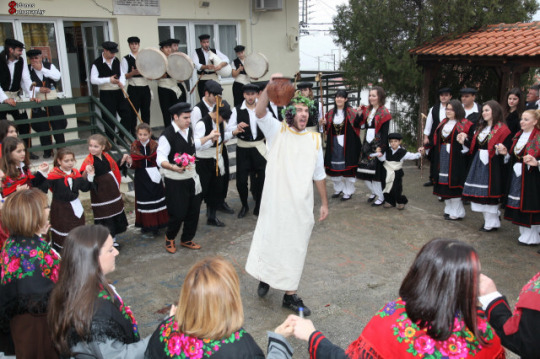
In some areas there is also dancing around a gaitanaki!
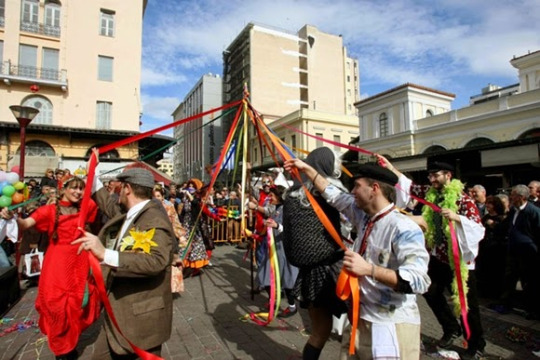
In some areas a fake camel (three people under a cloth) is presented on the streets. It probably started as a spectacle for kids but in some cases today it’s a symbol of resilience and patience. It can also remind us of the magi who rode camels to visit baby Jesus.
There is also the story where a Greek woman is abducted by a Turk and three young men pretend to be a camel to enter the Turk’s wedding with her and steal her back! (Something like the Trojan Horse!)

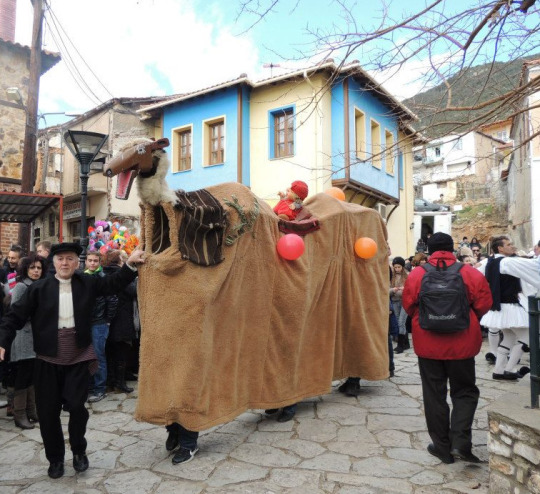
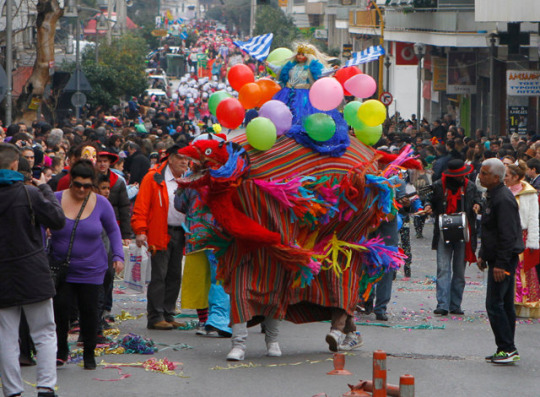
25. Random Information
Namedays are the days when the saint who has your name died. It's said that you actually take your name from them - even if it comes from your grandparents the saint is the reason you have it. In that day you bring treats to your school or work, or you treat your friends to drinks or coffee. People give you wishes ("enjoy your name" is the most common) and they call you on the phone to wish if they are away. The most common name in Greece is Maria and in Maria’s nameday everybody has to call half of their relatives and friends to wish. It’s a bit offensive if someone doesn’t remember your nameday or if they don’t call.
We bring food to the workplace in happy events - like when your child was accepted into a university.
Lots of people cross themselves when they pass outside a church. They could be passing on foot, on the bus, or even when they drive a motorcycle.
You also cross yourself when you call god for protection or when you hear something strange (accompanied with "come Christ and Virgin Mary!")
Making embroidery with the face of Jesus and/or Virgin Mary is a thing.
40 days after the pregnancy women and their newborns can woman can go out of the house but they have to go to Church to be blessed by a priest first.
We say "Christ!" when a person is chocked and "Small healths!" when someone is sneezing. When a baby is yawning bad spirits could come in so we cross their mouth. We also give them eye bendants so the Evil Eye won't get to them. People spit (just saying "ftou ftou ftou") the child after saying good words for them so they can protect them from others who will flatter them with malice. The Evil Eye is recognised by the Church. See more in my #mati tag.
Bell ringing every day before the morning and evening liturgy. It also chimes every hour. On Good Friday it rings solemnly all day.
Priests are considered spiritual leaders by many in the sense they can listen to you and guide you like a psychologist. "My spiritual" people call them.
You don't have to have your mind unguarded, that's why Greek orthodoxy is against yoga which teaches the emptying of mind
Mondays and Wednesdays of all year are for fasting - just meaning you don't eat meat. Some people also fast sexually on those days.
Hatzis- (from middle eastern "hajj") is for people visiting the holy land (Israel) on pilgrimage.
The icons of saints you buy have to be blessed by the Church before you hang them, so they can offer you a connection to the divine.
Every day at school children gather in the yard and one child says the Lord’s Prayer
We don't know the hymns by heart. They are too many and long. But there are books you can read and older people (usually women) usually study them.
All the saints in hagiographies look kinda malnourished because they are supposed to avoid the earthly pleasures.
We give epithets to the saints according to their characteristics - like we did with our ancient gods.
Lots of saints probably “covered” the dominions of older deities because Greeks were used to having smaller powerful entities for different stuff (there is even a saint who helps you find stuff if you dedicate a pie to the church)
We have a set of explanations for dreams (Ονειροκρίτης). For example, if you see something very good in your sleep about a person, misfortune will find them. If you see them dying, they will live for many years.
We read the future in the bottom of the cup of Greek coffee.
From the Byzantine era and today people buy holy wood - from the cross of Christ they say - and bones of saints. In the old time those were also used for witchcraft.If you are born on a Saturday you don't see creatures or ghosts. Also people born on Saturday are lucky and whatever they wish comes true.
Dick festivals are a thing in some areas and they mostly happen on Greek Carnival. Traditional sex songs with dances are also a thing.
Virgin Mary is the mother of Greece, and you see her as a mermaid even. We are pretty chill with our divine figures - we use them in swearing a lot, too.
Many people cross themselves before and after eating.
We take oil blessed from the Church and we put it in the lamps of our home altars. We also anoint people who want to keep safe with it. (My grandma made a cross in my forehead, for example). Many take it home the myrrh produced by the bodies of saints.
We place a bone of a saint on the ground where a church is going to be built.
Sometimes we call a priest to bless our new vehicle!
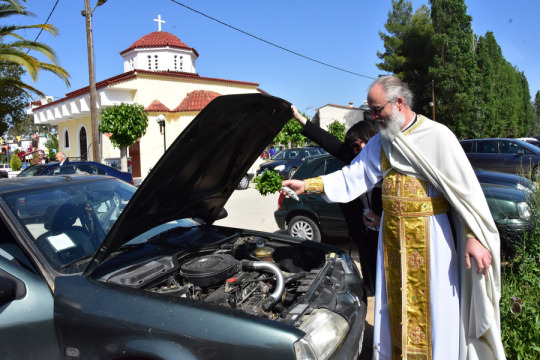

Also, it’s not a very safe practice but a lot of people hand crosses and icons from their front mirror.
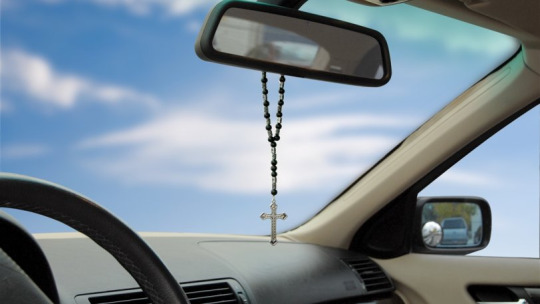

Notice that the #mati is also there!
36 notes
·
View notes
Text
HOMILY for the 7th Sunday of Easter (B)
Acts 1:15-17. 20-26; Ps 102; 1 Jn 4:11-16; John 17:11-19
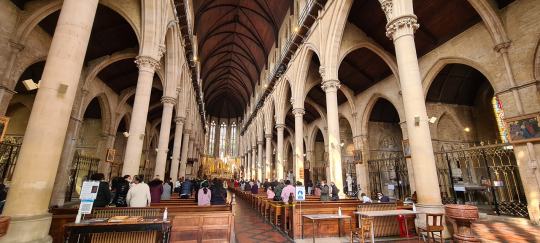
Today, Jesus is praying for us his friends: “Consecrate them”, he prays, that is to say, sanctify them, or “make them holy in the truth”. But what does this mean? There’s a tendency to think of holiness – if we think of it at all – as essentially an individual endeavour; we strive for it as a personal life-long project, albeit with God’s help. But in today’s Gospel, Jesus prays to the Father for “them”, meaning his apostles, who stand for the entire Church; for all his disciples and friends. So, he is also praying for you and me – for us, as members of his Church, present here in this parish, inside this beautiful church.
This reference to “them” is important because we don’t become saints alone but as part of a communion of saints. For holiness is not an individual project but a communal one, and for us this means the community of the parish here at St Dominic’s. This is why I have decided as parish priest that Baptisms should ordinarily take place on the 1st Sunday of every month at the 10am Mass, within the context of a parish Mass so that we as a community can support our families and their children who will be baptised. But also because there is a mutual commitment that we make to one another: that we will welcome the children and mums and dads of our parish, and help them to grow in holiness, help them to grow to know and love Jesus better. And our parents, therefore, make a commitment to us as a community: that they will bring their children up in the Faith, which means, as a minimum bringing their children to Mass every Sunday.
So, as a parish and as Christ’s disciples here in Haverstock Hill, we are bound to one another, with all our various weaknesses and strengths, but we are bound together in love. So St John says: “We ourselves have known and put our faith in God’s love towards ourselves.” (1 Jn 4:16a) And because God loves us, so he wants to make you and me holy because God is holy, and we cannot be united with him if we are not holy, if we prefer sin, and if we do not love the way that Christ has loved us, that is to say, purely, sacrificially, without self-interest, putting others before oneself. Hence St John states: “God is love and anyone who lives in love lives in God, and God lives in him.” (1 Jn 4:16b)
My hope is that as a parish, and as we recover from this pandemic, St Dominic’s will be a place where we will learn to love one another, and indeed, really love the people who live in this area whether or not they are Catholics. We are called, as Christians, to witness to Jesus Christ who loved us so much, even while we were still sinners, that he became Man, and died for our sins, and shed his blood for us. So St John says: “since God has loved us so much, we too should love one another.” I have plans for the renewal of our parish hall and its facilities, and I hope that soon we can resume our coffee and cakes after Sunday Mass, but also that during the week we can have social events for senior citizens, after-school reading programmes for children from St Dominic’s School, meals for the homeless and hungry, and other ways to exercise love for one another. Because a Catholic Church is called to shine with beauty: not just architecturally – and I am so grateful for the beauty of this church and its restored windows, stonework, and artwork – but we are called to shine with good works. As Jesus said: “Let your light so shine before all, that they may see your good works and give glory to your Father who is in heaven.” (Mt 5:16) So, for these good works, these beautiful things I hope we can do together as a parish, I will need your help; I will need families to come and to stay, and for you all to want to shine out with us.
And what does it mean when Jesus prays that the Father will consecrate us, make us holy in the truth? In the first place, Christ himself is the Truth. So, we are made holy through our union with him through the grace of Baptism, through the grace of the Sacraments, especially through Holy Communion. This is why we need to come to Mass every Sunday because, quite simply, we need to see Jesus in the Eucharist; we need to worship and love him in the Holy Eucharist; and we need to receive Jesus in the Most Holy Eucharist. Jesus gives himself to us, at every Mass, in this precious way not for his own sake but entirely for our sake because we need him. As Jesus says in St John’s Gospel: “He who abides in me, and I in him, he it is that bears much fruit, for apart from me you can do nothing.” (Jn 15:5b) Or, as we hear in today’s Gospel, the Lord says: “I have watched over them and not one is lost except the one who chose to be lost.” (Jn 17:12)
How beautiful it is to be part of a parish, to be gathered together as a community of Christ’s friends, for it is here, within the church and bound to one another in the love of Christ that Jesus keeps watch over us. It is here that we abide in the Lord, and it is here in our parish that we can grow fruitful through good works. There is a tone of admonition in the Lord’s words: we can choose to be lost, that is to say, we can choose to stay away from the Church, to prefer other Sunday activities to Sunday Mass, and so we can choose ways that will, ultimately, lead us away from Christ. Thus Jesus says: “If a man does not abide in me, he is cast forth as a branch and withers; and the branches are gathered, thrown into the fire and burned.” (Jn 15:6)
Therefore, Jesus calls us to be mindful always to stay close to him; to go to him week after week, day after day, and so to remain in him, and this happens primarily in the context of the parish and especially through the Sunday Mass. The Bishops of England and Wales thus said recently: “The Holy Sacrifice of the Mass is the lifeblood of the Church. It requires our active participation and… our physical presence… At this moment [after the pandemic], then, we… need to restore to its rightful centrality in our lives the Sunday Mass, encouraging each [other] to take his or her place once again in the assembly of our brothers and sisters… We [need to] nurture the sense of Sunday as ‘a weekly gift from God to his people’, and something we cannot do without; to see Sunday as the soul of the week, as giving light and meaning to all the responsibilities we live out each day; to see the Sunday Eucharist as food for the unique mission with which we have been endowed.”
And finally, when Jesus prays that we will be consecrated in the truth, he is praying that we will be set apart for God. So we Christians will think differently, and behave differently, and see things in a different way from others around us. We just have to accept this. Why? Jesus is clear: “They do not belong to the world any more than I belong to the world.” (Jn 17:14) No, through Baptism, we now belong to God; he is our Father, and so we, his children, are given grace to behave and think and act like God who is Love. We are empowered by God to love. For each of us, learning to love like Christ will take a lifetime, but we can help our young ones and our families through solid catechesis. This is why I plan to renew the catechetical programme in this parish, from Baptism up to Marriage, and I am delighted to welcome Sr Lucy and Sr Carino from the Dominican Sisters of St Joseph to our parish as our new parish Sisters. They will work alongside our current catechists as well as any new volunteers who want to serve as catechists with them, and they will start in September. I am delighted, though, to welcome them here today as they’ve come specially to meet you. Truly, they are an answer to my prayers, fittingly granted in the Year of St Joseph that we’re currently celebrating.
For as your parish priest, I make my own the prayer of Our Lord, that in these various ways I have mentioned you and I will be consecrated, made holy, in the truth; that you will deepen your friendship and your walk with Jesus Christ; and that St Dominic’s will be a place where God’s love is made obvious to anybody who visits us! Please, I ask you to pray with me, and to help me in realising the Lord’s prayer for us. During these days before Pentecost, let us pray: “Come Holy Spirit, and renew the face of the earth: renew my heart, renew my life, and so renew this parish.” Amen!
4 notes
·
View notes
Note
What do you think Henry VII remembers, if anything, of his other uncle Henry VI?
This is such an interesting question and something that I myself have been wondering, so thank you for providing me with the opportunity to expand my thoughts on here 🌹
We know that Henry VII only ever saw his uncle King Henry VI once during his life, when he was 13 years old. However, I’d argue King Henry must have caused quite a great impression on him, and considering Henry Tudor was old enough at that time, also a profoundly lasting one. So far young Henry Earl of Richmond had been living as a ward of his uncle Jasper’s enemies, the Herberts. By 1470 his old guardian, William Herbert, had been executed, and then, as the Earl of Warwick changed sides and brought about Henry VI’s readeption, Henry Tudor was returned to his uncle Jasper who took him to London to meet King Henry VI. That Jasper felt like acquainting his nephew with his brother denotes a special degree of closeness and advocates for his idea of family, in my opinion.
According to André, Henry VII’s court poet and self-styled regius historiographus, on 27 October 1470 Henry VI held ‘a splendid feast with the nobles and best men of the kingdom’ to commemorate his return to the throne. As the king was washing his hands, young Richmond was brought to his presence, and according to André, ‘the king prophesied that someday the boy would undertake the governance of the kingdom and would have all things under his own power.’ Polydore Vergil, a historian that began his service under Henry VII in 1506, wrote in his Three Books that in that 1470 meeting ‘the king... is reported to have said:’
“This truly, this is he unto whom both we and our adversaries must yield and give over the dominion.”
It seems not even Vergil lends much credence to this tale as expressed by his choice of words: reported to have said. As expected, this myth has largely been viewed as Tudor propaganda and indeed the episode has been immortalised in Shakespeare’s Henry VI part III. In the play, King Henry VI meets a toddler Henry Richmond (then escorted by Somerset), calls him ‘England’s hope’, and says Richmond was ‘Likely in time to bless a regal throne’. Given that King Henry VI had his own son Prince Edward as his heir at the time, it seems unlikely he would ever have said such a thing. However, if anything remotely close to that happened, then I agree with Leanda de Lisle in saying that it must have been King Henry VI taking Henry Tudor to be his own son Edward, who thanks to his imprisonment in the Tower he had not seen for five years (and would not ever see again). It’s absurdly sad to think King Henry VI would confound his nephew with his son but arguably also not out of the realm of possibility. We don’t know if Henry Tudor saw his uncle King Henry again, but it’s also not unlikely that he, his mother and uncle Jasper stayed at court for the feast of All Hallows’ (1 November) and All Souls’ Day (2 November).
If King Henry VI ever made such prophecy, wittingly or not, then it must have greatly impacted on Henry Tudor. Henry VII believed to have been chosen by God to, against all odds, become king of England. He once wrote about ‘the crown which it has pleased God to give us with the victory over our enemy at our first field’. Henry Tudor was reported to be very pious��he made pilgrimages to the shrine of St Thomas Becket at Canterbury every Easter, as well as frequent pilgrimages to the shrine of Our Lady of Walsingham and donations to the shrine of St Vincent Ferrer in Brittany. He also founded the cult of the Breton saint St Armel in England and boosted the teachings of St Francis by his patronage of the Franciscan order. He especially favoured the Observants (the Franciscans, also known as the Greyfriars), granting them annuities for the establishment of monasteries in England and abroad. It seems he also favoured staying at religious houses when travelling or going on progress around the kingdom.
Most importantly, Henry VII held a singular devotion to the Virgin Mary and his adoption of the red rose as his personal symbol—aside from dynastic reasons—had everything to do with the religious connotations of that flower. Henry VII could have associated himself with his uncle Henry VI by adopting his antelope badge, for example, but instead, he chose the five-petal flower associated with the Virgin Mary and the Passion of Christ. The Franciscans were noted for their devotion to the Passion, and Henry VII had come in contact with the Observants during his exile in Brittany. The rose had five petals like the five wounds of Christ—St Bernard of Clairvaux once stated: “As many wounds as there are on the Saviour’s body, so many roses are there! Look at His feet and His hands; do you not see roses?”
Forgive me for still going on a tangent about it, but Henry VII’s personal devotion to the Virgin Mary and the doctrine of her Immaculate Conception is exemplified in his Book of Hours, where a miniature shows a figure representing the king kneeling at a prayer desk before a vision of the Virgin as a baby held by her mother, St Anne (or, alternatively, The Virgin and the Child Jesus). His devotion to the Virgin was also highlighted in his rebuilding of the Lady Chapel (now Henry VII’s Chapel) at Westminster Abbey which I will return to in a moment.
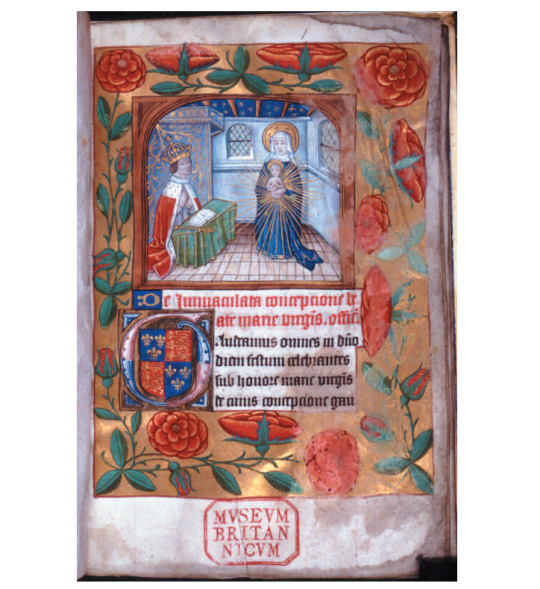
I’m not sure but I think it was Vergil who reported Henry VII as having said that religion was his ‘continual refuge’ during exile. His piety has been largely attributed to the influence of his mother Margaret Beaufort, herself also a very pious woman. But given how many years—and formative years those were—they spent apart, I imagine that Henry must have looked up to someone closer to him at the time, namely his uncle Jasper Tudor. We know that after the death of Catherine of Valois Jasper and his brother Edmund were raised by nuns at Barking Abbey, and that then at some point they joined King Henry VI’s court. According to John Blacman, Henry VI’s biographer and chaplain writing in 1485:
[…] and like pains did [Henry VI] apply in the case of his half-brothers, the Lords Jasper and Edmund, in their boyhood and youth; providing for them most strict and safe guardianship, putting them under the care of virtuous and worthy priests, both for teaching and for right living and conversation, lest the untamed practices of youth should grow rank if they lacked any to prune them.
Blacman also claimed that the king personally protected his half-brothers from sexual temptation by keeping ‘careful watch through hidden windows of his chamber’ (yes, I know). Like his uncle King Henry VI, Henry VII would also set a court that ‘maintained the highest standards of sexual behaviour’. Indeed, Retha Warnicke made an extensive compilation of scandals during the first two Tudor reigns and not a single case of sexual misconduct was found to have taken place during Henry VII’s time, marking his court as a decidedly different one than Edward IV’s had been.
Going back to Henry VI’s supposed prophecy, his words surely must have acquired a great weight in Henry Tudor’s mind by 1483 when he made his bid to the English throne. By that time King Henry VI had become a popular saint in England and even though Edward IV had tried to have him modestly—and somewhat obscurely—buried in Chertsey Abbey, Surrey, people had started to flock to his grave. A peasant claimed that Henry VI helped him when he had a bean trapped in his ear, which only popped out after he prayed to the king. Painted images of King Henry VI began showing up in churches around the country, like this one at Barton in Norfolk:

One of King Henry VI’s most ardent devotees was Henry Tudor’s mother Margaret Beaufort (Jasper’s feelings towards the cult are unknown) who had met her kinsman when she was about nine years old. When King Henry VI allegedly offered her the option of remaining married to Suffolk’s son or be remarried to his brother Edmund, Margaret says St Nicholas came to her in a dream dressed as a bishop, telling her to choose Edmund. Again, if this story is true or not, we may never know, but Margaret told that to her confessor John (bishop, then saint) Fisher—why would a famously pious woman such as Margaret Beaufort lie to her own confessor, thus committing a sin? It might be that the events took a mystical turn in Margaret’s imagination as a young girl, but that she associated divine intervention to hers and her son’s fate, and likewise to King Henry VI’s proposal, is clear.
It seems Richard III tried to control King Henry VI’s ever-growing cult by moving Henry VI’s body from Chertsey Abbey to St George’s Chapel at Windsor, a place where visitors wouldn’t have easy access to the king. Nevertheless, when Henry VII came to the throne he wholeheartedly encouraged pilgrimages to the place. Henry VII launched an official campaign to have his uncle canonised, with several petitions to popes Innocent VIII, Alexander VI and Julius II. Henry also ordered the compilation of a book of miracles worked by his uncle, and a biography of Henry VI was published in 1500 claiming that Henry VI had been ever pious and chaste during his life, towards his queen never behaving ‘unseemly ... but with all conjugal honesty and gravity’. Henry VII planned to have the body of King Henry VI re-interred at the heart of the new Lady Chapel he was planning at Westminster Abbey.
However much Henry VII enjoyed good relations with the papacy, especially Pope Innocent VIII, his campaign to have his uncle King Henry VI canonised never came into fruition. Henry VII decided for him and his wife to be buried at his new Lady Chapel instead, next to the tomb of his grandmother Queen Catherine of Valois. In his will, he stated his wish for his body to be buried:
“in the Chapell where our said graunt Dame laye buried, the which Chapell we have begoune to buylde of newe, in the honour of our blessed Lady.”
That doesn’t mean Henry VII set aside the memory of his uncle King Henry VI. He employed the same man that was overseeing the construction of the Lady Chapel at Westminster, Reginald Bray, to continue the rebuilding of St George’s Chapel at Windsor set in motion by his predecessor Edward IV (it came to be informally known as the Bray Chapel). The modest thirteenth-century chapel of Edward the Confessor was expanded into a vast cathedral-like chapel where, importantly, Henry VI’s body was placed alongside a famous relic, the fragment of the True Cross (a reliquary known as the Cross of Gneth) and the bones of John Schorne (revered for curing gout and toothache).
We may argue that Henry VII’s campaign to have King Henry VI’s canonised was fundamentally political (much like Richard II’s campaign for Edward II) as many historians have done. King Henry VI as a saint, combined with his supposed prophecy, would successfully contribute to the image of Henry VII’s reign as one chosen by God. When we put Henry VII’s religious devotion into perspective, though, his efforts to have ‘the glorious King Henry’ canonised take another dimension—in fact, there’s no doubt that in Henry VII’s eyes God had intervened in his favour. Henry VII’s will also stated his wish for an image of himself to be placed in St Edward’s chapel at Westminster, depicting him returning to God and the Virgin Mary the circlet with which he had been crowned at the Battle of Bosworth.
This is me purely speculating, but I think that even though Henry VII only came in contact with King Henry VI once in his life, his half-uncle might have exercised a great influence on him through his uncle Jasper. Jasper seemed to have been genuinely attached to his brother Henry on a personal level as well as devoted to his political cause. If Henry VI’s saintly qualities had been enough to impress Margaret Beaufort, it is very likely that they might have impressed young Henry of Richmond as well.
49 notes
·
View notes
Text
Step by step instructions to Choose Jewelry to Wear for the Holidays
When selecting jewelry and frill, it's for the most part about finding what you like. At that point, you pair the pieces with the correct rigging. Be that as it may, while picking jewelry to wear for these special seasons, things can be more convoluted.
Occasional jewelry offers wide assortments of determinations. Also, these determinations are growing constantly. You'll discover a wide range of facilitated stud and neckband sets, just as oddity pieces, for example, themed pendants and pins.
We're here to assist you with making sense of how to pick the correct occasion jewelry for your style and design sens. since we as a whole need to search useful for these special seasons!
These are a couple of tips to assist you with picking the ideal jewelry so you look astonishing during the special seasons:
1. Your Style Matters
Your ordinary design style is an immediate impression of your character. In this way, in case you're not generally a conspicuous individual, you may feel awkward strolling around in striking occasion pieces.
Rather, go with jewelry pieces you truly like. Do you commonly like wearing heaps of jewelry pieces or layered accessories? Long strands of pearls layer splendidly to make excellent accessories for these special seasons. They can likewise be utilized to make your own multilayered arm ornaments. Or on the other hand, you can go with pearl bangle armlets.
At that point, basically locate a couple of occasion pieces you can arrange with your vacation pearl jewelry. For a less difficult look, mitigate it with a couple of occasion adapted pearl studs and a straightforward occasion themed pin. Or then again, pick a straightforward accessory with a solitary pearl encompassed by occasion topic shaded diamonds.
2. The Occasion Matters
"The special seasons" carries with it various gatherings and festivities. While picking the kind of occasion jewelry to wear, think about the real event.
Because the jewelry has a Christmas topic, doesn't really make it proper for your particular occasion. For instance, in case you're setting off to a dressy office party, you might not have any desire to wear garish, pompous Christmas ornaments and fastens.
Snap Here for Multicolored Pearls
Be that as it may, in the event that it is an ostentatious undertaking, feel free to mess around with your jewelry for these special seasons. Toss on layers of red and green hued pearls and rhinestones for Christmas and New Year's, or red, white and blue shaded pearls and different diamonds for Independence Day, Labor Day and Veteran's Day. You can locate the ideal hued pearl jewelry for pretty much any occasion.
3. Toning it down would be ideal
This is a plan to remember when looking for occasion jewelry. In the event that you escape, you may end up looking like Cupid, St. Patrick himself or a Christmas tree.
Thus, consistently recall… toning it down would be ideal. Remember that occasion adornments can be extremely garish and bright. Along these lines, pick jewelry pieces for these special seasons that stick out. Be that as it may, don't pick various pieces that show up appear to be jumbled.
White pearls have a method for adding brilliance to your look, without including "to an extreme" to your look. Pick pearl jewelry that mixes in with your vacation jewelry, not overwhelms it.
4. Shading Matters
Most occasions have subject hues. Most merry individuals like to utilize these hues to show their vacation soul. Be that as it may, do whatever it takes not to go shading over the edge.
Pick one shading for your vacation jewelry that binds together your look. For Halloween, for instance, you can include numerous bits of pearl jewelry in shades of orange. For Easter, you can go with pink pearl jewelry, and for Christmas, pearl jewelry in red and green.
To add some flare to your vacation look, pick a few bits of pearl jewelry in different styles and sizes, however ensure they're a similar shading. This will give you an increasingly complex search for these special seasons. Mess around with your vacation adornments, yet don't overpower your outfit.
5. Keep Your Outfit Simple
The most ideal approach to flaunt your merry occasion jewelry pieces is by ensuring the remainder of your outfit is straightforward. For instance, possibly you need to flaunt your new Thanksgiving pin, with its bronze shading and occasion topic. Pair this up with a plain hued dress that makes the bronze stick out.
You can choose gear that features one of the bubbly hues in the occasion pin or different adornments. Or on the other hand, you can keep things basic by donning white or dark. This permits your outfit to go about as a clear canvas, which will truly feature your vacation frill or jewelry.
On the off chance that you intend to wear all dark for these special seasons, pair your outfit with white pearl jewelry. For an all-white occasion event, Black Tahitian pearl jewelry will work. Simply recollect, you can likewise include a couple of bright pearl jewelry pieces, just not very numerous hues at the same time.
Getting Her the Perfect Pearl Jewelry for the Holidays
Here in America, there's constantly an occasion drawing nearer. What's more, those merry ones are crawling up truly quick this year. Along these lines, it's a great opportunity to begin planning for the Christmas shopping season, and you have to hit the nail on the head in case you're purchasing occasion presents for the uncommon woman in your life.
Each lady has an extraordinary taste all her own. Thus, when purchasing jewelry for her for these special seasons, ensure it's what suits her, not exactly what's slanting on the jewelry showcase.
Diamonds717.com is the world's driving custom gem dealer of lab jewels. Each ring is specially made with simply the best lab precious stones. Welcome to the eventual fate of luxury. Our assortment of excellent, moral, and reasonable lab grown diamonds engagement rings are high quality in NYC utilizing the best reused valuable gold. Construct your ring and browse several exquisite lab made precious stones and gemstones.
1 note
·
View note